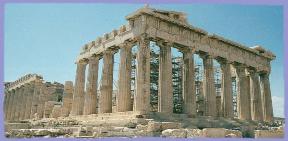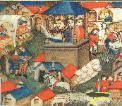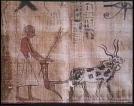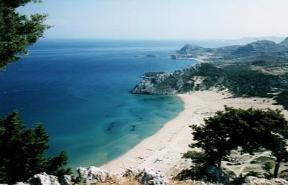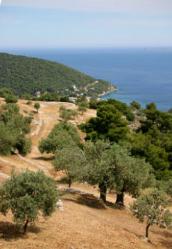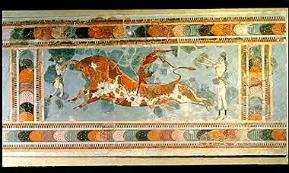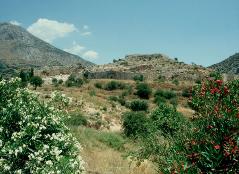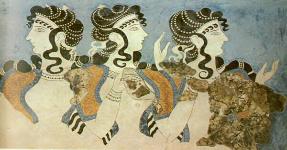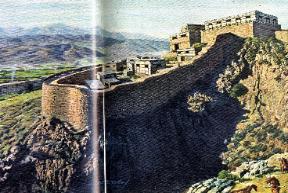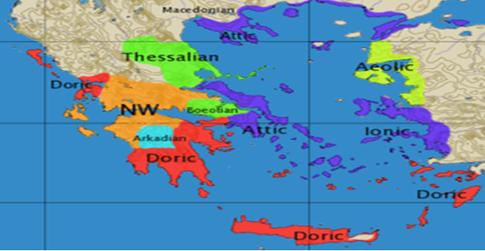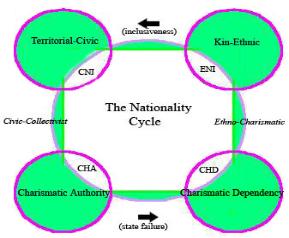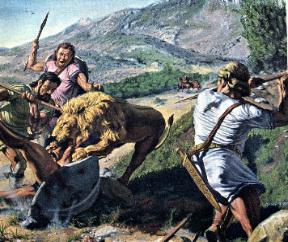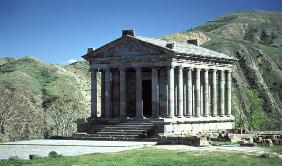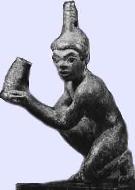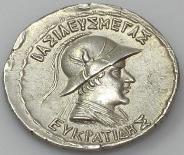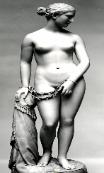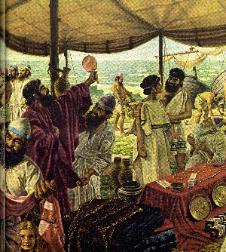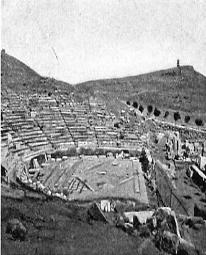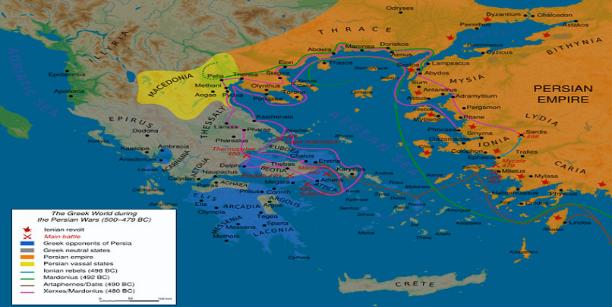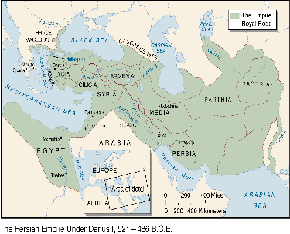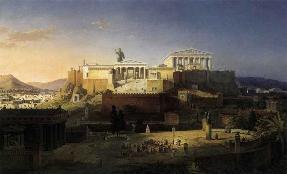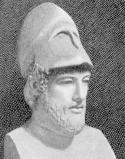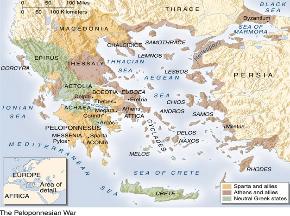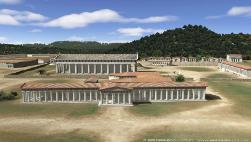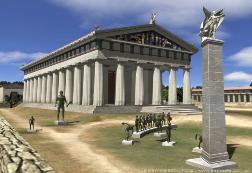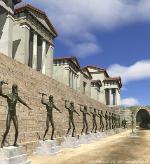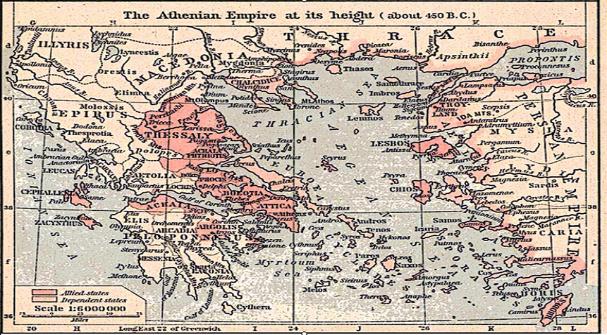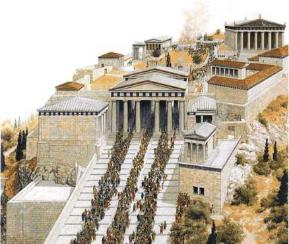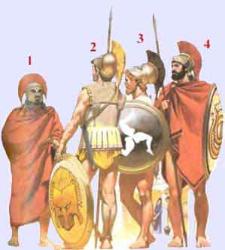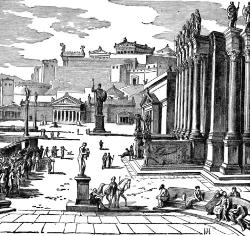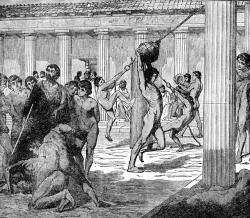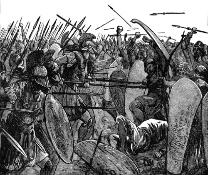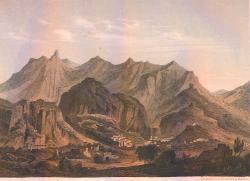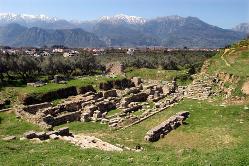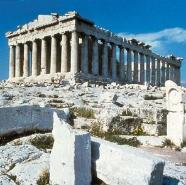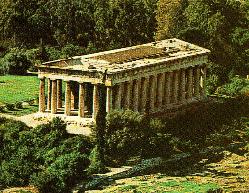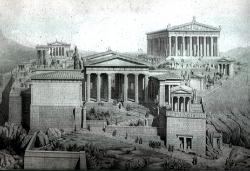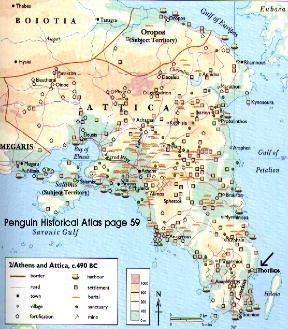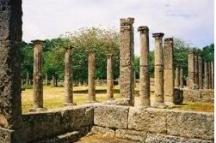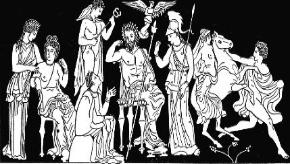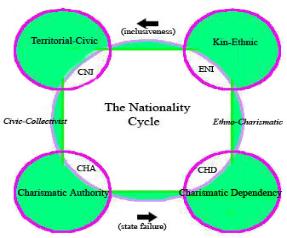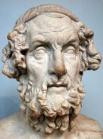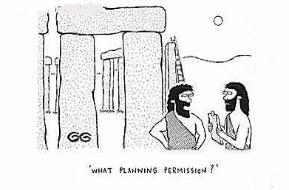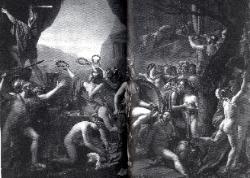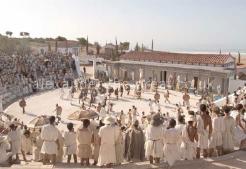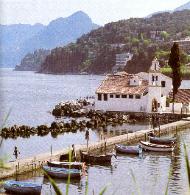' CHAPTER 5
' SINGLE AND MULTIETHNIC NATIONALITIES IN THE
' ANCIENT MEDITERRANEAN
' SECTION B
' ANCIENT GREECE
”…the ideas of economists and political philosophers, both when they are right and when they are
wrong, are more powerful than is commonly understood. Indeed the world is ruled by little else. Practical
men, who believe themselves to be quite exempt from any intellectual influences, are usually the slaves
of some defunct economist…. soon or late, it is ideas, not vested interests, which are dangerous for
good or evil”
- John Maynard Keynes, General Theory of Employment Interest and Money
"Nay, thralls are no more inclined to honest service when their masters have lost the dominion, for
Zeus, of the far-borne voice, takes away the half of a man's virtue, when the day of slavery comes upon
him."
- swineherd Eumaeus, The Odyssey, chapter 17
Geography and Ethnicity
' It is sometimes overlooked that Greece is an integral part of the greater Balkans region and
geography. Despite being outside of the (largely east-west) Balkans mountain range, Greece is a
thoroughly mountainous and hilly land, that- unlike any other Balkan country- is surrounded by water
on three sides- with a greater coastline than Spain and Portugal combined. This was rather fortuitous,
as ancient Greece had only a small handful of year-round rivers (more often like seasonal/mountain
creeks)- none of them close to navigable; and no large lakes- at least not in the summer when what
lakes there were tended to shrink into marshes. Thus ancient Greeks, like their Minoan and Myceanean
predecessors (and their Italian and Iberian successors) were often maritime people- with the requisite
outward-focus, saltiness, and sense of trade and adventure that the word still manages to evoke.
Indeed, only a few districts within Thessaly are more than 75 km. (50 miles) from the 'thousand arms'1
of the Aegean and Ionian.
' Yet dependence upon the sea is only half the story; the other (perhaps larger half) being
mountains- which cover approximately 80 percent of the land's surface. Few other countries are so
broken up with ranges, and very little land in ancient Greece was easy or flat- apart perhaps from
hilltop acropoleis- and generally less than one-fifth was arable as opposed to rocky. This was a
geography that made bureaucratic centralization quite difficult. Ancient Myceaneans and Greeks were
both mountaineers and mariners- not migrant herding societies like Perians or Hebrews, or irrigation-
dependent farmers like Mesopotamians, Egyptians, or Chinese. They settled those portions of the
country suitable for human colonization (frequently hemmed by mountains), which very often possessed
easier access to the sea than to neighboring communities- and a resultant greater threat from pirates
(who could be from anywhere) than from settled neighbors (who at least could at least be reasoned with
as speakers of the same tongue). We can see here the geographic origins of Ancient Greece’s
nationality pattern: extremely mountainous and hilly (ENI), with almost always nearby maritime
resources (CNI), and not much plains, desert, or irrigation (CHA).
' This prototypically Mediterranean aesthetic of a starkly contrasting environment- poorly soiled/dry
mountains (insularity) on one hand, and the richest of maritime/commercial environments
(cosmopolitanism) on the other- often lead to conflicting values; between those reflecting more of a
kinship-tribal heritage (the former), and those reflecting more of a relatively open civicness (the latter).
Within Hellas- as the land was generally known from Homeric up until Roman times- this heritage of the
mountains (ethnic identity) typically clashed with that of a more maritime tradition (territorial identity) for
some half millennia, ending only with the permanent defeat of both, by semi-foreign Macedonian-led
forces (more representative of charismatic authority) in the second half of the 4th century BCE.
' Taking a closer look, however, ecological historian Oliver Rackman reminds us that the ancient
Greek landscape was extremely varied, complicated even moreso by extensive populations living “only
seasonally" in “hamlets and isolated farms, grading into field-houses” (1990, 102). Michael Jameson
also notes that even when they did not have to, ancient Greeks "’preferred to live in... nucleated
settlements" and not spread out (173: cf. Snodgrass on the Greek preference for living in towns and
villages, 126)” (Dillery, 2002). Nonetheless, “That privacy, in effect being invisible to the outside world,
was the major aim of these houses is strongly suggested by the remains and is confirmed by literary
references to the impropriety or outrage of intrusion” (Jameson, 1990, 183).
' Ethne (singular ethnos) is a term that Greeks liked to apply, rather vaguely, to many of their
communities, especially in earlier periods. It is often translated as “peoples” or “tribes.” Perhaps
because of its obvious relationship to the term “ethnicity,” now in vogue in academic circles, it has
become the focal point of much academic disputation regarding ‘the’ ancient Greeks- or perhaps we
should say ‘ancient Greek-speakers’- given the diversity of cultural and political practices on the
southern Balkans peninsula during ancient times. Were ancient Greek ethne and city-states primarily
kin-ethnic or territorial-based?
' By most accounts kinship seems to have remained the fundamental basis of identity among
ancient Greeks. Even after repulsing the 5th century Persian invasion- in which they became highly
conscious of their ethnic similarities to other Greeks (ancestral, linguistic, religious and customary)- this
remained so. But intra-Greek differences were comparatively less salient from the 5th century onwards,
as non-Greeks were now famously termed “barbarians”- speakers of less developed languages. Such
pan-Hellenic ethnic ties were never sufficient, however, to bring political unification or even
consideration of it (Finley, 1975, 120 ff). Furthermore, while Greeks did develop a strong sense of
identity within their respective poleis (city-states)- seemingly a territorially based loyalty- it appears that
membership in the best known city-states (even ancient Athens for most of its history) derived from ties
of kinship rather than from those of residence (we shall consider below the extent to which citizenship
could be open to those who were not considered kin).
' The kinship traditions of the ancient Greeks, however, seem to contrast with those of the
Sumerians and the Hittites. Among those earlier peoples, although evidence is scanty, territorial ties
seem at some point in the development of city-states to have taken precedence over those of kinship,
as indeed they did among later Romans (see below). According to most authorities, kinship or even
broader ethnic ties were apparently not prerequisite for membership in the city-states in those more
cosmopolitan societies. With Greece, it is sometimes overlooked that the basic geography- both largely
mountainous yet also often littoral- facilitates both ethnic exclusivity (more to the north and west) and
maritime trade-based societies (more to the south and east). Yet only in the most extreme cosmopolitan
and trade-dependent polis- classical Athens- did kinship and ethnic factors ever appear to be eclipsed
by a more open, territorial national identity.
' Primarily Athens, but also a few other of these independent Greek city-states (poleis), would make
cardinal contributions to the evolution of western civilization. In philosophy, history, literature, political
science, psychology, art, architecture and an incredible array of other fields the Greeks- with their
vowel-empowered, alphabetic language2- put all modern societies in their debt. They even “invented”
or at least reinvented democratic government (see chapter 2 on 'democracy' among hunter-gatherers,
and chapter 4, re Sumerians). One should bear in mind also that the littoral-trading culture of many
Greek city-states extended far beyond the Greek mainland and the adjacent islands. Greek language
colonies, largely self-governing, were to be found all around the shores of the Black Sea and (less
commonly) those of the Mediterranean, from Asia Minor and North Africa, to southern Europe as far
west as France and Valencia.
' Starting with the second millennium BCE, we can see how Mycenaean society (increasingly
charismatic/authoritarian) collapsed into a several centuries of ‘dark ages’, from which the kin-ethnic
centered ethne and poleis of the Archaic era would emerge. In trade-dependent Athens (and to a
lesser extent elsewhere in Attican-dialect areas the southeast and Ionian), a territorial basis for
nationality seems to have developed by the 5th century, but was apparently controversial at the time
and is still a matter of some dispute among scholars today. Further north and west, however, in areas
of Doric dialect where rainfall was more plentiful and trade less developed, it appears that no such
infringement upon the ancient norms of kinship and ethnicity based societies ever prevailed.
Minoans & Mycenaeans
' As noted with the Hittites above (and in the preceding chapter), the 'Greek' Dark Ages (c.1200-
800) dissolution was a force to be reckoned with throughout the Eastern Mediterranean. It appears to
have first gained momentum with the collapse of the Mycenaean civilization of the Greek peninsula-
unfetering repeated waves of (often well-armed) migrants from an ever-larger range of areas, until a
number of the old empires of the Early Ancient Era (c.5000-800) stood no more. Surely environmental
and population pressures were a primary cause of the hitherto unsurpassed civilizational disaster-
which appears (it is often overlooked) to have been the first great force for division between the cultural
concepts of ‘Europe’ and ‘Asia’. In the former (Eastern Mediterranean region), most communities were
forced to regroup (literally ‘re-form’) and learn lessons from the inescapable failures of late Bronze Age
civilizations. In the latter (Near Eastern region) however, Bronze Age civilizations- and moreover their
foundational assumptions- would live on for at least another half-millennium, until physical conquest by
the alphabetic and intellectually empowered, newly united 'Greek'3 forces of the 4th century BCE. Up
until c.500 BCE no such gulf between 'East' and 'West' existed. Europe was merely a Homeric term for a
mythological queen of Crete. By the Persian Wars and the 5th century BCE, however, the Aegean Sea
had transformed- in the minds of thinking men at least- from presumably just another body of water in
the Dark Ages to a most profound cultural barrier. How this happened is of course primarily due to a
remarkable series of transformations in the group identity of the inhabitants of the Greek peninsula,
over the thousand (not always well documented) years from the mid-2nd, to mid-1st millenniums BCE.
' On the island of Crete, an ancient seafaring and perhaps matrilineal4 society- the Minoan
civilization (c.3000-1450 BCE)- appears to have thrived in the relative peace of a large, politically
unified island. As historian Richard Hooker has remarked, “None of the earliest great cultures of the
ancient world were seafaring cultures, so Crete was spared the great power struggles that shook small
states like Judah and Israel” (Hooker, 1996b). Their hieroglyphic script, Linear A, is still undeciphered,
but we can determine that it was merely a commercial writing system, perhaps inspired by Egypt.
Despite the dearth of scholarship on Minoan civilization in recent decades, we no longer must rely
entirely upon unknown script, interpreting temple art frescoes, and tertiary Greek accounts many
centuries removed from the 2nd millennium. Minoan culture throughout its “Early” era (c.2700-2000)
varied greatly, but had “coalesced” by the turn of the millennium; and in the ensuing “Middle” era (c.
2000-1580) “skyrocketed” to a number of remarkable achievements (Starr, 1991, 37). Minoan religion
is thought by many to have been largely animist (Herva, 2006), and dominated by goddesses and
priestesses as opposed to priests (Castleden, 175), in line with the matrilineal theory. Regardless of
whether Minos was more like Plato’s Atlantis, or Darwin’s Galapagos, this relatively affluent, leisurely,
and sports-addicted society seems to have enjoyed a remarkable social equality, and apparently did
not have to bother with defensive works on the scale of contemporary Asian or Mycenaean states-
although they did have a considerable navy (Hooker, 1996).
' All this began to change by at least sometime in the latter 17th century, with the catastrophic
eruption of Mt. Thera on neighboring Santorini island (see chapter 4). The unfolding series of disasters
included preceding earthquakes that “probably leveled Knossos” (the capital)- as well as long-term
after effects of lost trade, crop failures, and famine (Hooker). Exactly how long it was after Thera that
the Mycaeneans- hitherto “tribal clans living on the Greek mainland”- mustered an invasion of Minos is
unknown at this time. It is clear, however, that “the Myceneans control the show after 1500” BCE, due to
the prevalence of the new Linear B writing script- a Mycaenean (Indo-European language) adaptation
of the Minoan’s Linear A (Hooker, 1996). The Myceneans went on to completely conquer the island
around 1420. Minoans, however, continued in their “purely aesthetic purpose for art: ‘art for art's sake.’
… no trivial matter in the development of Western culture”, given later maritime Greeks’ renown affinity
for theory and abstract philosophical tastes (Hooker, 1996c).
' This ensuing Mycenaean civilization (c.1600-c1200 BCE), based in the Peloponnese and the
south of the Greek peninsula, spoke a language that might be called proto-Greek; but its character
may have been as much Near Eastern as Greek (Osborne, 1996, 2). Although the Mycenaeans may
have had more of a kinship identity in earlier centuries, by the time of Crete's conquest they appear to
have had a more charismatic-authoritarian social structure, typical of Bronze Age nascent empires. The
war-like Mycenaeans adapted much from the non-Indo-European Minoans, but always had a more
monarchial political society, in which warlord “kings accumulated vast wealth” (Hooker, 1996d)- not
unlike the classic “patrimonial regimes” Richard Pipes traced back to the post-Alexander Hellenistic
states more than a millennia later (see chapter 3)- where the ruler and a small cohort “controlled all or
nearly all the productive wealth” (1995, 23). Also around the mid-millennium, Mycenaeans began to
bury their rulers in tholos tombs- from the Greek word for ‘dome’ or ‘vault’- complete with “exceptionally
lavish burial goods” (Sansone, 2004, 12). These “statement[s] of overwhelming power and
magnificence… represent the largest space enclosed by a single span” prior to the Romans’ Pantheon.
Indeed, “the competitive, almost obsessive, display of wealth in the form of material goods…” is one of
the most clearly visible features of Mycenaean society (12).
' The specific causes of the Mycenaean collapse and Greek Dark Ages is still a matter of
controversy, but some factors are beyond doubt. First of all, since Plato’s time, has been the theory of
environmental degradation- from both population growth (deforestation) and over-grazing goats-
damage from both of which would be nearly impossible to reverse in a relatively fragile, semi-arid
climate. Perhaps no government or society, no matter how edified, could have done more than slow the
onslaught of such environmental dynamics5, but Mycenaean identity tended to congregate more
towards the other extreme. They constructed massive walls in the final decades of the 13th century-
whether to guard against Dorians, rebellious commoners, or some combination of both is not clear.
Soviet historian Y.V. Andreyev also pointed out that the “rapid disintegration of the major Mycenaean
states” can be explained “not so much by the onslaught of the northern barbarians as by the instability
of their internal structure, which was based… on the systematic exploitation and subjugation of the
working inhabitants by a small palace elite. A single blow was sufficient to destroy the ruling group…
like a house of cards” (1991, 326-27).
' Apparently a number of the invading/migrating groups chose not to stay in the conquered (and
ecologically devastated) territory, and returned northwards. Only the smaller groups that decided to
stay on- or had actually arrived after most of the battles and fires- came to be called Dorians6 (327). By
Archaic times (what has been called) the West Greek or Doric dialect had come to predominate in the
western half of the peninsula and Crete. Whereas “the surviving Mycenaeans of the Peloponnesus and
middle and northern Greece… now called the Ionians and Aeolians”, began a mass emigration (in
addition to that of the Sea Peoples) “toward the east, into Asia Minor and nearby islands” (Andreyev,
327). David Sansone concurs that “perhaps even whole communities changed their place of residence,
moving generally eastwards, across the Aegean Sea to the west coast of Asia Minor and Cyprus. It was
presumably during this time that the distribution of Greek dialects that we find in the Archaic and
Classical Periods took place” (2004, 23).
Figure 5:1 Greek Dialect Groups, c.400 BCE (based on Sansone, 2004):
1. Attic-Ionic (Eastern) 2. West Greek/Doric (West; South)
3. Aeolic/Thessalian/Boeolian (Eastern) 4. Arcado-Cyprian (Western)
(wiki)
Figure 5:2 Ages of Ancient Greece
' era start end nationality notes
Early Anc. c.5000 c.800 CHA/CHD kingship norm (Indo-European invasion c.2000 BCE)
Minoan c.3000 c.1450 ? probably matrilineal (non-IndoEuropean/non-gendered language7)
Mycenaen c.1600 c.1200 CHA-to-CHD transition (environmental/state collapse)
Dark Age c.1200 c.800 ? diverse; predominantly kin/ethnic-based groups (see note 6)
Archaic c.800 c.479 ENI (Western/Doric); ENI-to-Ethno-Civic (Athens polis)
Classic 479 323 Post-Persian ‘Hellenism’ ENI; Athens (east) blocked by Sparta (west)
Hellenic 323 146 Economic decline; reassertion of CHA
Roman 146 BCE 330 AD CHA-CHD imperial rule; imposed on ethnic-identity (ENI) society
Dark Age to Archaic
“It is man’s responsibility for the well-being of his community…upon which political thought focuses its
attention from the very beginning…that, I think, sets Greek political thought apart from any
predecessors or parallels that may have existed in other civilizations, whether earlier or contemporary;
that makes it truly political thought”
- Kurt Raaflaub, 2003 (34).
' One can see in hindsight how the charismatic authority (CHA) ideology of the Mycenaeans
contributed to excessive exploitation, the demise of state/community structures, and an eventual state
of anarchy or charismatic dependency (CHD), which was only resolved- not from the revival of an
imperial state itself (more CHA), but by the breaking up of the Mycenaean world into smaller ‘ethnic’8
components. Re-formed state structures would of course eventually reappear, in the nascent ethne
and poleis9 of Archaic (c.800-479) Greece.
' From the ashes of the post-Mycenaean Dark/Homeric/Herioc Age grew the characteristic social
structures that we often take for granted as the foundations of classic Greek civilization today. Many of
these ancient ethne (tribes, or pre-polis Greeks), after permanently settling down, would develop into
poleis (city states) during the Archaic era- implying a socio-political transition from mobility to
permanent territorial settlement. Some of these poleis would in turn develop into territorial democracies
(and even, in the case of wealthy Athens, proto-civic states), mostly during the early Classic period…
before succumbing (once again) to forces representing a more charismatic-authoritarian ideal in the
Hellenistic and Roman periods. This is of course only a crude outline of nearly half a millennia in which
there were many exceptions, but it is widely understood by authorities that- after the large migrations of
the ‘Dark Age’ period (and earlier)- ancient Greek ethnic groups distinguished themselves with
categories that were more mythological and abstract than concrete (Hall, 1997; 2006). This is not to
say that the ethnic groups of Archaic Greece were any less cogent than those of modernity. On the
contrary, the ethnic consciousness was “already in place by the time the earliest texts appear in the 8th
' and 7th centuries, and it is not unfeasible that ethnic demarcations had become particularly sharp throughout
' the 8th century as a result of the processes of ‘social closure’ which forged a new definition of the community
' of politai, or ‘citizens’. It is difficult to know precisely what the mechanisms were by which individuals or families
' might be included in, or excluded from, the embryonic polis, but we can be fairly certain that the recitation of
' ethnic myths, invoking claims and counterclaims to territory and ancestral rights, must have played some part
' in… citizen status” (Hall, 1997, 65).
' Historian Kostas Vlassopoulos, in a review of Hall (2006), points out that Dark Age, or Homeric,
society is often portrayed as being divided between leaders and followers. The leaders, however, were
“not highly ranked between themselves, since Homeric basileis [italics added] are not so much kings,
but approximate more to 'big men', figures that base their position on achievement rather than inherited
status… it seems that Homeric society” knew “no well-defined aristocracy” (Vlassopoulos, 2007). Their
absence could be a vestige of the 12th and 11th centuries’ migrations and tribalism. Kurt Raaflaub
reminds us that, unlike the later Mycenaeans, archaic Greek society- as reflected in the writings of
Homer- was obviously “not dominated by a sacred kingship. Unlike the situation in earlier Near
' Eastern societies, obedience and subordination were not the principal virtues. Greek religions did not
' demand the passive acceptance of an absolute divine will. Authority was not unassailable…. after the turmoils
' of the Dark Ages Greek society was split into small and often topographically confined units in which the polis
' gradually [emerged]… There did not exist any large and centralized… states because, it seems, the formation
' of such states was required neither by major external threat nor by economic necessities. For centuries the
' Aegean World was pretty much left to itself. Wars mostly consisted of neighborhood conflicts that rarely
' threatened the existence of the community. The tribal kingship… was weak... a primus inter pares whose
' position was based on his personal resources and qualities… [and] vulnerable to criticism like everyone else.
' Eventually kingship proved unneccessary [sic] altogether and disappeared in most places’ (Raaflaub, 2003, 35).
' This relatively egalitarian state of affairs that ‘Homer'10 wrote of may have been lacking in overt
ethnicity as well as divine kingship. Historian Margaret Miller reminds us that “in the aristocratic world of
Homer, there is neither an indication of ethnic difference between Trojans and Achaeans, nor even
much a sense of common ethnicity among Achaeans” (Miller, 2002, 2). But by the pivotal 8th century,
when “massive social change all across central Greece… produced a conception of the state as a
' community of ‘middling’ citizens. Not everyone liked this. Those who did not argued that authority lay outside
' these middling communities, in an inter polis aristocracy that had privileged links to the gods, the heroes, and
' the East. Much of the social history of the archaic period is best understood as a conflict between these two
' conceptions of social order” (Morris, 2003, 46).
' At least in the earlier eras of poleis, emerging aristocracies often failed in efforts to exclude the
non-elite, because “only a relatively small gap separated them from the broad ‘middle’ class of
' independent farmers… ‘semi-aristocrats’ [who] played an increasingly indispensable role in the hoplite
' army and assembly… The nobility therefore depended on that large landowning middle class11, had to
' recognize and increasingly respect their sentiments and were in turn open to criticism… and in those small,
' open communities, in which everybody knew everybody, reasons for criticism were easily found. Furthermore,
' because of the lack of massive external pressure and the relatively harmless nature of war12 there was no
' need of a strong, disciplined, and cohesive class of leaders. Typically, the aristocracy soon sought to prove its
' excellence in an alternative area, that of sports” (Raaflaub, 35).
' Hall argues that the later Archaic Period, however, reveals “a shift to more stratified and ranked
societies”…. as “a well-defined aristocracy emerged… during the 7th and 6th centuries (Vlassopoulos,
2007). However, regions that were traditionally designated as ethne (from the word used for flocks of
birds or other animals) generally developed polis communities “rather later than” (the more sea-faring)
areas of Mycenaean background, such as Attica, Corinthia, the Argolid, and the Aegean islands (Hall,
2006, 89)- apparently in preference for temples (Vlassopoulos, 2007). In addition to this east-west
(sea/trade-farm/agricultural) cleft, it is still sometimes overlooked that the free citizenry of ancient
Greece- not just the aristocracy- was based in large part on the growth of slavery, which appears
broadly concurrent with the rise of coinage and a distinct nobility. Indeed, by “Classical times the
possession of at least one slave was regarded as a necessity”; and the majority of “well-to-do
Athenians probably owned two to three…whereas the wealthy possessed ten and twenty” (Garland,
1998, 70).
' Of course slaves were endemic to all ancient civilizations- especially those empires with the
resources to capture foreigners- and Persia generally had more slaves than ancient Greece. After the
widespread introduction of silver coinage to Greek poleis in the 6th century, however, slavery “greatly
increased” alongside trade and economic growth (Wilson, 2006, 174; 664). Permanent slaving centers
were set up on the northern and eastern frontiers, and chattel slavery was established as a social and
(mostly uniform) legal institution “from the 5th century onwards” (664)- usually justified on the notion
that “barbarians were slaves by nature because they had no political institutions for free and equal
citizens… the monarchies in which they often lived were themselves a kind of slavery” (665). This
“thesis of barbarian inferiority and a legitimate claim of dominion over them is found [also] in Aristotle
(who reportedly advised Alexander the Great to treat barbarians like animals and plants)” (665).
' Slaves, as a form of personal property (and at times conspicuous consumption), were status
symbols in ancient Greece and estimates of their prevalence vary widely. It is probably safe to conclude
that somewhere between 25-50 percent of the total population of Attica was enslaved sometime in the
mid-1st millennium BCE (Wilson, 665)- most of them women, bound to personal households. If Athens is
representative, resident aliens or metics- whether Greek speaking or foreign- generally did not become
citizens and did not enjoy civil rights as such- despite many of them having “lived in Athens for several
generations” (DeBlois, 1997, 90). Neither did women who shared kinship ties with their citizen fathers.
Nor of course did the numerous slaves- even when emancipated (to metic status). Slaves- who by some
estimates comprised a majority in many Greek poleis by the classical and Hellenic eras- were usually
either ‘barbarians’ captured in war, or fellow Greeks who suffered the same fate in the frequent wars
pitting Greek states against each other. In some areas, and particularly the Archaic period, those in
debt- whether Greek or not- might also have been enslaved (Finley, 1981, 97 ff); although this practice
varied and was banned in 6th century13 Athens- whereupon the ratio of foreign slaves (and thus
foreigners in society) increased (DeBlois, 90).
' Also increasing significantly was the overall population- particularly in urban areas. The “general
pattern” of Ancient Greek demography began with “a sparsely populated landscape in the 11th and
10th centuries…followed by a substantial increase in most areas from the 9th century…culminating in
the period from the 5th to the 3rd centuries… and declining in the last two centuries BC and during the
Roman empire” (Wilson, 214). The (largely unplanned) growth of Greek colonies in foreign lands
occurred mostly from the 8th to 6th centuries; whereupon “the suitable sites around the Aegean Sea
were all occupied… [and cities] began to grow, and to produce goods, with the help of captured slaves,
partly in order to pay exports for the corn they now had to import” (214). High fertility rates14 were
justified by high infant mortality and enabled by early marriage for young women- the mid-to-late teens
(214). According to Mogens Hansen, the overall population or Archaic Greece could have increased
more than 10-fold between the 8th and 4th centuries, peaking at 8-10 million15 around the time of
Alexander (Hansen, 2006).
' Perhaps Greece was not the first ancient society to experience rapid population, trade, economic
growth, and urbanization, but it may well have been the first (c.500 BCE) to undergo a political
transformation not unlike those of affluent early modern and 19th century European societies. Historian
Aviel Roshwald asks, “by what immutable law was it determined that the geographic and demographic
' scope of national identity must be congruent with an objectively determined set of linguistic or cultural
' boundaries?.... Athenians, Spartans, and Thebans are held to have had no meaningful national identities
' merely because their primary loyalties were focused on their individual city-states… This is a striking example
' of anachronistic thinking…. Although... pan-Hellenic sentiment did come to play an important role in ancient
' Greek identity, it is a teleological distortion to project the nineteenth-century national-unification model onto,
' say, fifth-century BCE Athens… or [to claim] that in the absence of a united Greece there was no framework for
' nationalism in the Hellenic world” (2006, 22-23).
' Indeed, there is plentiful evidence that a substantial percentage of Athenians and residents of
other poleis (and perhaps even Sumerian city-states, for which documentation is sparser; see ch. 4)
considered themselves members of an 'imagined community', in which they could place their utmost
loyalty or service. Although many poleis were small enough for all citizens to know each other
personally, from the 6th-4th centuries, “there was at least one polis- Athens- whose population clearly
' was too large for personal ties to serve as its primary source of affective cohesion. What filled the gap was
' a quality of public sentiment that provides a remarkably vivid example of national identity as an active political
' force in the ancient world.… The political history of sixth and fifth-century BCE Athens was dominated by a
' process of development and transformation that bears striking resemblance to what is referred to in the
' contemporary world as the construction of national identity and a state- and elite-let process of national
' integration” (Roshwald, 23).
' The communication technology most responsible for enabling this transformation was the
remarkable Greek alphabet, which, as far back as the 9th or 8th century, was the world’s first known
language to employ a separate symbol for each vowel and consonant. This invention helped to
democratize Greek society in a number of different ways. In addition to facilitating the translation of
foreign languages, “Little children could acquire the Greek alphabet when they were very young…. it
was easy for everyone to learn… [as well as] internationalizing… [an] achievement in abstractly
analyzing the elusive world of sound into visual equivalents” (Ong, 2002, 89). Moreover, as the
centuries wore on, this “transformation of the word from sound to sight gave ancient Greek culture its
intellectual ascendancy over other ancient cultures…. Kerckhove (1981) has suggested that, more
than other writing systems, the completely phonetic alphabet favors left hemisphere activity in the brain,
and thus on neurophysiological grounds fosters abstract, analytic thought” (89). And the “phonetic
alphabet invented by ancient Semites and perfected by ancient Greeks” was- and still is- “by far the
most adaptable of all writing systems in reducing sound to visible form” (Ong, 90).
' Ancient Greek writing- perhaps from Homeric times- had committed to script the general
substance of heroic tales that had been passed down orally for generations, in order to jog the memory
of those who publicly recounted such exploits…. and often served (by archaic and classic times at
least) as a way for thinkers to jot down rough outlines of their ideas as aids in giving lectures-
extemporaneous speaking. Informal writing and graffiti “appears on numerous artifacts from Athens
dating from 700” (Bower, 1993, 5). Moreover, archaic era “aristocrats commissioned inscriptions on
their tombstones and on special… vases; they read the latter at drinking parties known as symposia. A
fairly wide literate audience must have existed,” at least in Athens. “Still, no more than one in five
Athenians learned to read and write, a proportion that probably was not exceeded in any other ancient
society with access to an alphabet”- such as nearby Crete, where writing was still primarily restricted to
a scribal class, essentially “law codes and provisions” (Bower, 1993).
Perhaps one can see clearer now the radically expanding society- demographically, economically, and
intellectually- that was 6th century Attica. Part of archon Solon's reforms of 594-93 (in addition to
banning debt slavery) enfranchised landless citizens to vote in the Assembly, while asserting the
principle that no individual or group of individuals should be above the law (Hansen, 1994, 14-16).
Apparently not all men concurred with the new ideal, and a period of aristocratic feuding and pursuant
tyranny ensued from the 550s to the expulsion of Hippias in 510. When the dust had settled, the
isonomia (equality of political rights) reforms of Cleisthenes followed, establishing a Council of 500-
chosen yearly by lot from the entire citizenry- “to act as a steering committee for [the] Assembly.
Citizenship was now based on residence, through inscription on register of a local deme (village, ward)”
(14-16). As Roshwald explains, Cleisthenes’ capstone constitutional reforms of 508 “combined the
' democratization of political institutions with the introduction of new socio-political structures that served to
' marginalize the political influence of old… clan-based groupings by creating alongside them new [so-called]
' “tribes,” each of which comprised members from urban, seaside, and rural districts… These new “tribal”
' divisions served as the basis for the distribution of seats on the Council, the allocation of various public offices,
' and the structuring of communal institutions… traditional kinship structures were marginalized and/or replaced
' by public associations that employed the imagery and rituals of kinship to link individuals and their families
' both psychologically and functionally to Athenian civil society as a whole” (Roshwald, 23-24).
' It seems reasonable to conclude that a number of Greek poleis were on the cusp of (ethnically
defined) national identity at the close of the Archaic Age (800-479). But the largest and most
prosperous- Athens (actually growing into a conglomerate of poleis)- appears to have been based- at
least in the half century between Cleisthenes and Pericles’ citizenship law- as much on territory and
residence as on ethnicity. Edward Cohen reminds us that the Athenian state, despite its prideful
autochthony, “did not restrict immigration, and newcomers (free and slave) came to outnumber the
early inhabitants and their descendants”, as Athenians “were actually quite liberal in accepting new
citizens” (2000, 4-5). Indeed, “the achievements of Athens were to a considerable extent the
accomplishment of outsiders” (5). Athens was, of course, more often the exception rather than the rule,
and would eventually grow, by the 4th century BCE, “larger in area and population than a number of
modern nations”; it was “unique in the Greek heartland… [as] few other large Hellenic political
groupings encompassed many individual poleis”16 (Cohen, 12-13). (more on Athens in the Classic Age,
below)
Persian and Peloponnesian Wars
According to George Forrest, the “Persians may not have had any immediate ambition to occupy
Greece” (2001, 35), but the Greek states were all (typically) divided and acrimonious, with “no
unanimous view” on what to do about the threat (37). But Persians “believed in tighter control” (35),
and as early as 499 some Ionian cities and Aeolian states “disposed of their tyrants and began open
revolt against the Persians. Sparta refused to help. Athens chose-hesitantly, but with irrevocable
results- to support the rebels…[and thus] was to be punished” (Forrest, 37). Yet “miraculously, the
Athenians won” at Marathon in 490, demonstrating the military superiority of hoplites against less
disciplined troops, and sparking much propaganda (38)- and perhaps the popularization of the term
‘barbarian’, which was only rarely used earlier (Hall, 2002, 175-76). One should bear in mind that c.500,
Athenians were first “slowly growing to appreciate the ‘democratic’17 constitution that Cleisthenes had
invented”, although by “480 the army was still commanded and the city administered by the old ruling
class, but its absolute control over Athenian minds was beginning- we stress ‘beginning’- to be blunted”
(Forrest, 37-38).
' Aristotle illustrated the “political confidence” that Marathon provided by noting “the fact that in the
decade after Marathon the Athenians first made use of a curious institution, ostracism, another
Cleisthenic invention, which allowed the assembly to decide every year to send, should it wish, one of
its political figures into temporary ten-year exile without loss of property” (39). This new concept would
prove of use in 481-480, when the Persians sent an even more massive army to subdue the Greek
mainland, under king Xerxes. According to Herodutus, after the Persians’ encampment in Macedonia
“and the voluntary submission of the Thessalians… the Lokrians and Boiotians, he tells us that the
Greeks who decided to confront the Persian advance swore an oath to the effect that ‘once affairs had
been settled satisfactorily, those Hellenes [italics added] who had delivered themselves to the Persian
under no compulsion should pay a tithe to the god in Delphi’” (Hall, 2002, 173). Councilors “’of Hellas,
chosen from the cities that were better minded towards Hellas’…. swore an oath against those Greek
states who took the side of Xerxes” (174). This was clearly a decisive moment in the evolution of a
broader Hellene national consciousness- regardless of (the still contended issue of) whether “the entire
resistance effort was in fact a Spartan-led operation…[in which] Herodotus, partly for…sentiments and
partly to please his Athenian hosts, sought to give the deliberations a more Panhellenic tone…” (175).
It is difficult not to concur with Simon Hornblower’s assertion that “’Persia gave the Greeks their identity,
or the means for recognizing it’” (Hall, 175).
' In subsequent decades the newly defined non-Hellene ‘other’ was characterized by a “lack of the
typically Greek quality of sophrosyne (‘moderation’)…in their excessive servility to their superiors…
[and] their incapacity to refrain from emotional outbursts”; while Aiskhylos’ play (the) Persians would
prove “tremendously influential in subsequent ethnocentric discourse- namely the dichotomy between
the free Hellene and the slavish oriental (Hall, 2002, 177). Indeed, “the figure of the barbarian assumes
an increasingly preeminent role throughout the fifth century…. myth could not provide enough
barbarian figures to satisfy the Greeks’ fascination with the alien ‘other’, even after ‘orientalizing’
erstwhile non-Greek figures…such as the Trojans” (177). This new interest in ethnic stereotyping
among artists helped define Hellenicity oppositionally, through differential comparison with a
(homogenized) barbarian outgroup (179).
' Even if Athens had indeed taken the lead in propagating this “self-conscious and xenophobic”
(Purcell, 1990, 58) movement away from the mobile Mediterranean milieu, it was increasingly resented
by (the more traditionally ethnicist; see below) Sparta. In 478, Sparta had ceded leadership in the
Persian campaign to Athens, which formed the Delian League in 477 as a means of consolidating its
power areas of the Aegean where the (now receding) Persians had dominated. By 454, however, the
League’s treasury at Delos island was moved to Athens- signaling in many ways a transition to empire-
as former alliance partners were now essentially paying tribute directly to Athens (which was in turn
used to fund Pericles’ generous public works campaigns, such as the Acropolis and Parthenon).
' After the ostracism of the pro-Spartan archon Cimon in 461, his successor Pericles (r.461–429)
sensed a “growing Spartan anxiety at the growth of Athenian power”, and (according to Plutarch)
invited all Hellenes to something like a great first national assembly (to be held in Athens). But the plan
failed due to Spartan opposition (Hall, 2002, 206-07). The particular anecdote could have been
fictitious, but the view “that appeals to a grater Hellenic unity were never a goal in themselves but
merely ‘a tool of political propaganda serving…’” Athenian interests has always been commonplace
(207). Sparta, for cultural reasons was unwilling “to lead the Greek world herself… [and] could not bear
to see Athens do the job instead…. It is above all the phthonos felt by Sparta for Athens which
determines the course of fifth-century Greek history” (Hornblower, 2001, 145).
' Yet even after Athens had lost the Peloponnesian Wars and its Delian League empire,
Panhellenism was ultimately for (the Athenian orator) Isocrates (436–338) “little more than a front for
Athenian hegemony” (208). Hardly humbled from military defeat, the Athenocentric cultural articulation
of Hellenicity (essentially more civic; less ethnic) was perhaps even more cogent than before the civil
war. As Isocrates proclaimed: “’So far has our city left other men behind in wisdom…. that the name of
the Hellenes no longer seems to indicate an ethnic affiliation (genos) but a disposition (dianoia).
Indeed, those who are called ‘Hellenes’ are those who share our culture (paideusis) rather than a
common biological inheritance (physis)’” (209). Isocrates is not extending the definition of ‘Hellene’ “but
rather restricting its usage to those who have passed through an Athenian education… a matter of
enculturation rather than…birth- and that the self-appointed arbiter of Hellenic cultural authenticity is
Athens” (209). So it would appear that Periclean-era patronage of the arts and public life paid
handsome dividends well into the next century. Isocrates’ pupil Ephoros (400-330) also noted that “in
his own day there was a tendency to call the Athenians Hellenes and the Spartans Peloponnesians”
(Hall, 210).
' Hall concludes that although the “primary defining criterion” for “dialect traits, customs, calendars,
cults and festivals… continued throughout antiquity to be kinship. At the Hellenic level…it was a
different story” (2002, 227). Hellenic identity arose in the Olympic Games of the 6th century, when ”sub-
Hellenic units became the building blocks from which Hellenic ethnicity was constructed” (226). After the
Persian War, however, “the 5th century ascribed membership [to] the Ionian and Dorian [cultural]
groups… [serving] as rallying cries in the polarized political climate of the Peloponnesian War” (226).
The [physically] ethnic foundations of Hellenicity “imploded and retreated rapidly before more cultural
criteria” (227). In the 4th century, moreover, sub-Hellenic identities seem to have generally declined in
salience17 (226). Although a “true and equitable Panhellenism was simply not in the interests of those
states that were most able to foster its development” (228); Athenocentric notions of Hellenicty “were
not necessarily contested by non-Athenian elites” (Hall, 219)- such as Aristotle. In Politics the Thracian
famously wrote that: “’The populations in places that are cold and in areas around Europe are full of
' spirit but weaker in terms of intellect and skill…. The populations of Asia, on the other hand, are intelligent
' and skilled in matters of the mind but lack spirit which is why they end up being ruled and enslaved. But the
' genos of the Hellenes, insofar as it lives between these two places [newly defined Europe and Asia], has a
' share of both characteristics [ethnic and authoritarian], for it is spirited and intelligent, wherefore it continues
' to be free and extremely well-governed…” (Hall, 219).
The Poleis: Doric and Ionian
' Athens (and intellectual notions of Hellenicity) aside, however, most Greek poleis of the classic
era continued to rely on kinship factors as the basis of group identity. What consequences flowed from
this predominant emphasis on kinship? Ironically, one result of Sparta’s victory and Athens’ loss of
empire in the late 5th century may have well have been a weakening or retardation of the peninsula’s
overall national identity development. As Margaret Miller has noted, “a sense of hereditary kinship
through a common ancestor…[was] fundamental to early ethnic expression but is essentially gone by
the Roman Imperial period, when the Roman projections of Greek ethnicity were based largely on a
kind of nostalgia…” (Miller, 2002, 2). In order to take a closer look at how this decline took place, we
must examine the many seemingly incompatible contentions (Greek city-states were more diverse than
is often acknowledged) regarding Greek ethne and poleis; before moving on to the experience of
Hellas’ two most famous city-states, Sparta and Athens.
' Robin Osborne asserted that throughout the archaic period (c.1000-479) in many parts of
Greece, “the northern Peloponnese and central and north-western Greece in particular, the sense of
belonging to a people (ethnos) who inhabited a whole region was… stronger than the sense of
belonging to a particular community” (Osborne, 1996, 286). The areas that he mentions, of course, are
largely in the more mountainous (and to some extent more precipitous) western half Greece. Western
(Doric) Greece included: the north-south Pindus mountains ('the spine of Greece') and parallel ranges;
and the regions/states of: Epirus, Thresprotia, Dolopes, Acarnania, Aetolia, and Locris, in addition to all
of the Peloponnese states except Argolis.
' The generally less elevated and more limestone eastern (Aegean18) half of Greece, in addition to
Argolis, included: Thessaly, Perrhaebi, Magnesia, Boeotia, Phocis, Euboea, Attica, and Corinth- as well
as nearly all of the countless islands of the Aegean. The southern poleis of Sparta (Laconia) and
Athens (Attica) have been the most renown exemplars of each side, respectively. Areas to the north of
Epirus and Thessaly, due at least in part to distinctive dialects, were of ambiguous Hellenicity through
at least the archaic era. Macedonia19 in particular, was usually characterized by absolutist kingships
(CHA), as opposed to the kin-ethnic aristocracies of the West, or the unstable democracies of 5th and
4th century Attica (which were in turn not really representative of the Eastern states in general).
' In contrast to Osborne, Zosia Archibald argues- in reference to Thessaly, Macedonia, and
Thrace- that ethnos20 often meant “community as well as people, Greek and non-Greek…” (Archibald,
2000, 213-14). This should not come as a surprise given the greater diversity of peoples and trade in
these more wealthy and populous northeastern regions, often envied by others for their cavalry. She
added that “many scholars now believe that kinship links, of the type traditionally considered
fundamental to ‘clan’ or ‘tribal’ societies, were less significant than local community structures” in these
northeastern states (217). She also argued that the distinction then between polis and ethnos was not
at all clear20 (213-14); concluding, moreover, that ethnos and civic identities were often one,
approximating the modern conception of “’nation’ states”- i.e. states with ethnically homogeneous
populations (232-33) (see chapter 1). If Archibald is correct in what we construe to be her main
argument about this murky (in terms of categorization) situation, then a territorial basis of identity may
have been more prevalent among eastern Greeks (outside Athens) than most authorities have
previously recognized.
' Jeremy McInerney has identified more complicating factors. Citing several of the many studies
which show that “tribes” are much more fluid and permeable than once believed, McInerney argues that
the Greek ethnos was similarly liquid, and membership in it “negotiable.” Such groups, he argues, were
“fluid- changing territory, absorbing (to various degrees) other groups, splitting, being absorbed, dying
out, or mutating” (McInerney, 2001, 54, 59). In support of his argument relating to the Greek “tribes”, he
cites Herodotus on the Ionians. The so-called Ionian Greeks of Asia Minor (within which Herodotus’
home town was part of the Doric minority) blended irrefutably with native people of the region, but were
perceived generally as a major “tribe” of Greeks. McInerney, following Herodotus, contends that the
Ionian Greeks who invaded Asia Minor did not bring women with them, but slaughtered local males and
“married” their widows, thus assuring that offspring would in fact bear mixed ethnicity although seen
principally in the Ionian Greek identity of their fathers (p. 58). McInerney also cites the “creation” in
mainland Greece of a Phocan identity, which he says was much influenced by “the need to unite and
form larger, more powerful sociopolitical units” (63-64). These arguments, essentially that the kinship
basis of (at least eastern) Greek society was largely fictive, clearly brings into question even more
clearly than does Archibald the thesis that kinship remained always a primary basis of identity among all
Greeks. One should note, however, that the term ethnicity- being a more subjective construct- may
encompass any and all popular notions of shared kinship, however fictive or patently false.
' Catherine Morgan makes similar arguments (2001; 2003). Rejecting the once-fashionable idea
that ethnic identities are primordial, she sees them instead as involving conscious choice, albeit much
influenced by “contingent circumstances” (2001, 76). Morgan chooses to focus on several points, but
two of them are 1) “the role of place and territory,” and 2) “the role of common descent in constituting
group identity” (76). She insists further that Greeks were always “on the move”, and that consequently,
“Shifts in identity caused by the migration of all or part of a community or the arrival of newcomers
require expression(s)…” of identity (2001, 84). Nonetheless, there has always been “a wide Greek
difficulty in explaining ultimate origins...” (93). This inarticulation on the subject of historical ethnicity,
however, did not prevent the development of many communities calling themselves poleis eventually
appearing, even in regions "traditionally accepted" as multiethnic. All such communities, sooner or later
played the “ethnic card.”
' In her later book (2003), Morgan added several noteworthy points relating to the question of
whether kinship or territorial residence took precedence as the basis of identity in the Thessaly, Phocis,
E. Locris, Achaea, and Arcadia regions of archaic Greece (the first two are eastern; the latter three
central or western). She notes that an ethnos, despite its presumed lack of political organization, could
in fact wage war, impose taxes, and conduct diplomacy (9). Morgan also insists that the five states
studied do not “fit the nationalist view that ethnic boundaries should be coterminous with the political
boundaries of the state, and that it is the ethnic group, with its common culture and territory, that
defines a nation” (12). Morgan also insists that “place identities centered on specific sites [italics added]
are likely to have been an important factor from early in the Iron Age” (2003, 212) throughout the
region. She does not state overtly but leaves the implication that identity in such places derived from
the perception of interests common to those who inhabited the territory, rather than exclusively from
ties of kinship (212). Nonetheless, all of the five states went on to construct exclusive ethnicist tales of
common ancestry and decent over subsequent centuries. Where ‘common interests’ stop and ‘common
myths’ begin is not always easily determined in regards to the formation and maintenance of national
identities; but initial formations are more typically the former, with subsequent maintenance efforts all-
too-often the latter.
' Returning to the Dorian-Ionian theme, we note that Anthony Snodgrass in Archaic Greece (1980)
found that what few citizens there were in early Argos initially denied citizenship not only to perioikoi
(allies), but also to a group of residents to whom they were related. On the other hand, he indicates
that the related group may have been admitted to citizenship in the 5th century. Snodgrass also notes
that five West Greek speaking “conquest states” (including Argos, Lokris, and Crete, in addition to
Sparta) were quite prone to impose serfdom on neighboring Greeks- “indigenous peoples” for whom
differential treatment could be justified (1980, 89). In their colonies, too (usually distant from the
homeland), these Greeks were also quite likely- particularly at first- not only to deny citizenship to
indigenous people, but also to deal with them quite harshly (89-91). This was perhaps a reflection of
the “deep-rooted and lasting aristocratic tendencies in their government, often with leanings towards
militarism, too” (89). Of these ‘Dorian’ conquest states, only “in Sparta was there even the show of
internal egalitarianism among the ‘Equals’” (Snodgrass, 90).
' That Greeks based their cultural identity on a narrow conception of ethnicity- or at least usually
not on territory- finds possible reinforcement in another Hellene tradition. Greeks seem customarily to
have designated communities not by their geographical location, i.e. Sparta or Athens, but by the name
of the dominant people inhabiting the community, i.e. Lakedaemonians or Athenians. Wars were seen,
to continue the example, not as being between Athens and Sparta, but between the Athenians and the
Lakedaemonians. This tendency, revealing perhaps as much about us as it does about the ancient
Greeks, was apparently the norm throughout the Greek world (Ehrenberg, 1969, 26; Finley, 1970, 91;
Murray, 2000, 235; Oliva, 1981, 84; Eremin, 2002, 280).
(wiki/pcl)
Table 5:3 Bases of Nationality21 in 15 Greek city-states, 5th-4th centuries BCE
' city-state region dialect primary NI basis c.500-c.300 source
Athens (Attica) East-south Ionic territorial-to-proto-civic-to-CHA Herman (1994; 2004)
Megara (Attica) East-south Ionic ethnic - to- CHA van Wees (2000)
Corinth (Argolis) East-south West ethno-charismatic22 Salmon (1984)
Thebes (Boiotia) East Aeolic ethno-charis. - proto-civic - CHA Hansen (1994)
Thessaly East-north Aeollic ethno-charismatic Archibald ('00); Morgan (‘03)
Mytilene(Lesbos) East-north Aeollic ethnic - to - ethno-charismatic Spencer (2000)
Phocis (Delphi) Central-east West ethnic McInerney (2001)
Achaea(&Arcadia) South-central West (Arcado) ethnic Brock & Hodkinson (’00)
Argos (Argolis) South-central West territorial- to- ethno-charismatc Jefferey (2000)23
Sparta (Laconia) West-south West ethnic- to- ethno-charismatic Hansen (1994); Cary (1951)
Mollossis (Epirus) West-north West ethno-charis.- to- CHA Osborne 1996; Davies 2000
Cyrene (Libya) Mediterr. West CHA (to mid-5thc) Mitchell (2000)
Magna Graecia(It.) Mediterr. West mix/flexible citizenship Lomas (2000)
Lycia (Turkey) Mediterr. Luwian(n/a) CHA Keen (2000)
Macedonia24 far North Maced.(West?) CHA Archibald (2000); Carlier (2000)
' We can see from the above summary table that hereditary kingship and charismatic authority
(CHA) tended to be more prevalent in the north; whereas proto-civic democracies were capable of
forming in the richer, trade-based poleis of the east. Kinship-ethnic national identity, however, was
prevalent across all areas (and still is today in Greece), and was often uninterrupted in the western half
of Greece (West Greek dialect) during the classic age. To what extent did Athens or Sparta exemplify
this east-west (Ionic-Doric) cleavage? First, let us look at Sparta, which represents both the more
traditional and larger cultural area.
SPARTA
' Sparta- for which one etymology is “‘the city that has been sown’- contradicts the normal claims to
primordiality made by Greek cities” (Hall, 2002, 89). The Spartans can be traced back with certainty no
further than the Archaic age (several centuries subsequent to the fall of Mycenaean civilization), to
which their cherished Dorian ancestors may have contributed. Spartans quickly came to dominate the
Pelopponesian peninsula, enslaving the local Lakonian population (helots) and beginning “to view
themselves as Dorians… a strategy of exclusionary social closure” (89). The closure consisted of
strictly defining their austere, yet egalitarian, in-group, against an unlimited array of out-groups (usually
deemed equally foreign)- ethnic national identity personified.
' Laconia never applied the “stimulus of hunger to its people, so as to impel them into commercial
enterprise or political adventure, to the same extent as many other parts of Greece” (Cary, 1949, 89).
Both one of the more secluded and well-watered regions of Hellas, greater Sparta (including both
Lakonia and adjacent Messenia along the Ionian coast) was among the few areas of Greece
reasonably well suited to agriculture. It was also fortuitously endowed with iron, which had replaced
bronze as the metal of choice for tools and weapons. Yet the “…expansion of the Spartan state beyond
' the boundaries of Laconia entailed at its outset another geographic paradox. The Messianian Wars with
' which the Spartans opened their career of conquest were fought over the top of the highest mountain chain
' in Pelopponnesus, whose shortest and lowest…[pass] involves a climb through a difficult gorge to a height
' of 4,500 feet. The bait which lured them across this no-man’s land was another valley which equaled or
' surpassed that of the Eurotas, and its retention became a cardinal article of Spartan policy. But the
' maintenance of control over an ever-reluctant subject population, across a line of communication which might
' become impassable in midwinter, imposed a heavy strain upon the Spartans and obliged them to recast their
' state on a totalitarian basis” (Cary, 90-91).
' One result of this policy was the largest city-state in Greece- three times the area of Athens. But
of course to many authorities, the dominating fact of Spartan history is that the minority of “Spartiates”-
as they called full members of their community- lived for several centuries primarily upon the (slave)
labor of conquered helots. Most helots were Messenians. They vastly outnumbered Spartiates.
Authorities dispute whether helots are more properly called slaves or serfs (See Hodkinson, 2000, 116;
Luraghi, 2002, 228-231), but no one disputes that Spartan society depended upon their labor.
Spartans also relied upon the military support of intimidated allies called perioikoi (see on the above
Cartledge, 2002, passim, esp. 139; 2003, 29; Hodkinson, 2000, passim, esp. 113).
' The kinship basis of the identity that distinguished Spartiates from helots, perioikoi- and all other
Greeks- seems oddly to have received relatively little attention from leading authorities25. The attention
of observers, including modern historians, has tended instead to focus on unusual features of the
austerely egalitarian society, beyond the Spartan cloaks and long hair. There were many. Sparta’s
government decided which infants should live and which should die; it took male children from their
families at age 7 to train them to become soldiers; it made them soldiers at age 20; did not allow them
to live with their wives until age 30, requiring them instead to live and to take all their meals with fellow
soldiers. Remarkably also, Spartans left few written records. Until about the time of Sparta’s fall (after
that of the rest of Hellas) in the late 4th century, nearly all information on Spartan society came from
outsiders (Cartledge, 2003, 140, 142). Citizenship depended not only on Spartiate ancestry, but also
on financial contributions to the communal dining system for soldiers (Hodkinson, 2000, 190). Although
all landholders were nominally of equal status, aristocratic banquets “were frozen in time as the
syssition… reflecting the narrow definition of full citizen found” in Sparta (Dillery, 2002, 12-13). Adult
males did no manual labor, but subsisted on that of helots (Hodkinson, 3). All Spartiates dressed
simply. Nudity became typical in athletic contests and religious ceremonies, but no more so than in
other Greek communities (Hodkinson, 220-21); while homosexuality (like in a number of other poleis,
such as Thebes) was rampant (Hodkinson, 85, 354, 358). Ephraim David characterized Spartan society
as, among other adjectives, monotonous, conformist, obedient, hierarchical, oligarchic, totalitarian,
secret, deceptive, and xenophobic. He might have added laconic as they also valued silence very
highly (David, 1999, 135).
' And often fiercely egalitarian. No less than 13 Spartan kings were placed “on trial and
condemned” by the Spartans (Hansen, 2006); and the freedom of women was legendary (and much
disapproved of by outsiders). Spartan women could inherit land in their own right, and until the 3rd
century two-fifths of the land was in their hands (Murray, 2000, 251-52). As in Egypt, there was no
discrimination in divorce laws, and marriage ages were significantly higher than elsewhere in Hellas.
Moreover, Spartan girls often received as much public education as boys, wore less formal and shorter
dresses than their fellow Hellenes, and were generally not confined to the home (as would become the
norm throughout much of Greece and the rest of the Mediterranean). Hodkinson notes, however, that,
far from being exempt from Spartan austerity, “Spartiate women were not permitted to wear ornaments,
to let their hair grow long, or to wear gold. There were also restrictions on the use of private wealth….
In contrast to the lavish expenditure and public display involved in contemporary Athenian weddings
(Oakley & Sinos 1993), Spartiate wedding ritual was an austere secretive affair” (Hodkinson, 2003, 6).
' Stephen Hodkinson’s remarkable book Property and Wealth in Classical Sparta (2000) stresses
that Sparta’s fall was due in large measure to excessive concentration of wealth. In its last stages, he
argues, Sparta had become a plutocracy (104, 441). He identifies as one cause of this development
the common tradition of partible inheritance- that all children share in the distribution of their parents’
estate. Over time this tended to reduce the income afforded by some estates (400). He shows also that
dowries (typically limited to land), as well as carefully arranged marriages, expedited the increased
concentration of land ownership (413). Because of these circumstances, poor Spartiates were
increasingly unable to “pay the mess dues which were a requirement of citizenship” and thus lost
access to their mess groups and citizenship rights. (369). Sparta proved unable to reform this structural
fault, and its number of citizens declined from about 8000 Spartans in its heyday (c.480), to less than
1000 after its (first major) defeat at the Battle of Leuctra (c.371) (Hodkinson, 2000, 399, 441).
' Hodkinson makes scant reference to the kinship requirement for citizenship, but that too seems to
have contributed to Sparta’s downfall. Had Spartans been willing to extend full citizenship to perioikoi-
some of whom had a limited but non-voting citizenship (Mertens, 2002, 285, 287)- or even to helots,
their state might have held up. The expedience of basing citizenship on proximate territorial residence
rather than kinship seems never to have occurred to them, or at least never to have received serious
consideration (although given Spartan secrecy, one can not be sure). This would seem to testify to the
firmness of their belief in the kinship basis of identity and group membership. The Romans (see below)
were already demonstrating the practicality of a qualified territorial approach to citizenship by this time,
although it would take more than a century for this to reach the Peloponnese. Some authorities on
other areas of classical Greece seem to indicate that those states, too, like the earlier Sumerians and
Hittites, were much more practical in regards to naturalization than were the citizens of Sparta- who
were famously deeply suspicious of potential foreign influences- including gold and other luxuries.
According to W.G. Runciman, the Spartans were “quite right to fear that an influx of wealth” and/or
foreigners “would undermine the basis on which their distinctly, albeit not thoroughly, egalitarian
structure and culture were constructed.” Nonetheless, the lack of such influxes eventually accomplished
the same, as it was obvious even to the last kings in the lower 3rd century “that restoration of anything
like the Lycurgan system would require not merely a redistribution of land, but enfranchisement of the
Helots… But it was by then far too late” (Runciman, 1990, 361-62).
ATHENS
“…it is a result of their mastery of the sea that the Athenians have mixed with various peoples in
different areas and discovered a range of festive practices. In consequence, what is sweet in Sicily,
Italy, Cyprus, Egypt, Lydia, Pontus, the Peloponnese or elsewhere has all been brought together in one
place because of (the Athenians’) mastery of the sea”
- ‘The Old Oligarch’, 2.7 (Braund, 1994, 41)
“…day by day fix your eyes upon the greatness of Athens, until you become filled with the love of her….
the love of honor alone is ever young, and not riches, as some say, but honor is the delight of men
when they are old…”
- Pericles, Funeral Oration, c.490 BCE
' Because Athens has a well-deserved familiarity to most educated people in all parts of the world, it
seems superfluous to recite once again its many contributions to western civilization- which are indeed
most of those cited above for ancient Greece as a whole. Instead let us turn to questions concerning
group membership and citizenship. How did Athenians differ from Spartans in their criteria for
citizenship and naturalization?
' Kinship seems clearly what early Athenians intended to be the basic criterion for citizenship.
Nature, however, “intended Greece to be a land of trade rather than self-sufficiency” (Rackman,106).
Attica is the driest region of Greece, and its hard limestone mountains are not high enough to keep
snow beyond early spring (Cary, 1949, 75). A “’discarnate skeleton’ in the words of Plato… only one-
quarter of Attica is…cultivable…ill suited for anything save the drought-resisting olive tree…. From the
time of Solon [c.590s] the importation of foreign grain into Attica was a matter of such importance as to
require state regulation” (76). However, mineral wealth- lead and silver- “were an economic mainstay
and an indispensable basis of Athenian finance” (77). Much of this went overseas, as the Athens'
Saronic Gulf was the best natural point for trans-Aegean traffic; Athens’ “natural lines of economic and
cultural expansion were directed overseas“ (Cary, 77-78).
' A Mycenaean stronghold (or at least high ground) during much of the Dark Ages, Athens went
through several centuries of monarchy before its choice location on the Aegean thrust the polis into a
position of leadership in the rapidly growing region. In order to bring the many towns of Attica under its
rule, the aristocracy found it useful to jettison monarchy, in preference for more professional archons
and rule of law- written law by the 7th century BCE. As mentioned above, archon Solon’s reforms (594-
93)- in addition to making the basis for elected office landed wealth (as opposed to noble birth)- clearly
established the principle that Athenians would not be slaves, and slaves not Athenians (Patterson,
2006, 255)26.
' Nearly a century later, the earliest clear evidence of Athenian citizenship policy can be seen in the
508-07 reforms of Cleisthenes, who called them isonomia- ‘equality of political rights’. These
comprehensive reforms are generally credited with having established Athenian ‘democracy’ (a new
label first applied to Athens over subsequent decades)- and order. It was not until Cleisthenes had
“established the parish and district governments on a sound basis that centrifugal tendencies within
Attica were definitely overcome. But henceforth the resources of Attica were never dissipated between
rival centres… and the local animosities which distracted the politics of Thessaly and Boeotia did not
vitiate the energies of its people” (Cary, 79). Unlike those of his predecessors Drakon and Solon,
Cleisthenes’ reforms quickly proved effective, kept tyranny at bay for nearly a century, and enabled
Athens (c.500 BCE) to command “a larger man-power and more abundant natural wealth than an other
city” (79). The reforms put responsibility for determining citizenship squarely upon the demes (139 local
districts within Attica). David Whitehead, author of the standard work on The Demes of Attica, asserts
that there is no reliable information on the function of these local organizations before Cleisthenes
(1986, 12-16). As George Forrest explains, the “essence of the new system was the recognition that
small local units, country villages or townlets, wards of the city, should control their own affairs
independently of the local aristocrat. Each chose its own mayor and its council, and minded its own
business. Then, for state purposes, these ‘demes’…” were grouped into new trittyes (geographical
blocks)- ‘the Coast’, ‘the Plain’, and ‘the City’- and the so-called 10 tribes, upon which membership in
the army and Solonian council were based (2001, 32-33). Thus, “an Athenian in his village could make
use of whatever self-confidence he may have had; at the same time, at the state level, he could
develop…[a] sense of nationality which the tyranny had [already] begun to encourage” (Forrest, 33).
' Mogens Hansen (1994) seems to have implied that these reforms accomplished no less than
transforming the basis of Athenian citizenship (from ancestral pedigree- the old 4 tribes) to territorial
residency- the 10 new ‘tribes’. Whitehead cautions, however, that the Attica demes appeared at first to
be territorial divisions; but they were in fact ‘territorial’ divisions in which membership was hereditary- an
apparent concession to local tradition, as was naming each tribe after a legendary Athenian hero. As
he put it: “the hereditary nature of deme membership” had the effect that- over time- groups “based
originally on domicile gradually became groups based on descent…” On reaching maturity, legitimate
male descendants of the original members were considered qualified for admission to the forebearer’s
deme. Under the guidance of Cleisthenes, Attica had made deme membership essentially the only
determinant of citizenship (Whitehead, 1986, 97). The decisions of demes on such matters were,
however, subject to certain appeals (Whitehead, 108, 259). Adoption and naturalization were other
routes to citizenship; but both were rare (Jones, 1999, 149).
' One should recall that “the foreign population of metics and slaves at Athens was both larger and
more permanently settled than elsewhere” (Hall, 2002, 187). Moses Finley argued that ancient Greece
was a slave society, “not just a ‘society with slaves’…. the lack of political self-rule…[being seen as] a
form of slavery and the lack of self-control the mark of a slavish nature” are strong indications of
“slavery’s profound significance for the character of ancient society… ancient Athenian society in
particular”, which was distinguished by the “‘advance, hand in hand, of freedom and slavery’”
(Patterson, 2006, 155). Even after Solon’s debt-slavery ban, it is “in fact, in democratic Athens among
the poleis… that chattel slavery was most27 extensively employed, not only for purely economic reasons
but also as a means of marking the owner’s status as a free citizen. Estimates vary considerably… but it
is safe to say that slaves outnumbered adult male citizens, and perhaps… by a wide margin” (Sansone,
100-01). Vulnerability “to corporal punishment, torture, and cattle-like treatment was generally the mark
of the slave in Athenian society” (Patterson, 155-56); although they required no special garb, and were
thought not necessarily obliged “to show obeisance to free persons other than their own masters”
(Cohen, 2000, xiv).
' Patterson reminds us that during “the century and a half from Solon to Pericles, the privileges,
protections, and perquisites of citizen status28 grew (even under the tyrant Pisistratus)- along with a
resulting need for legal distinctions” between those with and without it (2006, 156). According to
Hornblower, it was primarily “the revenue” from democratic Athens’ new empire that enabled the mid-5th
century democratic reforms (and citizenship clarifications) of Ephialtes and Pericles (2001, 156).
' Strategos Ephialtes (r.463-61) and allies had begun prosecuting certain members of the
establishment’s Areopagus (high court/council of ex-archons) for maladministration, wishing to
redistribute much of the power of this oligarchy to the more democratic Council of 500 and a new
People’s Court (to be chosen by lot). For this he was assassinated, but his deputy Pericles (c.495–429)
continued the reforms, including jury and other civic/political pay. According to Aristotle, such “’appeal
to the people’… remained only potentially democratic until the introduction of jury pay” enabled
common people to participate regularly (Hornblower, 2001, 156). Jury pay proved popular, and grew to
other kinds of democratic pay, like attendance at the Council of 500, and even city festivals- all paid for
by Athens’ Delian League allies (156). Such 'radical democracy' coexisted well with individual rights
protected by the state. For example, “a citizen could not be executed without due process at law, and
' could not be subjected to torture; a magistrate could not break into a citizen's home without a warrant; and
' a citizen's [private] property was protected by a proclamation made every year by the incoming archon. Legal
' protection of individual citizens is singled out as the hallmark of democracy by Aischines [390-314], and anyone
' who had been wronged by a magistrate could bring a private action at the magistrate's audit, and if he won the
' case he would have his right against the polis confirmed by the jurors” (Hansen, 2006).
' Mogens Hansen also points out that in democratic Athens, “sacred and public m'oney were kept
separate... there [was] no mention of the gods in Perkles’ Funeral oration… [and] Apart from the two
oracles in 480 about the Persian attack there is no evidence that the Athenians consulted Delphi about
non-religious political issues” (Hansen, 2006). He concludes that although political pay could undermine
citizens’ traditional values and sense of duty, “It was not…the institutions of the democracy that brought
Athens to the edge of bankruptcy but the endless wars, which made demands of a quite different order
on the budget than all the political payments together” (2006). More than a decade earlier, Hansen
(1990) also noted the “staggering calculation” that “in all likelihood the 135 instances of the [US]
Supreme Court's judicial review of law from 1803-1986 would have been equaled at Athens in less than
two decades… [supporting] his general claim that the dikasteria [people’s courts] formed a significant
and separate force in Athenian government” (Dillery, 2002).
' Although Pericles’ citizenship law is sometimes viewed as a large step back towards ancient kinship
norms29, Patterson reminds us that the 451-50 proposal, supposedly ‘requiring’ double descent- from
an Athenian mother as well as father- is genuinely “’citizenship law’ if and only if we understand citizen
and citzenship” in narrowly specified terms (2005, 270). The proposal’s phrase: “anyone who was not
born from two astoi should not share in the polis” can be interpreted in different ways. Edward Cohen
point out that astoi, for example, means “locals” or “permanent residents.” While it “is not known how
' many foreign residents became sufficiently naturalized to be considered astoi whose sons might be eligible
' for citizenship… funerary stelai…marking the graves of metics indicate a high rate of assimilation to Athenian
' practices… Cohen’s proposal is that in theory the Athenian body was not a hermetically sealed descent group
' but a residential group that might- at least in principal- on occasion admit those of non-Athenian descent…
' may be this idea…lies behind…General Nikias’ address to his troops in 413 BC: ‘though you are not really '
' Athenian, you are deemed as such because of your understanding of our dialect and your imitation of our way
' of life’” (Hall, 2002, 205).
' Athens lost that war to Sparta. Nonetheless, the cultural question of 5th century Athens30-
“namely, whether ethnicity [kinship] or culture [learning] weighted more heavily in definitions of
Hellenicity- had by the fourth century been eclipsed by the discussion as to the relative merits of
cultural and environmental determinants in shaping the Hellenes as a people. Culture had won the
fifth-century dispute…” (Hall, 219). And, as mentioned earlier, “the Athenocentric notion of Hellenicity-
i.e. a Hellenic identity defined according to the cultural criteria decided by Athens- was not necessarily
contested by non-Athenian elites” (219); Sparta’s short-lived conquest of 404 notwithstanding.
' The Athens cultural magnet, first established “thanks to the artistic and literary patronage of the
sixth-century Pisistratid tyrants” started to draw “many dispossessed Ionian intellectuals” after 480…
producing “some of the ablest propagandists ever to advertise on behalf of an imperial power”
(Hornblower, 2001, 149). By “posing as the ‘mother city’ of all her subject allies, irrespective of the often
hazy reality in particular instances, Athens could demand religious homage” (150); which, in the age of
Pericles at least, often went straight to the patronage of additional public works and democratic pay,
strengthening the magnet further. Individual Athenians “stood to make economic gains from the empire
which went well beyond the filling of their stomachs” (Hornblower, 151).
' W.G. Runciman noted, however, “that during the fourth century BC inequalities were widening
dramatically within the poleis, not only in [democratic] Athens (where the literary sources note a
mounting resentment of the rich by the poor) and Sparta (where an abortive conspiracy was
mounted…), but…[also] in Argos” (1990, 365). Regarding restoration-era Athens, Hansen concurs,
noting that 4th century “rhetores had become demagogoi in the pejorative sense of the term…. The
people did not cherish the civic values as much as before. They [still] squandered much money on
payments for political participation… [and] could not any longer be persuaded to make the necessary
sacrifices to stop Philip of Macedon's aggression” (Hansen, 2006).
' Simon Price adds that “by the end of the fourth century the balance between the power of rich
and poor had shifted in favour of the rich…. The danger which the cities felt about the new situation
[the ‘restoration’ of democracy in 400] is captured by one phrase in the decree honouring Philippides:
‘and he has never said or done anything contrary to the democracy’” (2001, 383). “The wealthy also
now began to deploy their wealth within the city in a more blatant manner, and gained overwhelming
prestige…. [as] cities devised a whole series of honours designed to recompense the rich for their
services” (383-84). Anticipating the Roman Republic by several centuries, in 4th century Athens
honors “...rather than laws, now formed the network which defined the relationship of wealthy and city,
and honours inevitably left the power with the rich” (Price, 384).
' In a brilliant articulation of a society’s move from territorial-civic identity to something more
resembling charismatic authority, Price notes that popular assemblies "continued to meet and to pass
' decrees, but the power of magistrates and council over them was greater than in the radical Athenian
' democracy. Magistracies themselves became the preserve of the rich, in part because of the growing
' expectation of considerable private expenditure from them. Aristotle in his Politics had already offered
' advice to oligarchs on how to control a state which prefigures Hellenistic practice: ‘Those who enter into
' office may also be reasonably expected to offer magnificent sacrifices and to erect some public building,
' so that the common people, participating in the feasts and seeing their city embellished with offerings and
' buildings, may readily tolerate a continuation of this constitution (oligarchy).’ In addition to the de facto
' restrictions of office-holding to the wealthy, the popular courts, which had underpinned the Athenian
' democracy, also fell into their hands…. Local courts were also circumvented by the use of judges from
' other cities for particularly sensitive cases, who were well-to-do. Rome then consolidated the de facto power
' of the wealthy by instituting technical wealth qualifications for office-holding. But the assemblies continued
' to be open to all citizens, and so the constitutions were still ‘democracies’” (2001, 384).
' Returning to the demes now, we note that Nicholas Jones in particular contends that over time
(the 4th century in particular) the demes of Attica also began in some degree to breach the kinship
requirement for inclusion in the community (Jones, 1999). To assess that contention we must first
identify deme residents to whom the kinship requirement denied membership. First there were migrants
who held membership- and thus Athenian citizenship- in other demes, but not where they lived. Such
men were numerous, as migration had been significant, especially from rural areas to the city itself
(Jones, 1999, 58). These people could not vote in the assembly of the deme in which they lived, but
only in that of their ancestral deme- however many generations in their background it was.
' Second was the metics group- foreigners required by law to register in the deme of their
residence. The law also required that any metic seeking to register in a deme must have a citizen
sponsor (Manville, 1990, 11). The metic category also included emancipated slaves. Metics were often
a significant minority, especially in the demes of Athens proper and its port city, Piraeus (Whitehead,
1986, 83-84).
' Finally, there were soldiers garrisoned in outlying demes, rather than in those of their ancestors.
What adjustments did Athenians make for these groups? For migrants or their descendants at least,
there appear to have been none. They apparently had to vote in the assembly of their “home” deme or
not at all.
' Regarding metics, however, authorities disagree. As Whitehead affirmed (1986, 82): “we are
entirely ignorant about how the vast majority of the individual demes treated their metics…” He added,
somewhat incongruously, that for metics “the lines of demarcation were plainly drawn” with the result
that “in no sense was a metic a member of his deme of residence, or any other deme.” They were
rather, he added, “a group apart…” Nicholas Jones, on the other hand, asserts that general public
participation in a broad sense (including messmates, burial societies, pirates, traders, and voluntary
associations) “over time was gradually extended to various ‘outsiders’, notably foreigners and women”
(Jones, 1999, 4). Hansen (2006) reminds us that, regarding politics, “citizens isolated themselves from
women, foreigners and slaves, and if a non-citizen was apprehended attending a political meeting he
was put on trial and severely punished. Religious festivals [however] were attended by citizens,
foreigners and slaves, and by men and women alike.” However, many of these less restrictive “Athenian
associations” did not “come into prominence” until after the suppression of free government in 321 BCE
(Jones, 4).
' The third category of residents who were not members of the deme was garrison soldiers. They
were concentrated in outlying demes, and seem to have taken an important role in some of them. Jones
produces evidence that in the period of the Pelopponesian Wars, garrisons sometimes imitated the
demes by issuing decrees; at times issuing decrees jointly with a particular deme (Jones, 135-42). The
argument Jones puts forth borders on the assertion that a territorial basis of identity was beginning to
replace a kinship basis- at least in some areas with soldiers. As the ethnic-to-territorial theme is one of
the main points at issue with Athens, it demands close attention. The core of the argument Jones puts
forth is that demes began to recognize the interests of “residents”, as well as those of men whose
ancestry made them members of the deme and citizens of Attica. Jones argues that from the late 4th to
the end of the 3rd century the “constitutional” (hereditary) deme declined in importance; while that of
the “territorial” deme increased. Non-members of the demes grew in numbers and in importance-
economically, socially, and politically (Jones, 150). Such growth in the number of non-members
included all categories mentioned above: migrants who held membership in other demes, metics, and
garrison soldiers from outside the deme.
' So it would appear that Athenian kinship identity was gradually eroding throughout the entire
ancient era (Archaic to Hellenic), whereas territorial identity- despite notable setbacks- evolved into a
proto-civic state in the 5th century. Perhaps due to the excess stresses of war, this proto-civic state
appears to have transformed into a charismatic authoritarian identity over the course of the 4th
century, preceding the 3rd century invasions of Greece by Gauls and Romans.
Charismatic dependence among the Greeks
"If the world had consisted of nothing but poleis (and perhaps a few remote tribal ethne) clustered, in
Plato’s simile, round the shores of the Mediterranean like frogs round a pond, then perhaps they could
have reproduced themselves indefinitely without competition either between or within them forcing an
evolution to another mode"
- W.G. Runciman (1990, 350)
“In the classical period, Runciman argues, the Greeks competed for increasingly ‘constrained’
resources and developed in the process ‘maladaptive responses’ to the problems of economic growth
(355). According to Runciman, all Greek cities, whether democratic or oligarchic, failed to make the
changes necessary for continued independence (356)”
- John Dillery, 1990
' Religion was important to the Greeks, but it played a role much different from that seen in the
Near East. Prayer and sacrifice preceded important public actions (Finley, 1983, 26). Gods were
perceived as wrathful and their will unknowable (Grant, 1991, 11; Sourvinou-Inwood, 1990, 303).
Temples built to honor deities, especially local deities, were ubiquitous (Snodgrass, 1980, 58-62;
Osborne, 1996, 263-264). Still, the prestigious occupations (warrior, statesman, estate manager) did
not include priest (Runciman, 1990, 351). There was in fact no professional priesthood (Grant, 1987,
19). Greeks resorted often to oracles and auguries; but then again their recommendations were often
ignored (Finley, 1983, 94; cf Hodkinson, 1999, 26). The most prominent Greek legacy to the modern
world is not a series of monuments to deified rulers (CHA), but the Olympic Games, athletic contests
involving people perceived as ordinary human beings- at least in the sense of having two arms and two
legs. Perhaps most telling of all, Greek art focused much more than did that of the Near East on
depicting everyday people, rather than gods or god-like rulers (Grant, 1987, 7).
' Political evolution in the Greek world, most notably in Athens prior to the Macedonian conquest,
seems to have been toward equality, and away from the concentration of power in the hands of an
oligarchy or a ruler seen as divine or divinely inspired- the typically Asian ‘other’ against which much
Hellenicity (ENI) came to be defined. Royal tombs of monumental proportions, so conspicuous in Egypt,
were largely absent in ancient Greece, still more so in the later period (Finley, 1970, 144; cf Osborne,
1999, 82). In later Greek states, royal palaces were simply not to be found (Ehrenberg, 1969, xii).
Athens had had kings, but eliminated monarchy c.632 BCE (Sealey, 1976, 23-25). The dual “kings” of
Sparta were essentially hereditary generals, often subject to the authority of elected ephors (Osborne,
1999, 306). Even in the Iliad and the Odyssey, rulers are quite generally weak rather than all-
powerful (Osborne, 1996, 150). Is life more enjoyable that way?
' War was a major influence on the appearance of institutions of charismatic authority and
dependency in the Near East. It was scarcely less common among the Greeks. In fact, the rivalry
among Greek city-states produced what many authors have characterized as nearly constant warfare
(e.g. Grant, 1991, 10). Why was ubiquitous warfare less conducive to institutions of charismatic
dependency among the Greeks than in the Near East? Perhaps because- not unlike hunter-gatherers
or sporting contests- one side never really eliminated the other- just shamed it into admitting defeat for
some time. In the Near East, in contrast, defeat usually meant death or incorporation (thus many people
had reason to learn incorporation skills; as opposed to, say, the defense skills more typical of a Greek
polis).
' A new kind of political culture- charismatic authority- arrived en masse with the Macedonian
conquest; but there had been earlier intimations that the Greeks were not immune to it. Aristocratic
nobles claimed descent from gods (Grant, 1987, 5). People in general feared the wrath of unappeased
gods (Ibid., 11). These and other intimations applied to Greeks in general, but many others applied
particularly, and primarily to Sparta.
' Spartan society (in its later centuries at least) appeared even to contemporary Greeks to be
unusual in its authoritarianism. Herodotus- an Ionian- criticized Sparta as resembling too closely the
despotism of the Near East, rather than the freedom which he found typical of other Greek
communities. He even invented a genealogical link between Spartan kings and Egyptian Pharaohs to
reinforce his point. When one Spartan king took a second wife in his quest for the male heir, Herodotus
chastised the Spartans for putting kings above conventional rules of sexual morality. Ellen Millender
noted that Spartan kings held the “hereditary priesthoods of Zeus Lacedaemonius and Zeus Uranius…”
Kings were also responsible for “conducting the necessary sacrifices before setting out on an
expedition…” and enjoyed “an unusually close relationship with the oracle at Delphi” (Millender, 2002,
12, 18). Furthermore, Sparta required elaborate and extended mourning on the death of either of its
two kings (Hodkinson, 2000, 263). A deceased king also enjoyed “posthumous status as a hero of more
than merely mortal nature…” This “complemented and continued the charismatic status he had enjoyed
in his lifetime” (Millender, 12-14). If supported by the Council of Elders, Sparta’s two kings could also
set also aside votes of the Assembly (Osborne, 1996, 178). Such considerations led Millender to
conclude that Spartans perceived their kings as of a “semi-divine nature” (Millender, 12).
' Neither was Athens wholly immune from the lure of charismatic authority. Herodotus relates an
interesting story about the tyrant Pisistratus who, with his descendants, ruled Athens (benevolently for
the most part) for about 35 years (Finley, 1970, 126-29). At one point Pisistratus rode into Athens in a
chariot accompanied by a statuesque young lady clad in armor and purporting to be- perhaps only to
represent- the goddess Athena, the city’s deity in whose honor the Parthenon was later built (Cornell,
1995, 148). To what extent this incident represented an effort by Pisistratus to suggest a tie between
himself and the city’s deity cannot be certain. It may have represented only symbolic public relations.
Alexander of Macedon, however, was the first to bring full-fledged charismatic dependency to Greece.
He in fact ordered Greeks “to worship him as a god…” (Ehrenberg, 1969, 141). Also during his reign,
“The subject population as a whole is often described by a phrase suggesting its complete dependence
on the king…” [and] the young king required “absolute obedience” (Ibid., 158).
Concluding observations about ancient Greeks
“While the Greek cities may have failed in part because of their intense rivalries, they would not have
been true poleis without them" '
- John Dillery, 1990
‘“To every Greek, family honor is everything. A man might have millions, but if his family name is
besmirched, even by some long-dead ancestor, he is treated like a leper. And a man’s honor is based
on the most fragile foundation: the behavior of the women in his family. A slovenly wife or a willful
daughter can ruin a man and his descendants for all eternity….[p. 86] [These] words helped me
understand both his thinking and the societies I encountered in Iran, Iraq, Pakistan, and Turkey, where
women were oppressed and carefully guarded by the men but carried within themselves the knowledge
that they had a weapon that could shatter their entire family in a moment’ (p. 408).”
- Nicholas Gage, A Place for Us (Boston: Houghton Mifflin, 1989); courtesy of Current Anthropology
(1990, p.396)
' Hellene society (despite its incorporation into subsequent empires, and the above quote) was
significantly different from those of the groups previously examined. In ancient Greece, kinship seems
to have never lost its primary role among criteria for citizenship. Although each poleis also developed a
strong territorial basis of identity, it can also be argued that each insisted that kinship was the principal
basis for determining who was and who was not a member of the territorial community.
' In the societies examined previously there appears to have been a progression from identity
based on kinship to that based on territory and then to charismatic authority and dependency. Athens,
from Archaic to Hellenic eras, seems to fit that mold. Most Greeks however, at least those in Sparta
and/or speaking a West Greek dialect, seem not only to have skipped the territorial basis of identity-
they also seem to have avoided charismatic dependence (as we have defined it) at least until the
Macedonian conquest. Assuming this is a valid statement, both of the above observations lend support
to the general tendency (as observed from Sumerian times) of human nationality patterns to develop
along a certain path: from predominantly kinship-ethnic concerns (ENI), to broader, territorial and/or
civic inclusiveness (CNI), towards anonymity and excessive social hierarchy and unaccountable
institutions (authoritarianism), which is then justified through religious and other charismatic appeals,
such as divine kingship (charismatic authority or CHA).
' The progression of ancient Athens- from strict kinship qualifications on all group membership in
the archaic era (largely ENI), to greater classic era openness and democracy (towards ethno-civic), to
Hellenic era multi-cultural oligarchy and loss of accountability (CHA)- fits the primary nationality cycle
rather well; although the ‘territorial-civic’ era still had a very substantial kinship and ethnic component.
Sparta, in contrast, was much more consistently kin-ethnic (ENI)- perhaps due to the society’s
comparative youthfulness at the time (it existed during the 8th-4th centuries BCE). Did Sparta show
signs of developing into a more territorial-based and civic society? No, it did not. Apparently unable to
take this developmental step- after nearly five centuries of strictly kin-ethnic identity- the Spartan meme
died out (expedited by Macedonia and Rome) rather than adapt, while its more resilient Ionian sisters
flourished within the new Hellenic philosophies.
'
' REFERENCES
' Ancient Greece
Andreyev, Y.V. (1991). “The World of Crete and Mycenae” In Diakonoff, I.M. & Kohl, Philip (eds.)
Early Antiquity, transl. by Alexander Kirjanov. (Univ. of Chicago Press), 461 pp.
Antonoccio, Carla M. (2001). "Ethnicity and Colonization" In Irad Malkin (ed.) Ancient Perspectives
on Greek Ethnicity (Washington). pp. 113-157.
Archibald, Zosia (2000). “Space, Hierarchy, and Community in Archaic and Classical Macedonia,
Thessaly, and Thrace” In Brock, Roger & Hodkinson, Stephen, (eds.) Alternatives to Athens:
Varieties of Political Organization and Community in Ancient Greece (Oxford Univ. Press, 393 pp.),
pp. 212-233.
Arnaiz-Villena, A., et. al, (2001). “HLA Genes in Macedonians and the sub-Saharan Origin of the
Greeks” Tissue Antigens Vol.57, pp. 118-27.
Arnheim, M.T.W. (1977). Aristocracy in Greek Society (London).
Badian, E. (2000). "Back to Kleisthenic Chronology" In Pernille Flemsted-Jensen, et. al, (eds.)
Polis and Politics in Ancient Greek History (Copenhagen), pp. 447-464.
Bower, David (1993). “The Write Stuff: Researchers Debate the Origins and Effects of Literacy”
Science News (March 6, 1993) URL: (Accessed April, 2003) http://www.thefreelibrary.
com/The+write+stuff%3a+researchers+debate+the+origins+and+effects+of...-a013568423
Bowra, Cecil Maurice (1971). Periclean Athens (New York).
Braund, David (1994). “The Luxuries of Athenian Democracy” Greece & Rome Vol. 41:1
(April, 1994), pp. 41-48.
Brock, Roger and Hodkinson, Stephen, eds. (2000). Alternatives to Athens: Varieties of Political
Organization and Community in Ancient Greece (Oxford Univ. Press), 393 pp.
Camp, John McK. II (2000). "Walls and the Polis" In Pernille Flensted-Jensen, et. al, (eds.) Polis
and Politics: Studies in Ancient Greek History (Copenhagaen), pp. 41-57.
Carlier, Pierre (2000). "Homeric and Macedonian Kingship" In Brock, Roger & Hodkinson, Stephen,
(eds.) Alternatives to Athens: Varieties of Political Organization and Community in Ancient Greece
(Oxford Univ. Press, 393 pp), pp. 259-268.
Cartledge, Paul (2003). The Spartans: The World of the Warrior-Heroes of Ancient Greece from Utopia
to Crisis and Collapse (New York).
Cartledge, Paul (2002). Sparta and Lakonia: A Regional History 1300-362 BC (2nd ed., London).
Cary, M. (1949). The Geographic Background of Greek and Roman History (Oxford: Clarendon
Press), 331 pp.
Castleden, Rodney (1990). Minoans: Life in Bronze Age Crete (London: Routledge), 210 pp.
Cawkwell, G.L. (1995). "Early Greek Tyranny and the People" Classical Quarterly Vol. 45, pp. 73-87.
Cohen, Beth (2001). "Ethnic Identity in Democratic Athens and the Visual Vocabulary of Male
Costume" In Irad Malken, (ed.) Ancient Perspectives of Greek Ethnicity (Cambridge, MA), pp. 235-174.
Cohen, Edward E. (2000). The Athenian Nation (Princeton Univ. Press), 250 pp.
Davies, John K. (2000). "A Wholly Non-Aristotelian Universe: The Molossians as Ethnos, State, and
Monarchy" In Brock, Roger & Hodkinon, Stephen, (eds.) Alternatives to Athens: Varieties of Political
Organization and Community in Ancient Greece (Oxford Univ. Press, 393 pp), pp. 234-258.
Davies, John K. (1977). "Athenian Citizenship: The Descent Group and the Alternatives" Classical
Journal Vol. 73, pp. 105-121.
DeBlois, Lukas (1997). An Introduction to the Ancient World (London: Routledge), 352 pp.
Desmond, Nancy H. (1990). Urban Relocation in Archaic and Classical Greece (Univ. of Oklahoma
Press), 257 pp.
Dillery, John (2002). “Oswyn Murray, Simon Price, The Greek City from Homer to Alexander. Oxford:
Clarendon Press, 1990.” (book review) Bryn Mawr Classical Review Vol. 02.04.13.
Ehrenberg, Victor (1969). The Greek State (2nd ed., London).
Ferguson, Yale (1991). "Chiefdom to City-state: the Greek Experience" In Timothy Earl, (ed.)
Chiefdoms: Power, Economy, and Ideology (Cambidge, MA), pp. 169-192
Finley, Moses I. (1970). Early Greece: The Bronze and Archaic Ages (New York).
Finley, Moses I. (1975). Use and Abuse of History (New York).
Finley, Moses I. (1959). The Greek Historians: The Essence of Herodotus, Thucydides, Xenophon,
Polybius (New York).
Finley, Moses I. (1983). Politics in the Ancient World (New York).
Forrest, William G. (1968). A History of Sparta, 950-192 B.C. (London).
Forrest, George (2001). “Greece: The History of the Archaic Period” In John Boardman, Jasper
Griffin, & Oswyn Murray, (eds.) The Oxford History of Greece and the Hellenistic World (Oxford
Univ. Press, 520 pp.), pp. 13-46.
Garland, Robert (1998). Daily Life of the Ancient Greeks (Westport, Conn.: Greenwood Press),
234 pp.
Goette, Hans Rupprecht (2001). Athens, Attica and the Magarid: An Anthropological Guide (London).
Gonick, Larry (1990). The Cartoon History of the Universe: Volumes 1-7 (New York: Doubleday),
358 pp.
Grant, Michael (1987). The Rise of the Greeks (London).
Grant, Michael (1991). Founders of the Western World: A History of Greece and Rome (New York).
Hall, Jonathan M. (1997). Ethnic Identity in Greek Antiquity (Cambridge).
Hall, Jonathan M. (2001). "Contested Ethnicities: Perceptions of Macedonia within Evolving
Definitions of Greek Identity" In Irad Malkin, (ed.) Ancient Perceptions of Greek Ethnicity
(Cambridge, MA), pp. 159-186.
Hall, Jonathan M. (2002). Hellenicity: Between Ethnicity & Cultures (Univ. of Chicago Press),
312 pp.
Hall, Jonathan M. (2006). A History of the Archaic Greek World, ca. 1200-479 BCE (Malden, MA:
Blackwell), 328 pp.
Hammond, W.G.L. (1986). A History of Greece to 322 B.C. (3rd ed., Oxford).
Hansen, Mogens Herman (1991). The Athenian Democracy in the Age of Demosthenes: Structure,
Principles and Ideology (Oxford).
Hansen, Mogens Herman (1994). “Kleisthenes and the Icons of Democracy” History Today
Vol. 44, pp. 14-21.
Hansen, Mogens Herman (2006). “Loren J. Samons II, What's Wrong with Democracy? From
Athenian Practice to American Worship. (Berkeley: 2004, 307pp)” Bryn Mawr Classical Review.
Hansen, Mogens Herman (1990). "The Political Powers of the People's Court in Fourth Century
Athens" In Oswyn Murray & Simon Price, (eds.) The Greek City from Homer to Alexander (London),
pp. 215-243.
Hansen, Mogens Herman (2006). The Shotgun Method: The Demography of the Ancient Greek
City-State Culture (Columbia: Univ. of Missouri Press), 140 pp.
Hanson, Victor Davis (2005). "A World Wonder: Part I- The Short History of Democracy" A Speech
Given to the Woodrow Center, July 6, 2005. URL: (accessed March 2007) http://www.victorhanson.
com/articles/hanson070605.html
Herva, Vesa-Pekka (2006). “Flower Lovers, After All? Rethinking Religion and Human-environment
Relations in Minoan Crete” Journal World Archaeology Vol. 38:4 (Dec. 2006), pp. 586-598.
Hodkinson, Stephen (2003). “Female Property Ownership and Status in Classical and Hellenistic
Sparta” Women and Property in Ancient Near Eastern and Mediterranean Societies Conference
(Harvard Univ., August, 2003), 22 pp.
Hodkinson, Stephen (2000). Property and Wealth in Classical Sparta (London).
Hodkinson, Stephen and Powell, Anton, eds. (1999). Sparta: New Perspectives (London).
Hooker, James T. (1999). The Coming of the Greeks (Claremont, CA).
Hooker, Richard (1996). “Bureaucrats and Barbarians: The Minoans- History” The Palace Civilizations
of the Aegean. URL: (retrieved Nov., 2006) http://www.wsu.edu/~dee/MINOA/HISTORY.HTM
Hooker, Richard (1996b). “Bureaucrats and Barbarians: The Minoans- The Land” The Palace
Civilizations of the Aegean. URL: (retrieved Nov., 2006) http://www.wsu.edu/~dee/MINOA/LAND.HTM
Hooker, Richard (1996c). “Bureaucrats and Barbarians: Minoan Visual Culture” The Palace
Civilizations of the Aegean. URL: (retrieved Nov., 2006) http://www.wsu.edu/~dee/MINOA/VISUAL.HTM
Hooker, Richard (1996d). “Bureaucrats and Barbarians: The Myceneans” The Palace Civilizations
of the Aegean. URL: (retrieved Nov., 2006) http://www.wsu.edu/~dee/MINOA/MYCENAE.HTM
Homer (2003). The Odyssey Revised ed., H. Rieu, ed.; Peter Jones, intro; E.V. Rieu, trans.
(London: Penguin Classics), 416 pp.
Hornblower, Simon (2001). “Greece: The History of the Classical Period” In John Boardman, Jasper
Griffin, & Oswyn Murray, (eds.) The Oxford History of Greece and the Hellenistic World (Oxford
Univ. Press, 520pp.), pp.142-176.
Isaac, Benjamin (2004). The Invention of Racism in Classical Antiquity (Princeton).
Jameson, Michael (1990). “Private Space and the Greek City” In Oswyn Murray & Simon Price,
(eds.) The Greek City from Homer to Alexander (Oxford: Clarendon Press, 372 pp.), pp. 265-294.
Jones, Martin (2002). "Bio-archaeology and the Proto-Indo-European Lexicon: the Kurgan
Hypothesis Revisited" In Kate Boyle, et. al, (eds.) Ancient Interactions: East and West in Eurasia
(Cambridge).
Jones, Nicholas F. (1999). The Associations of Classical Athens: The Response to Democracy
(New York).
Jones, Sian (1997). The Archaeology of Ethnicity: Constructing Identities in Past and Present
(London).
Kagan, Donald (2003). The Peloponnesian War (New York).
Kaufman, Herbert (1988). "The Collapse of Ancient States as an Organizational Problem" In
Norman Yoffee & George L. Cowgill, (eds.) The Collapse of Ancient States and Civilizations
(Tucson), pp. 219-235.
Keen, Anthony (2000). "The 'Kings' of Lycia in the Achaemenid Period" In Brock, Roger &
Hodkinson, Stephen, (eds.) Alternatives to Athens: Varieties of Political Organization and Community
in Ancient Greece (Oxford Univ. Press, 393 pp), pp. 269-279.
Kiple, Kenneth and Ornelas, Kriemhild, eds. (2000). The Cambridge World History of Food
(Cambridge Univ. Press), 1958 pp.
Konstan, David (2001). "The Hellenikon Ethnos: Ethnicity and the Construction of Ancient Greek
Identity" In Irad Malkin, (ed.) Ancient Perceptions of Greek Identity (Cambridge, UK), pp. 29-50.
Lambert, S.D. (1993). The Phratries of Athens (Ann Arbor).
Larson, J.A.O. (1955). Representative Government in Greek and Roman History (Berkeley).
Lomas, Kathryn (2000). "The Polis in Italy: Ethnicity, Colonization, and Citizenship in the Western
Mediterranean" In Roger Brock & Stephen Hodkinson, (eds.) Alternatives to Athens: Varieties of
Political Organization and Community in Ancient Greece (Oxford Univ. Press, 393 pp), pp. 167-188.
Malkin, Irad, ed. (2001). Ancient Perspectives on Greek Ethnicity (Cambridge, MA).
Malkin, Irad (2001). "Greek Ambiguities: 'Ancient Hellas' and 'Barbarian Epirus'" In Irad Malkin, (ed.)
Ancient Perspectives on Greek Ethnicity (Cambridge, MA), pp. 187-212.
Malkin, Irad (1987). Religion and Colonization in Ancient Greece (New York).
Manville, Philip Brook (1990). The Origin of Citizenship in Ancient Athens (Princeton).
McInerney, Jeremy (2001)."Ethnos and Ethnicity in Early Greece" In Irad Malkin, (ed.) Ancient
Perception of Greek Ethnicity (Harvard Univ. Press, 418 pp.), pp. 51-73.
McKechnie, Paul (1989). Outsiders in Greek Cities in the Fourth Century BC (London).
Miller, Margaret C. (2002). “Irad Malkin (ed.), Ancient Perceptions of Greek Ethnicity. Center for
Hellenic Studies Colloquia, 5 (Cambridge, MA: Harvard University Press, 2001)” In Bryn Mawr
Classical Review Vol. 2002.08.12, pp. 1-7.
Millett, Paul C. (2000) "Mogens Hansen and the Labelling of Atheniqan Democracy" In Pernille
Flensted-Jensen, et. al, (eds.) Polis and Politics: Studies in Ancient Greek History (Copenhagen),
pp. 337-362.
Mitchell, Barbara (2000). "Cyrene:Typical or Atypical?" In Brock, Roger & Hodkinson, Stephen,
(eds.) Alternatives to Athens: Varieties of Political Organization and Community in Ancient
Greece (Oxford Univ. Press, 393 pp.), pp. 82-102.
Morgan, Catherine (2003). Early Greek States Beyond the Polis (London: Routledge), 326 pp.
Morgan, Catherine (2001). "Ethne, Ethnicity, and Early Greek States, ca. 1200-480 BC: An
Archaeological Perspective" In Irad Malkin, (ed.) Ancient Perceptions of Greek Ethnicity
(Cambridge, MA), pp. 75-112.
Morris, Ian (1987). Burial and Ancient Society: The Rise of the Greek City-State (Cambridge Univ.
Press), 262 pp.
Morris, Ian (2003). “Equality and the Origins of Greek Democracy” In Robinson, Eric W. (ed.)
Ancient Greek Democracy: Readings and Sources (Oxford: Blackwell, 326 pp), pp. 45-73.
Murray, Oswyn and Price, Simon, eds. (1990). The Greek City: From Homer to Alexander (Oxford).
Murray, Oswyn (2001). “Life and Society in Classical Greece” In John Boardman, Jasper Griffin, &
Oswyn Murray, (eds.) The Oxford History of Greece and the Hellenistic World (Oxford Univ. Press,
520 pp.), pp. 240-276.
Murray, Oswyn (2000). "What is Greek about the Polis?" In Pernille Flensted-Jensen, et. al, (eds.)
Polis and Politics: Studies in Ancient Greek History (Copenhagen), pp. 231-244.
Oliva, Pavel (1981). The Birth of Greek Civilization (transl. by Iris Urwin Levitova; London).
Ong, Walter J. (2002). Orality and Literacy: The Technologizing of the Word (London; New York:
Routledge), 204 pp.
Osborne, Robin (1994). "Athenian Democracy: Something to Celebrate?" Dialogos: Helenic Studies
Review, pp. 48-58.
Osborne, Robin (1990). “The Demos and its Divisions in Classical Athens” In Murray, Oswyn &
Price, Simon, (eds.) The Greek City from Homer to Alexander (Oxford: Clarendon Press, 372 pp.),
pp. 265-294.
Osborne, Robin (1996). Greece in the Making, 1200-479 BC (London: Routledge), 396 pp.
Ostwald, Mark (2000). "Oligarchy and Oligarchy in Ancient Greece" In Pernille Flensted Jensen,
et. al, (eds.) Polis and Politics: Studies in Ancient Greek History (Copenhagen), pp. 385-296.
Patterson, Cynthia (2005). “Athenian Citizenship Law” In Michael Gagarin & David J. Cohen, (eds.)
The Cambridge Companion to Ancient Greek Law (Cambridge Univ. Press Cambridge University
Press, 480 pp.), pp. 267-289.
Patterson, Cynthia (2006). “Other Sorts: Slaves, Foreigners, and Women in Periclean Athens” In
Loren J. Samons II, (ed.) The Cambridge Companion to the Age of Pericles (Cambridge Univ.
Press, 404 pp.), pp. 153-78.
Pipes, Richard (1995). Russia Under the Old Regime 2nd ed. (London: Penguin Books), 361 pp.
Price, Simon (2001). “The History of the Hellenistic Period” In John Boardman, Jasper Griffin, &
Oswyn Murray, (eds.) The Oxford History of Greece and the Hellenistic World (Oxford Univ. Press,
520 pp.), pp. 364-389.
Powell, Anton and Hodkinson, Stephen, eds. (2002). Sparta: Beyond the Mirage (London).
Purcell, Nicholas (1990). “Mobility and the Polis” In Oswyn Murray & Simon Price, (eds.) The Greek
City from Homer to Alexander (Oxford: Clarendon Press, 372 pp.), pp. 29-58.
Raaflaub, Kurt A. (2003). “Homer and the Beginning of Political Thought in Greece” In Robinson,
Eric W., (ed.) Ancient Greek Democracy: Readings and Sources (Oxford: Blackwell, 326 pp.),
pp. 28-41.
Rackman, Oliver (1990). “Ancient Landscapes” In Oswyn Murray & Simon Price, (eds.) The Greek
City from Homer to Alexander (Oxford: Clarendon Press, 372 pp.), pp. 85-112.
Rhodes, P.J. (2000). "Who Ran Down Athens?" In Pernille Fernsted-Jensen, et. al, (eds.) Polis
and Politics: Studies in Ancient Greek History (Copenhagen, 2000), pp. 465-477.
Robinson, Eric W. (1997). The First Democracies: Early Popular Government Outside Athens
(Stuttgart).
Roshwald, Aviel (2006). The Endurance of Nationalism: Ancient Roots and Modern Dilemmas
(Cambridge Univ. Press), 349 pp.
Runciman, W.G. (1990). "Doomed to Extinction: The Polis as an Evolutionary Dead-End" In Oswyn
Murray & Simon Price, (eds.) The Greek City from Homer to Alexander (London), pp. 347-367.
Salmon, J.B. (1984). Wealthy Corinth: A History of the City to 338 BC (Oxford).
Sansone, David (2004). Ancient Greek Civilization (Malden, MA: Blackwell Pub.), 226 pp.
Said, Suzanne (2001) "The Discourse of Identity in Greek Rhetoric from Isocrates to Aristides" In
Irad Malkin, (ed.) Ancient Perspectives on Greek Ethnicity (Cambridge, MA), pp. 275-299.
Sealey, Raphael (1976). A History of the Greek City States ca. 700-338 B.C. (Berkeley).
Snodgrass, Anthony (1980). Archaic Greece: The Age of Experiment (London).
Sowserby, Robin (1995). The Greeks: An Introduction to Their Culture (London).
Sourvinov-Inwood, Christine (1990). "What is Polis Religion?" In Oswyn Murray & Simon Price, (eds.)
The Greek City: From Homer to Alexander (London), pp. 295-322.
Spencer, Nigel (2000). "Exchange and Stasis in Archaic Mytilene" In Brock, Roger & Hodkinson,
Stephen, (eds.) Alternatives to Athens: Varieties of Political Organization and Community in Ancient
Greece (Oxford Univ. Press, 393 pp), pp. 68-81.
Starr, Chester G. (1991). Origins of Greek Civilization: 1100-650 B.C. (Reissue ed.; New York:
W.W. Norton & Co.), 412 pp.
Stone, Merlin (1990). When God Was a Woman (New ed; New York: Marboro Books), 265 pp.
Thomas, Rosalind (2001). "Ethnicity, Genealogy, and Hellenism in Herodotus" In Ira Malkin, (ed.)
Ancient Perceptions of Greek Ethnicity (Cambridge, MA), pp. 213-233.
van Wees, Hans (2000). "Megara's Mafiosi: Timocracy and Violence in Theognis" In Brock, Roger &
Hodkinson, Stephen, (eds.) Alternatives to Athens: Varieties of Political Organization and Community
in Ancient Greece (Oxford Univ. Press, 393 pp), pp. 52-67.
Vlassopoulos, Kostas (2007). “J.M. Hall, A History of the Archaic Greek World ca. 1200-479 BCE.
(Malden, MA: 2007, 321 pp.)” Bryn Mawr Classical Review 2007.01.41.
Walbank, F.W. (1951). "The Problem of Greek Nationality" Phoenix Vol. 5, pp. 41-60.
Whitehead, David (1991). "Norms of Citizenship in Ancient Greece" In Anthony Malko, et. al, (eds.)
City States in Classical Antiquity and Medieval Italy (Univ. of Michigan Press), pp. 135‑154.
Whitehead, David (1986). The Demes of Attica, 508/7-ca. 250 B.C. (Princeton).
Wilson, Nigel G., ed. (2006). Encyclopedia of Ancient Greece (New York: Routledge), 800 pp.
' text copyright 2008 Philip L. White and Michael L. White
' SINGLE AND MULTIETHNIC NATIONALITIES IN THE
' ANCIENT MEDITERRANEAN
' SECTION B
' ANCIENT GREECE
”…the ideas of economists and political philosophers, both when they are right and when they are
wrong, are more powerful than is commonly understood. Indeed the world is ruled by little else. Practical
men, who believe themselves to be quite exempt from any intellectual influences, are usually the slaves
of some defunct economist…. soon or late, it is ideas, not vested interests, which are dangerous for
good or evil”
- John Maynard Keynes, General Theory of Employment Interest and Money
"Nay, thralls are no more inclined to honest service when their masters have lost the dominion, for
Zeus, of the far-borne voice, takes away the half of a man's virtue, when the day of slavery comes upon
him."
- swineherd Eumaeus, The Odyssey, chapter 17
Geography and Ethnicity
' It is sometimes overlooked that Greece is an integral part of the greater Balkans region and
geography. Despite being outside of the (largely east-west) Balkans mountain range, Greece is a
thoroughly mountainous and hilly land, that- unlike any other Balkan country- is surrounded by water
on three sides- with a greater coastline than Spain and Portugal combined. This was rather fortuitous,
as ancient Greece had only a small handful of year-round rivers (more often like seasonal/mountain
creeks)- none of them close to navigable; and no large lakes- at least not in the summer when what
lakes there were tended to shrink into marshes. Thus ancient Greeks, like their Minoan and Myceanean
predecessors (and their Italian and Iberian successors) were often maritime people- with the requisite
outward-focus, saltiness, and sense of trade and adventure that the word still manages to evoke.
Indeed, only a few districts within Thessaly are more than 75 km. (50 miles) from the 'thousand arms'1
of the Aegean and Ionian.
' Yet dependence upon the sea is only half the story; the other (perhaps larger half) being
mountains- which cover approximately 80 percent of the land's surface. Few other countries are so
broken up with ranges, and very little land in ancient Greece was easy or flat- apart perhaps from
hilltop acropoleis- and generally less than one-fifth was arable as opposed to rocky. This was a
geography that made bureaucratic centralization quite difficult. Ancient Myceaneans and Greeks were
both mountaineers and mariners- not migrant herding societies like Perians or Hebrews, or irrigation-
dependent farmers like Mesopotamians, Egyptians, or Chinese. They settled those portions of the
country suitable for human colonization (frequently hemmed by mountains), which very often possessed
easier access to the sea than to neighboring communities- and a resultant greater threat from pirates
(who could be from anywhere) than from settled neighbors (who at least could at least be reasoned with
as speakers of the same tongue). We can see here the geographic origins of Ancient Greece’s
nationality pattern: extremely mountainous and hilly (ENI), with almost always nearby maritime
resources (CNI), and not much plains, desert, or irrigation (CHA).
' This prototypically Mediterranean aesthetic of a starkly contrasting environment- poorly soiled/dry
mountains (insularity) on one hand, and the richest of maritime/commercial environments
(cosmopolitanism) on the other- often lead to conflicting values; between those reflecting more of a
kinship-tribal heritage (the former), and those reflecting more of a relatively open civicness (the latter).
Within Hellas- as the land was generally known from Homeric up until Roman times- this heritage of the
mountains (ethnic identity) typically clashed with that of a more maritime tradition (territorial identity) for
some half millennia, ending only with the permanent defeat of both, by semi-foreign Macedonian-led
forces (more representative of charismatic authority) in the second half of the 4th century BCE.
' Taking a closer look, however, ecological historian Oliver Rackman reminds us that the ancient
Greek landscape was extremely varied, complicated even moreso by extensive populations living “only
seasonally" in “hamlets and isolated farms, grading into field-houses” (1990, 102). Michael Jameson
also notes that even when they did not have to, ancient Greeks "’preferred to live in... nucleated
settlements" and not spread out (173: cf. Snodgrass on the Greek preference for living in towns and
villages, 126)” (Dillery, 2002). Nonetheless, “That privacy, in effect being invisible to the outside world,
was the major aim of these houses is strongly suggested by the remains and is confirmed by literary
references to the impropriety or outrage of intrusion” (Jameson, 1990, 183).
' Ethne (singular ethnos) is a term that Greeks liked to apply, rather vaguely, to many of their
communities, especially in earlier periods. It is often translated as “peoples” or “tribes.” Perhaps
because of its obvious relationship to the term “ethnicity,” now in vogue in academic circles, it has
become the focal point of much academic disputation regarding ‘the’ ancient Greeks- or perhaps we
should say ‘ancient Greek-speakers’- given the diversity of cultural and political practices on the
southern Balkans peninsula during ancient times. Were ancient Greek ethne and city-states primarily
kin-ethnic or territorial-based?
' By most accounts kinship seems to have remained the fundamental basis of identity among
ancient Greeks. Even after repulsing the 5th century Persian invasion- in which they became highly
conscious of their ethnic similarities to other Greeks (ancestral, linguistic, religious and customary)- this
remained so. But intra-Greek differences were comparatively less salient from the 5th century onwards,
as non-Greeks were now famously termed “barbarians”- speakers of less developed languages. Such
pan-Hellenic ethnic ties were never sufficient, however, to bring political unification or even
consideration of it (Finley, 1975, 120 ff). Furthermore, while Greeks did develop a strong sense of
identity within their respective poleis (city-states)- seemingly a territorially based loyalty- it appears that
membership in the best known city-states (even ancient Athens for most of its history) derived from ties
of kinship rather than from those of residence (we shall consider below the extent to which citizenship
could be open to those who were not considered kin).
' The kinship traditions of the ancient Greeks, however, seem to contrast with those of the
Sumerians and the Hittites. Among those earlier peoples, although evidence is scanty, territorial ties
seem at some point in the development of city-states to have taken precedence over those of kinship,
as indeed they did among later Romans (see below). According to most authorities, kinship or even
broader ethnic ties were apparently not prerequisite for membership in the city-states in those more
cosmopolitan societies. With Greece, it is sometimes overlooked that the basic geography- both largely
mountainous yet also often littoral- facilitates both ethnic exclusivity (more to the north and west) and
maritime trade-based societies (more to the south and east). Yet only in the most extreme cosmopolitan
and trade-dependent polis- classical Athens- did kinship and ethnic factors ever appear to be eclipsed
by a more open, territorial national identity.
' Primarily Athens, but also a few other of these independent Greek city-states (poleis), would make
cardinal contributions to the evolution of western civilization. In philosophy, history, literature, political
science, psychology, art, architecture and an incredible array of other fields the Greeks- with their
vowel-empowered, alphabetic language2- put all modern societies in their debt. They even “invented”
or at least reinvented democratic government (see chapter 2 on 'democracy' among hunter-gatherers,
and chapter 4, re Sumerians). One should bear in mind also that the littoral-trading culture of many
Greek city-states extended far beyond the Greek mainland and the adjacent islands. Greek language
colonies, largely self-governing, were to be found all around the shores of the Black Sea and (less
commonly) those of the Mediterranean, from Asia Minor and North Africa, to southern Europe as far
west as France and Valencia.
' Starting with the second millennium BCE, we can see how Mycenaean society (increasingly
charismatic/authoritarian) collapsed into a several centuries of ‘dark ages’, from which the kin-ethnic
centered ethne and poleis of the Archaic era would emerge. In trade-dependent Athens (and to a
lesser extent elsewhere in Attican-dialect areas the southeast and Ionian), a territorial basis for
nationality seems to have developed by the 5th century, but was apparently controversial at the time
and is still a matter of some dispute among scholars today. Further north and west, however, in areas
of Doric dialect where rainfall was more plentiful and trade less developed, it appears that no such
infringement upon the ancient norms of kinship and ethnicity based societies ever prevailed.
Minoans & Mycenaeans
' As noted with the Hittites above (and in the preceding chapter), the 'Greek' Dark Ages (c.1200-
800) dissolution was a force to be reckoned with throughout the Eastern Mediterranean. It appears to
have first gained momentum with the collapse of the Mycenaean civilization of the Greek peninsula-
unfetering repeated waves of (often well-armed) migrants from an ever-larger range of areas, until a
number of the old empires of the Early Ancient Era (c.5000-800) stood no more. Surely environmental
and population pressures were a primary cause of the hitherto unsurpassed civilizational disaster-
which appears (it is often overlooked) to have been the first great force for division between the cultural
concepts of ‘Europe’ and ‘Asia’. In the former (Eastern Mediterranean region), most communities were
forced to regroup (literally ‘re-form’) and learn lessons from the inescapable failures of late Bronze Age
civilizations. In the latter (Near Eastern region) however, Bronze Age civilizations- and moreover their
foundational assumptions- would live on for at least another half-millennium, until physical conquest by
the alphabetic and intellectually empowered, newly united 'Greek'3 forces of the 4th century BCE. Up
until c.500 BCE no such gulf between 'East' and 'West' existed. Europe was merely a Homeric term for a
mythological queen of Crete. By the Persian Wars and the 5th century BCE, however, the Aegean Sea
had transformed- in the minds of thinking men at least- from presumably just another body of water in
the Dark Ages to a most profound cultural barrier. How this happened is of course primarily due to a
remarkable series of transformations in the group identity of the inhabitants of the Greek peninsula,
over the thousand (not always well documented) years from the mid-2nd, to mid-1st millenniums BCE.
' On the island of Crete, an ancient seafaring and perhaps matrilineal4 society- the Minoan
civilization (c.3000-1450 BCE)- appears to have thrived in the relative peace of a large, politically
unified island. As historian Richard Hooker has remarked, “None of the earliest great cultures of the
ancient world were seafaring cultures, so Crete was spared the great power struggles that shook small
states like Judah and Israel” (Hooker, 1996b). Their hieroglyphic script, Linear A, is still undeciphered,
but we can determine that it was merely a commercial writing system, perhaps inspired by Egypt.
Despite the dearth of scholarship on Minoan civilization in recent decades, we no longer must rely
entirely upon unknown script, interpreting temple art frescoes, and tertiary Greek accounts many
centuries removed from the 2nd millennium. Minoan culture throughout its “Early” era (c.2700-2000)
varied greatly, but had “coalesced” by the turn of the millennium; and in the ensuing “Middle” era (c.
2000-1580) “skyrocketed” to a number of remarkable achievements (Starr, 1991, 37). Minoan religion
is thought by many to have been largely animist (Herva, 2006), and dominated by goddesses and
priestesses as opposed to priests (Castleden, 175), in line with the matrilineal theory. Regardless of
whether Minos was more like Plato’s Atlantis, or Darwin’s Galapagos, this relatively affluent, leisurely,
and sports-addicted society seems to have enjoyed a remarkable social equality, and apparently did
not have to bother with defensive works on the scale of contemporary Asian or Mycenaean states-
although they did have a considerable navy (Hooker, 1996).
' All this began to change by at least sometime in the latter 17th century, with the catastrophic
eruption of Mt. Thera on neighboring Santorini island (see chapter 4). The unfolding series of disasters
included preceding earthquakes that “probably leveled Knossos” (the capital)- as well as long-term
after effects of lost trade, crop failures, and famine (Hooker). Exactly how long it was after Thera that
the Mycaeneans- hitherto “tribal clans living on the Greek mainland”- mustered an invasion of Minos is
unknown at this time. It is clear, however, that “the Myceneans control the show after 1500” BCE, due to
the prevalence of the new Linear B writing script- a Mycaenean (Indo-European language) adaptation
of the Minoan’s Linear A (Hooker, 1996). The Myceneans went on to completely conquer the island
around 1420. Minoans, however, continued in their “purely aesthetic purpose for art: ‘art for art's sake.’
… no trivial matter in the development of Western culture”, given later maritime Greeks’ renown affinity
for theory and abstract philosophical tastes (Hooker, 1996c).
' This ensuing Mycenaean civilization (c.1600-c1200 BCE), based in the Peloponnese and the
south of the Greek peninsula, spoke a language that might be called proto-Greek; but its character
may have been as much Near Eastern as Greek (Osborne, 1996, 2). Although the Mycenaeans may
have had more of a kinship identity in earlier centuries, by the time of Crete's conquest they appear to
have had a more charismatic-authoritarian social structure, typical of Bronze Age nascent empires. The
war-like Mycenaeans adapted much from the non-Indo-European Minoans, but always had a more
monarchial political society, in which warlord “kings accumulated vast wealth” (Hooker, 1996d)- not
unlike the classic “patrimonial regimes” Richard Pipes traced back to the post-Alexander Hellenistic
states more than a millennia later (see chapter 3)- where the ruler and a small cohort “controlled all or
nearly all the productive wealth” (1995, 23). Also around the mid-millennium, Mycenaeans began to
bury their rulers in tholos tombs- from the Greek word for ‘dome’ or ‘vault’- complete with “exceptionally
lavish burial goods” (Sansone, 2004, 12). These “statement[s] of overwhelming power and
magnificence… represent the largest space enclosed by a single span” prior to the Romans’ Pantheon.
Indeed, “the competitive, almost obsessive, display of wealth in the form of material goods…” is one of
the most clearly visible features of Mycenaean society (12).
' The specific causes of the Mycenaean collapse and Greek Dark Ages is still a matter of
controversy, but some factors are beyond doubt. First of all, since Plato’s time, has been the theory of
environmental degradation- from both population growth (deforestation) and over-grazing goats-
damage from both of which would be nearly impossible to reverse in a relatively fragile, semi-arid
climate. Perhaps no government or society, no matter how edified, could have done more than slow the
onslaught of such environmental dynamics5, but Mycenaean identity tended to congregate more
towards the other extreme. They constructed massive walls in the final decades of the 13th century-
whether to guard against Dorians, rebellious commoners, or some combination of both is not clear.
Soviet historian Y.V. Andreyev also pointed out that the “rapid disintegration of the major Mycenaean
states” can be explained “not so much by the onslaught of the northern barbarians as by the instability
of their internal structure, which was based… on the systematic exploitation and subjugation of the
working inhabitants by a small palace elite. A single blow was sufficient to destroy the ruling group…
like a house of cards” (1991, 326-27).
' Apparently a number of the invading/migrating groups chose not to stay in the conquered (and
ecologically devastated) territory, and returned northwards. Only the smaller groups that decided to
stay on- or had actually arrived after most of the battles and fires- came to be called Dorians6 (327). By
Archaic times (what has been called) the West Greek or Doric dialect had come to predominate in the
western half of the peninsula and Crete. Whereas “the surviving Mycenaeans of the Peloponnesus and
middle and northern Greece… now called the Ionians and Aeolians”, began a mass emigration (in
addition to that of the Sea Peoples) “toward the east, into Asia Minor and nearby islands” (Andreyev,
327). David Sansone concurs that “perhaps even whole communities changed their place of residence,
moving generally eastwards, across the Aegean Sea to the west coast of Asia Minor and Cyprus. It was
presumably during this time that the distribution of Greek dialects that we find in the Archaic and
Classical Periods took place” (2004, 23).
Figure 5:1 Greek Dialect Groups, c.400 BCE (based on Sansone, 2004):
1. Attic-Ionic (Eastern) 2. West Greek/Doric (West; South)
3. Aeolic/Thessalian/Boeolian (Eastern) 4. Arcado-Cyprian (Western)
(wiki)
Figure 5:2 Ages of Ancient Greece
' era start end nationality notes
Early Anc. c.5000 c.800 CHA/CHD kingship norm (Indo-European invasion c.2000 BCE)
Minoan c.3000 c.1450 ? probably matrilineal (non-IndoEuropean/non-gendered language7)
Mycenaen c.1600 c.1200 CHA-to-CHD transition (environmental/state collapse)
Dark Age c.1200 c.800 ? diverse; predominantly kin/ethnic-based groups (see note 6)
Archaic c.800 c.479 ENI (Western/Doric); ENI-to-Ethno-Civic (Athens polis)
Classic 479 323 Post-Persian ‘Hellenism’ ENI; Athens (east) blocked by Sparta (west)
Hellenic 323 146 Economic decline; reassertion of CHA
Roman 146 BCE 330 AD CHA-CHD imperial rule; imposed on ethnic-identity (ENI) society
Dark Age to Archaic
“It is man’s responsibility for the well-being of his community…upon which political thought focuses its
attention from the very beginning…that, I think, sets Greek political thought apart from any
predecessors or parallels that may have existed in other civilizations, whether earlier or contemporary;
that makes it truly political thought”
- Kurt Raaflaub, 2003 (34).
' One can see in hindsight how the charismatic authority (CHA) ideology of the Mycenaeans
contributed to excessive exploitation, the demise of state/community structures, and an eventual state
of anarchy or charismatic dependency (CHD), which was only resolved- not from the revival of an
imperial state itself (more CHA), but by the breaking up of the Mycenaean world into smaller ‘ethnic’8
components. Re-formed state structures would of course eventually reappear, in the nascent ethne
and poleis9 of Archaic (c.800-479) Greece.
' From the ashes of the post-Mycenaean Dark/Homeric/Herioc Age grew the characteristic social
structures that we often take for granted as the foundations of classic Greek civilization today. Many of
these ancient ethne (tribes, or pre-polis Greeks), after permanently settling down, would develop into
poleis (city states) during the Archaic era- implying a socio-political transition from mobility to
permanent territorial settlement. Some of these poleis would in turn develop into territorial democracies
(and even, in the case of wealthy Athens, proto-civic states), mostly during the early Classic period…
before succumbing (once again) to forces representing a more charismatic-authoritarian ideal in the
Hellenistic and Roman periods. This is of course only a crude outline of nearly half a millennia in which
there were many exceptions, but it is widely understood by authorities that- after the large migrations of
the ‘Dark Age’ period (and earlier)- ancient Greek ethnic groups distinguished themselves with
categories that were more mythological and abstract than concrete (Hall, 1997; 2006). This is not to
say that the ethnic groups of Archaic Greece were any less cogent than those of modernity. On the
contrary, the ethnic consciousness was “already in place by the time the earliest texts appear in the 8th
' and 7th centuries, and it is not unfeasible that ethnic demarcations had become particularly sharp throughout
' the 8th century as a result of the processes of ‘social closure’ which forged a new definition of the community
' of politai, or ‘citizens’. It is difficult to know precisely what the mechanisms were by which individuals or families
' might be included in, or excluded from, the embryonic polis, but we can be fairly certain that the recitation of
' ethnic myths, invoking claims and counterclaims to territory and ancestral rights, must have played some part
' in… citizen status” (Hall, 1997, 65).
' Historian Kostas Vlassopoulos, in a review of Hall (2006), points out that Dark Age, or Homeric,
society is often portrayed as being divided between leaders and followers. The leaders, however, were
“not highly ranked between themselves, since Homeric basileis [italics added] are not so much kings,
but approximate more to 'big men', figures that base their position on achievement rather than inherited
status… it seems that Homeric society” knew “no well-defined aristocracy” (Vlassopoulos, 2007). Their
absence could be a vestige of the 12th and 11th centuries’ migrations and tribalism. Kurt Raaflaub
reminds us that, unlike the later Mycenaeans, archaic Greek society- as reflected in the writings of
Homer- was obviously “not dominated by a sacred kingship. Unlike the situation in earlier Near
' Eastern societies, obedience and subordination were not the principal virtues. Greek religions did not
' demand the passive acceptance of an absolute divine will. Authority was not unassailable…. after the turmoils
' of the Dark Ages Greek society was split into small and often topographically confined units in which the polis
' gradually [emerged]… There did not exist any large and centralized… states because, it seems, the formation
' of such states was required neither by major external threat nor by economic necessities. For centuries the
' Aegean World was pretty much left to itself. Wars mostly consisted of neighborhood conflicts that rarely
' threatened the existence of the community. The tribal kingship… was weak... a primus inter pares whose
' position was based on his personal resources and qualities… [and] vulnerable to criticism like everyone else.
' Eventually kingship proved unneccessary [sic] altogether and disappeared in most places’ (Raaflaub, 2003, 35).
' This relatively egalitarian state of affairs that ‘Homer'10 wrote of may have been lacking in overt
ethnicity as well as divine kingship. Historian Margaret Miller reminds us that “in the aristocratic world of
Homer, there is neither an indication of ethnic difference between Trojans and Achaeans, nor even
much a sense of common ethnicity among Achaeans” (Miller, 2002, 2). But by the pivotal 8th century,
when “massive social change all across central Greece… produced a conception of the state as a
' community of ‘middling’ citizens. Not everyone liked this. Those who did not argued that authority lay outside
' these middling communities, in an inter polis aristocracy that had privileged links to the gods, the heroes, and
' the East. Much of the social history of the archaic period is best understood as a conflict between these two
' conceptions of social order” (Morris, 2003, 46).
' At least in the earlier eras of poleis, emerging aristocracies often failed in efforts to exclude the
non-elite, because “only a relatively small gap separated them from the broad ‘middle’ class of
' independent farmers… ‘semi-aristocrats’ [who] played an increasingly indispensable role in the hoplite
' army and assembly… The nobility therefore depended on that large landowning middle class11, had to
' recognize and increasingly respect their sentiments and were in turn open to criticism… and in those small,
' open communities, in which everybody knew everybody, reasons for criticism were easily found. Furthermore,
' because of the lack of massive external pressure and the relatively harmless nature of war12 there was no
' need of a strong, disciplined, and cohesive class of leaders. Typically, the aristocracy soon sought to prove its
' excellence in an alternative area, that of sports” (Raaflaub, 35).
' Hall argues that the later Archaic Period, however, reveals “a shift to more stratified and ranked
societies”…. as “a well-defined aristocracy emerged… during the 7th and 6th centuries (Vlassopoulos,
2007). However, regions that were traditionally designated as ethne (from the word used for flocks of
birds or other animals) generally developed polis communities “rather later than” (the more sea-faring)
areas of Mycenaean background, such as Attica, Corinthia, the Argolid, and the Aegean islands (Hall,
2006, 89)- apparently in preference for temples (Vlassopoulos, 2007). In addition to this east-west
(sea/trade-farm/agricultural) cleft, it is still sometimes overlooked that the free citizenry of ancient
Greece- not just the aristocracy- was based in large part on the growth of slavery, which appears
broadly concurrent with the rise of coinage and a distinct nobility. Indeed, by “Classical times the
possession of at least one slave was regarded as a necessity”; and the majority of “well-to-do
Athenians probably owned two to three…whereas the wealthy possessed ten and twenty” (Garland,
1998, 70).
' Of course slaves were endemic to all ancient civilizations- especially those empires with the
resources to capture foreigners- and Persia generally had more slaves than ancient Greece. After the
widespread introduction of silver coinage to Greek poleis in the 6th century, however, slavery “greatly
increased” alongside trade and economic growth (Wilson, 2006, 174; 664). Permanent slaving centers
were set up on the northern and eastern frontiers, and chattel slavery was established as a social and
(mostly uniform) legal institution “from the 5th century onwards” (664)- usually justified on the notion
that “barbarians were slaves by nature because they had no political institutions for free and equal
citizens… the monarchies in which they often lived were themselves a kind of slavery” (665). This
“thesis of barbarian inferiority and a legitimate claim of dominion over them is found [also] in Aristotle
(who reportedly advised Alexander the Great to treat barbarians like animals and plants)” (665).
' Slaves, as a form of personal property (and at times conspicuous consumption), were status
symbols in ancient Greece and estimates of their prevalence vary widely. It is probably safe to conclude
that somewhere between 25-50 percent of the total population of Attica was enslaved sometime in the
mid-1st millennium BCE (Wilson, 665)- most of them women, bound to personal households. If Athens is
representative, resident aliens or metics- whether Greek speaking or foreign- generally did not become
citizens and did not enjoy civil rights as such- despite many of them having “lived in Athens for several
generations” (DeBlois, 1997, 90). Neither did women who shared kinship ties with their citizen fathers.
Nor of course did the numerous slaves- even when emancipated (to metic status). Slaves- who by some
estimates comprised a majority in many Greek poleis by the classical and Hellenic eras- were usually
either ‘barbarians’ captured in war, or fellow Greeks who suffered the same fate in the frequent wars
pitting Greek states against each other. In some areas, and particularly the Archaic period, those in
debt- whether Greek or not- might also have been enslaved (Finley, 1981, 97 ff); although this practice
varied and was banned in 6th century13 Athens- whereupon the ratio of foreign slaves (and thus
foreigners in society) increased (DeBlois, 90).
' Also increasing significantly was the overall population- particularly in urban areas. The “general
pattern” of Ancient Greek demography began with “a sparsely populated landscape in the 11th and
10th centuries…followed by a substantial increase in most areas from the 9th century…culminating in
the period from the 5th to the 3rd centuries… and declining in the last two centuries BC and during the
Roman empire” (Wilson, 214). The (largely unplanned) growth of Greek colonies in foreign lands
occurred mostly from the 8th to 6th centuries; whereupon “the suitable sites around the Aegean Sea
were all occupied… [and cities] began to grow, and to produce goods, with the help of captured slaves,
partly in order to pay exports for the corn they now had to import” (214). High fertility rates14 were
justified by high infant mortality and enabled by early marriage for young women- the mid-to-late teens
(214). According to Mogens Hansen, the overall population or Archaic Greece could have increased
more than 10-fold between the 8th and 4th centuries, peaking at 8-10 million15 around the time of
Alexander (Hansen, 2006).
' Perhaps Greece was not the first ancient society to experience rapid population, trade, economic
growth, and urbanization, but it may well have been the first (c.500 BCE) to undergo a political
transformation not unlike those of affluent early modern and 19th century European societies. Historian
Aviel Roshwald asks, “by what immutable law was it determined that the geographic and demographic
' scope of national identity must be congruent with an objectively determined set of linguistic or cultural
' boundaries?.... Athenians, Spartans, and Thebans are held to have had no meaningful national identities
' merely because their primary loyalties were focused on their individual city-states… This is a striking example
' of anachronistic thinking…. Although... pan-Hellenic sentiment did come to play an important role in ancient
' Greek identity, it is a teleological distortion to project the nineteenth-century national-unification model onto,
' say, fifth-century BCE Athens… or [to claim] that in the absence of a united Greece there was no framework for
' nationalism in the Hellenic world” (2006, 22-23).
' Indeed, there is plentiful evidence that a substantial percentage of Athenians and residents of
other poleis (and perhaps even Sumerian city-states, for which documentation is sparser; see ch. 4)
considered themselves members of an 'imagined community', in which they could place their utmost
loyalty or service. Although many poleis were small enough for all citizens to know each other
personally, from the 6th-4th centuries, “there was at least one polis- Athens- whose population clearly
' was too large for personal ties to serve as its primary source of affective cohesion. What filled the gap was
' a quality of public sentiment that provides a remarkably vivid example of national identity as an active political
' force in the ancient world.… The political history of sixth and fifth-century BCE Athens was dominated by a
' process of development and transformation that bears striking resemblance to what is referred to in the
' contemporary world as the construction of national identity and a state- and elite-let process of national
' integration” (Roshwald, 23).
' The communication technology most responsible for enabling this transformation was the
remarkable Greek alphabet, which, as far back as the 9th or 8th century, was the world’s first known
language to employ a separate symbol for each vowel and consonant. This invention helped to
democratize Greek society in a number of different ways. In addition to facilitating the translation of
foreign languages, “Little children could acquire the Greek alphabet when they were very young…. it
was easy for everyone to learn… [as well as] internationalizing… [an] achievement in abstractly
analyzing the elusive world of sound into visual equivalents” (Ong, 2002, 89). Moreover, as the
centuries wore on, this “transformation of the word from sound to sight gave ancient Greek culture its
intellectual ascendancy over other ancient cultures…. Kerckhove (1981) has suggested that, more
than other writing systems, the completely phonetic alphabet favors left hemisphere activity in the brain,
and thus on neurophysiological grounds fosters abstract, analytic thought” (89). And the “phonetic
alphabet invented by ancient Semites and perfected by ancient Greeks” was- and still is- “by far the
most adaptable of all writing systems in reducing sound to visible form” (Ong, 90).
' Ancient Greek writing- perhaps from Homeric times- had committed to script the general
substance of heroic tales that had been passed down orally for generations, in order to jog the memory
of those who publicly recounted such exploits…. and often served (by archaic and classic times at
least) as a way for thinkers to jot down rough outlines of their ideas as aids in giving lectures-
extemporaneous speaking. Informal writing and graffiti “appears on numerous artifacts from Athens
dating from 700” (Bower, 1993, 5). Moreover, archaic era “aristocrats commissioned inscriptions on
their tombstones and on special… vases; they read the latter at drinking parties known as symposia. A
fairly wide literate audience must have existed,” at least in Athens. “Still, no more than one in five
Athenians learned to read and write, a proportion that probably was not exceeded in any other ancient
society with access to an alphabet”- such as nearby Crete, where writing was still primarily restricted to
a scribal class, essentially “law codes and provisions” (Bower, 1993).
Perhaps one can see clearer now the radically expanding society- demographically, economically, and
intellectually- that was 6th century Attica. Part of archon Solon's reforms of 594-93 (in addition to
banning debt slavery) enfranchised landless citizens to vote in the Assembly, while asserting the
principle that no individual or group of individuals should be above the law (Hansen, 1994, 14-16).
Apparently not all men concurred with the new ideal, and a period of aristocratic feuding and pursuant
tyranny ensued from the 550s to the expulsion of Hippias in 510. When the dust had settled, the
isonomia (equality of political rights) reforms of Cleisthenes followed, establishing a Council of 500-
chosen yearly by lot from the entire citizenry- “to act as a steering committee for [the] Assembly.
Citizenship was now based on residence, through inscription on register of a local deme (village, ward)”
(14-16). As Roshwald explains, Cleisthenes’ capstone constitutional reforms of 508 “combined the
' democratization of political institutions with the introduction of new socio-political structures that served to
' marginalize the political influence of old… clan-based groupings by creating alongside them new [so-called]
' “tribes,” each of which comprised members from urban, seaside, and rural districts… These new “tribal”
' divisions served as the basis for the distribution of seats on the Council, the allocation of various public offices,
' and the structuring of communal institutions… traditional kinship structures were marginalized and/or replaced
' by public associations that employed the imagery and rituals of kinship to link individuals and their families
' both psychologically and functionally to Athenian civil society as a whole” (Roshwald, 23-24).
' It seems reasonable to conclude that a number of Greek poleis were on the cusp of (ethnically
defined) national identity at the close of the Archaic Age (800-479). But the largest and most
prosperous- Athens (actually growing into a conglomerate of poleis)- appears to have been based- at
least in the half century between Cleisthenes and Pericles’ citizenship law- as much on territory and
residence as on ethnicity. Edward Cohen reminds us that the Athenian state, despite its prideful
autochthony, “did not restrict immigration, and newcomers (free and slave) came to outnumber the
early inhabitants and their descendants”, as Athenians “were actually quite liberal in accepting new
citizens” (2000, 4-5). Indeed, “the achievements of Athens were to a considerable extent the
accomplishment of outsiders” (5). Athens was, of course, more often the exception rather than the rule,
and would eventually grow, by the 4th century BCE, “larger in area and population than a number of
modern nations”; it was “unique in the Greek heartland… [as] few other large Hellenic political
groupings encompassed many individual poleis”16 (Cohen, 12-13). (more on Athens in the Classic Age,
below)
Persian and Peloponnesian Wars
According to George Forrest, the “Persians may not have had any immediate ambition to occupy
Greece” (2001, 35), but the Greek states were all (typically) divided and acrimonious, with “no
unanimous view” on what to do about the threat (37). But Persians “believed in tighter control” (35),
and as early as 499 some Ionian cities and Aeolian states “disposed of their tyrants and began open
revolt against the Persians. Sparta refused to help. Athens chose-hesitantly, but with irrevocable
results- to support the rebels…[and thus] was to be punished” (Forrest, 37). Yet “miraculously, the
Athenians won” at Marathon in 490, demonstrating the military superiority of hoplites against less
disciplined troops, and sparking much propaganda (38)- and perhaps the popularization of the term
‘barbarian’, which was only rarely used earlier (Hall, 2002, 175-76). One should bear in mind that c.500,
Athenians were first “slowly growing to appreciate the ‘democratic’17 constitution that Cleisthenes had
invented”, although by “480 the army was still commanded and the city administered by the old ruling
class, but its absolute control over Athenian minds was beginning- we stress ‘beginning’- to be blunted”
(Forrest, 37-38).
' Aristotle illustrated the “political confidence” that Marathon provided by noting “the fact that in the
decade after Marathon the Athenians first made use of a curious institution, ostracism, another
Cleisthenic invention, which allowed the assembly to decide every year to send, should it wish, one of
its political figures into temporary ten-year exile without loss of property” (39). This new concept would
prove of use in 481-480, when the Persians sent an even more massive army to subdue the Greek
mainland, under king Xerxes. According to Herodutus, after the Persians’ encampment in Macedonia
“and the voluntary submission of the Thessalians… the Lokrians and Boiotians, he tells us that the
Greeks who decided to confront the Persian advance swore an oath to the effect that ‘once affairs had
been settled satisfactorily, those Hellenes [italics added] who had delivered themselves to the Persian
under no compulsion should pay a tithe to the god in Delphi’” (Hall, 2002, 173). Councilors “’of Hellas,
chosen from the cities that were better minded towards Hellas’…. swore an oath against those Greek
states who took the side of Xerxes” (174). This was clearly a decisive moment in the evolution of a
broader Hellene national consciousness- regardless of (the still contended issue of) whether “the entire
resistance effort was in fact a Spartan-led operation…[in which] Herodotus, partly for…sentiments and
partly to please his Athenian hosts, sought to give the deliberations a more Panhellenic tone…” (175).
It is difficult not to concur with Simon Hornblower’s assertion that “’Persia gave the Greeks their identity,
or the means for recognizing it’” (Hall, 175).
' In subsequent decades the newly defined non-Hellene ‘other’ was characterized by a “lack of the
typically Greek quality of sophrosyne (‘moderation’)…in their excessive servility to their superiors…
[and] their incapacity to refrain from emotional outbursts”; while Aiskhylos’ play (the) Persians would
prove “tremendously influential in subsequent ethnocentric discourse- namely the dichotomy between
the free Hellene and the slavish oriental (Hall, 2002, 177). Indeed, “the figure of the barbarian assumes
an increasingly preeminent role throughout the fifth century…. myth could not provide enough
barbarian figures to satisfy the Greeks’ fascination with the alien ‘other’, even after ‘orientalizing’
erstwhile non-Greek figures…such as the Trojans” (177). This new interest in ethnic stereotyping
among artists helped define Hellenicity oppositionally, through differential comparison with a
(homogenized) barbarian outgroup (179).
' Even if Athens had indeed taken the lead in propagating this “self-conscious and xenophobic”
(Purcell, 1990, 58) movement away from the mobile Mediterranean milieu, it was increasingly resented
by (the more traditionally ethnicist; see below) Sparta. In 478, Sparta had ceded leadership in the
Persian campaign to Athens, which formed the Delian League in 477 as a means of consolidating its
power areas of the Aegean where the (now receding) Persians had dominated. By 454, however, the
League’s treasury at Delos island was moved to Athens- signaling in many ways a transition to empire-
as former alliance partners were now essentially paying tribute directly to Athens (which was in turn
used to fund Pericles’ generous public works campaigns, such as the Acropolis and Parthenon).
' After the ostracism of the pro-Spartan archon Cimon in 461, his successor Pericles (r.461–429)
sensed a “growing Spartan anxiety at the growth of Athenian power”, and (according to Plutarch)
invited all Hellenes to something like a great first national assembly (to be held in Athens). But the plan
failed due to Spartan opposition (Hall, 2002, 206-07). The particular anecdote could have been
fictitious, but the view “that appeals to a grater Hellenic unity were never a goal in themselves but
merely ‘a tool of political propaganda serving…’” Athenian interests has always been commonplace
(207). Sparta, for cultural reasons was unwilling “to lead the Greek world herself… [and] could not bear
to see Athens do the job instead…. It is above all the phthonos felt by Sparta for Athens which
determines the course of fifth-century Greek history” (Hornblower, 2001, 145).
' Yet even after Athens had lost the Peloponnesian Wars and its Delian League empire,
Panhellenism was ultimately for (the Athenian orator) Isocrates (436–338) “little more than a front for
Athenian hegemony” (208). Hardly humbled from military defeat, the Athenocentric cultural articulation
of Hellenicity (essentially more civic; less ethnic) was perhaps even more cogent than before the civil
war. As Isocrates proclaimed: “’So far has our city left other men behind in wisdom…. that the name of
the Hellenes no longer seems to indicate an ethnic affiliation (genos) but a disposition (dianoia).
Indeed, those who are called ‘Hellenes’ are those who share our culture (paideusis) rather than a
common biological inheritance (physis)’” (209). Isocrates is not extending the definition of ‘Hellene’ “but
rather restricting its usage to those who have passed through an Athenian education… a matter of
enculturation rather than…birth- and that the self-appointed arbiter of Hellenic cultural authenticity is
Athens” (209). So it would appear that Periclean-era patronage of the arts and public life paid
handsome dividends well into the next century. Isocrates’ pupil Ephoros (400-330) also noted that “in
his own day there was a tendency to call the Athenians Hellenes and the Spartans Peloponnesians”
(Hall, 210).
' Hall concludes that although the “primary defining criterion” for “dialect traits, customs, calendars,
cults and festivals… continued throughout antiquity to be kinship. At the Hellenic level…it was a
different story” (2002, 227). Hellenic identity arose in the Olympic Games of the 6th century, when ”sub-
Hellenic units became the building blocks from which Hellenic ethnicity was constructed” (226). After the
Persian War, however, “the 5th century ascribed membership [to] the Ionian and Dorian [cultural]
groups… [serving] as rallying cries in the polarized political climate of the Peloponnesian War” (226).
The [physically] ethnic foundations of Hellenicity “imploded and retreated rapidly before more cultural
criteria” (227). In the 4th century, moreover, sub-Hellenic identities seem to have generally declined in
salience17 (226). Although a “true and equitable Panhellenism was simply not in the interests of those
states that were most able to foster its development” (228); Athenocentric notions of Hellenicty “were
not necessarily contested by non-Athenian elites” (Hall, 219)- such as Aristotle. In Politics the Thracian
famously wrote that: “’The populations in places that are cold and in areas around Europe are full of
' spirit but weaker in terms of intellect and skill…. The populations of Asia, on the other hand, are intelligent
' and skilled in matters of the mind but lack spirit which is why they end up being ruled and enslaved. But the
' genos of the Hellenes, insofar as it lives between these two places [newly defined Europe and Asia], has a
' share of both characteristics [ethnic and authoritarian], for it is spirited and intelligent, wherefore it continues
' to be free and extremely well-governed…” (Hall, 219).
The Poleis: Doric and Ionian
' Athens (and intellectual notions of Hellenicity) aside, however, most Greek poleis of the classic
era continued to rely on kinship factors as the basis of group identity. What consequences flowed from
this predominant emphasis on kinship? Ironically, one result of Sparta’s victory and Athens’ loss of
empire in the late 5th century may have well have been a weakening or retardation of the peninsula’s
overall national identity development. As Margaret Miller has noted, “a sense of hereditary kinship
through a common ancestor…[was] fundamental to early ethnic expression but is essentially gone by
the Roman Imperial period, when the Roman projections of Greek ethnicity were based largely on a
kind of nostalgia…” (Miller, 2002, 2). In order to take a closer look at how this decline took place, we
must examine the many seemingly incompatible contentions (Greek city-states were more diverse than
is often acknowledged) regarding Greek ethne and poleis; before moving on to the experience of
Hellas’ two most famous city-states, Sparta and Athens.
' Robin Osborne asserted that throughout the archaic period (c.1000-479) in many parts of
Greece, “the northern Peloponnese and central and north-western Greece in particular, the sense of
belonging to a people (ethnos) who inhabited a whole region was… stronger than the sense of
belonging to a particular community” (Osborne, 1996, 286). The areas that he mentions, of course, are
largely in the more mountainous (and to some extent more precipitous) western half Greece. Western
(Doric) Greece included: the north-south Pindus mountains ('the spine of Greece') and parallel ranges;
and the regions/states of: Epirus, Thresprotia, Dolopes, Acarnania, Aetolia, and Locris, in addition to all
of the Peloponnese states except Argolis.
' The generally less elevated and more limestone eastern (Aegean18) half of Greece, in addition to
Argolis, included: Thessaly, Perrhaebi, Magnesia, Boeotia, Phocis, Euboea, Attica, and Corinth- as well
as nearly all of the countless islands of the Aegean. The southern poleis of Sparta (Laconia) and
Athens (Attica) have been the most renown exemplars of each side, respectively. Areas to the north of
Epirus and Thessaly, due at least in part to distinctive dialects, were of ambiguous Hellenicity through
at least the archaic era. Macedonia19 in particular, was usually characterized by absolutist kingships
(CHA), as opposed to the kin-ethnic aristocracies of the West, or the unstable democracies of 5th and
4th century Attica (which were in turn not really representative of the Eastern states in general).
' In contrast to Osborne, Zosia Archibald argues- in reference to Thessaly, Macedonia, and
Thrace- that ethnos20 often meant “community as well as people, Greek and non-Greek…” (Archibald,
2000, 213-14). This should not come as a surprise given the greater diversity of peoples and trade in
these more wealthy and populous northeastern regions, often envied by others for their cavalry. She
added that “many scholars now believe that kinship links, of the type traditionally considered
fundamental to ‘clan’ or ‘tribal’ societies, were less significant than local community structures” in these
northeastern states (217). She also argued that the distinction then between polis and ethnos was not
at all clear20 (213-14); concluding, moreover, that ethnos and civic identities were often one,
approximating the modern conception of “’nation’ states”- i.e. states with ethnically homogeneous
populations (232-33) (see chapter 1). If Archibald is correct in what we construe to be her main
argument about this murky (in terms of categorization) situation, then a territorial basis of identity may
have been more prevalent among eastern Greeks (outside Athens) than most authorities have
previously recognized.
' Jeremy McInerney has identified more complicating factors. Citing several of the many studies
which show that “tribes” are much more fluid and permeable than once believed, McInerney argues that
the Greek ethnos was similarly liquid, and membership in it “negotiable.” Such groups, he argues, were
“fluid- changing territory, absorbing (to various degrees) other groups, splitting, being absorbed, dying
out, or mutating” (McInerney, 2001, 54, 59). In support of his argument relating to the Greek “tribes”, he
cites Herodotus on the Ionians. The so-called Ionian Greeks of Asia Minor (within which Herodotus’
home town was part of the Doric minority) blended irrefutably with native people of the region, but were
perceived generally as a major “tribe” of Greeks. McInerney, following Herodotus, contends that the
Ionian Greeks who invaded Asia Minor did not bring women with them, but slaughtered local males and
“married” their widows, thus assuring that offspring would in fact bear mixed ethnicity although seen
principally in the Ionian Greek identity of their fathers (p. 58). McInerney also cites the “creation” in
mainland Greece of a Phocan identity, which he says was much influenced by “the need to unite and
form larger, more powerful sociopolitical units” (63-64). These arguments, essentially that the kinship
basis of (at least eastern) Greek society was largely fictive, clearly brings into question even more
clearly than does Archibald the thesis that kinship remained always a primary basis of identity among all
Greeks. One should note, however, that the term ethnicity- being a more subjective construct- may
encompass any and all popular notions of shared kinship, however fictive or patently false.
' Catherine Morgan makes similar arguments (2001; 2003). Rejecting the once-fashionable idea
that ethnic identities are primordial, she sees them instead as involving conscious choice, albeit much
influenced by “contingent circumstances” (2001, 76). Morgan chooses to focus on several points, but
two of them are 1) “the role of place and territory,” and 2) “the role of common descent in constituting
group identity” (76). She insists further that Greeks were always “on the move”, and that consequently,
“Shifts in identity caused by the migration of all or part of a community or the arrival of newcomers
require expression(s)…” of identity (2001, 84). Nonetheless, there has always been “a wide Greek
difficulty in explaining ultimate origins...” (93). This inarticulation on the subject of historical ethnicity,
however, did not prevent the development of many communities calling themselves poleis eventually
appearing, even in regions "traditionally accepted" as multiethnic. All such communities, sooner or later
played the “ethnic card.”
' In her later book (2003), Morgan added several noteworthy points relating to the question of
whether kinship or territorial residence took precedence as the basis of identity in the Thessaly, Phocis,
E. Locris, Achaea, and Arcadia regions of archaic Greece (the first two are eastern; the latter three
central or western). She notes that an ethnos, despite its presumed lack of political organization, could
in fact wage war, impose taxes, and conduct diplomacy (9). Morgan also insists that the five states
studied do not “fit the nationalist view that ethnic boundaries should be coterminous with the political
boundaries of the state, and that it is the ethnic group, with its common culture and territory, that
defines a nation” (12). Morgan also insists that “place identities centered on specific sites [italics added]
are likely to have been an important factor from early in the Iron Age” (2003, 212) throughout the
region. She does not state overtly but leaves the implication that identity in such places derived from
the perception of interests common to those who inhabited the territory, rather than exclusively from
ties of kinship (212). Nonetheless, all of the five states went on to construct exclusive ethnicist tales of
common ancestry and decent over subsequent centuries. Where ‘common interests’ stop and ‘common
myths’ begin is not always easily determined in regards to the formation and maintenance of national
identities; but initial formations are more typically the former, with subsequent maintenance efforts all-
too-often the latter.
' Returning to the Dorian-Ionian theme, we note that Anthony Snodgrass in Archaic Greece (1980)
found that what few citizens there were in early Argos initially denied citizenship not only to perioikoi
(allies), but also to a group of residents to whom they were related. On the other hand, he indicates
that the related group may have been admitted to citizenship in the 5th century. Snodgrass also notes
that five West Greek speaking “conquest states” (including Argos, Lokris, and Crete, in addition to
Sparta) were quite prone to impose serfdom on neighboring Greeks- “indigenous peoples” for whom
differential treatment could be justified (1980, 89). In their colonies, too (usually distant from the
homeland), these Greeks were also quite likely- particularly at first- not only to deny citizenship to
indigenous people, but also to deal with them quite harshly (89-91). This was perhaps a reflection of
the “deep-rooted and lasting aristocratic tendencies in their government, often with leanings towards
militarism, too” (89). Of these ‘Dorian’ conquest states, only “in Sparta was there even the show of
internal egalitarianism among the ‘Equals’” (Snodgrass, 90).
' That Greeks based their cultural identity on a narrow conception of ethnicity- or at least usually
not on territory- finds possible reinforcement in another Hellene tradition. Greeks seem customarily to
have designated communities not by their geographical location, i.e. Sparta or Athens, but by the name
of the dominant people inhabiting the community, i.e. Lakedaemonians or Athenians. Wars were seen,
to continue the example, not as being between Athens and Sparta, but between the Athenians and the
Lakedaemonians. This tendency, revealing perhaps as much about us as it does about the ancient
Greeks, was apparently the norm throughout the Greek world (Ehrenberg, 1969, 26; Finley, 1970, 91;
Murray, 2000, 235; Oliva, 1981, 84; Eremin, 2002, 280).
(wiki/pcl)
Table 5:3 Bases of Nationality21 in 15 Greek city-states, 5th-4th centuries BCE
' city-state region dialect primary NI basis c.500-c.300 source
Athens (Attica) East-south Ionic territorial-to-proto-civic-to-CHA Herman (1994; 2004)
Megara (Attica) East-south Ionic ethnic - to- CHA van Wees (2000)
Corinth (Argolis) East-south West ethno-charismatic22 Salmon (1984)
Thebes (Boiotia) East Aeolic ethno-charis. - proto-civic - CHA Hansen (1994)
Thessaly East-north Aeollic ethno-charismatic Archibald ('00); Morgan (‘03)
Mytilene(Lesbos) East-north Aeollic ethnic - to - ethno-charismatic Spencer (2000)
Phocis (Delphi) Central-east West ethnic McInerney (2001)
Achaea(&Arcadia) South-central West (Arcado) ethnic Brock & Hodkinson (’00)
Argos (Argolis) South-central West territorial- to- ethno-charismatc Jefferey (2000)23
Sparta (Laconia) West-south West ethnic- to- ethno-charismatic Hansen (1994); Cary (1951)
Mollossis (Epirus) West-north West ethno-charis.- to- CHA Osborne 1996; Davies 2000
Cyrene (Libya) Mediterr. West CHA (to mid-5thc) Mitchell (2000)
Magna Graecia(It.) Mediterr. West mix/flexible citizenship Lomas (2000)
Lycia (Turkey) Mediterr. Luwian(n/a) CHA Keen (2000)
Macedonia24 far North Maced.(West?) CHA Archibald (2000); Carlier (2000)
' We can see from the above summary table that hereditary kingship and charismatic authority
(CHA) tended to be more prevalent in the north; whereas proto-civic democracies were capable of
forming in the richer, trade-based poleis of the east. Kinship-ethnic national identity, however, was
prevalent across all areas (and still is today in Greece), and was often uninterrupted in the western half
of Greece (West Greek dialect) during the classic age. To what extent did Athens or Sparta exemplify
this east-west (Ionic-Doric) cleavage? First, let us look at Sparta, which represents both the more
traditional and larger cultural area.
SPARTA
' Sparta- for which one etymology is “‘the city that has been sown’- contradicts the normal claims to
primordiality made by Greek cities” (Hall, 2002, 89). The Spartans can be traced back with certainty no
further than the Archaic age (several centuries subsequent to the fall of Mycenaean civilization), to
which their cherished Dorian ancestors may have contributed. Spartans quickly came to dominate the
Pelopponesian peninsula, enslaving the local Lakonian population (helots) and beginning “to view
themselves as Dorians… a strategy of exclusionary social closure” (89). The closure consisted of
strictly defining their austere, yet egalitarian, in-group, against an unlimited array of out-groups (usually
deemed equally foreign)- ethnic national identity personified.
' Laconia never applied the “stimulus of hunger to its people, so as to impel them into commercial
enterprise or political adventure, to the same extent as many other parts of Greece” (Cary, 1949, 89).
Both one of the more secluded and well-watered regions of Hellas, greater Sparta (including both
Lakonia and adjacent Messenia along the Ionian coast) was among the few areas of Greece
reasonably well suited to agriculture. It was also fortuitously endowed with iron, which had replaced
bronze as the metal of choice for tools and weapons. Yet the “…expansion of the Spartan state beyond
' the boundaries of Laconia entailed at its outset another geographic paradox. The Messianian Wars with
' which the Spartans opened their career of conquest were fought over the top of the highest mountain chain
' in Pelopponnesus, whose shortest and lowest…[pass] involves a climb through a difficult gorge to a height
' of 4,500 feet. The bait which lured them across this no-man’s land was another valley which equaled or
' surpassed that of the Eurotas, and its retention became a cardinal article of Spartan policy. But the
' maintenance of control over an ever-reluctant subject population, across a line of communication which might
' become impassable in midwinter, imposed a heavy strain upon the Spartans and obliged them to recast their
' state on a totalitarian basis” (Cary, 90-91).
' One result of this policy was the largest city-state in Greece- three times the area of Athens. But
of course to many authorities, the dominating fact of Spartan history is that the minority of “Spartiates”-
as they called full members of their community- lived for several centuries primarily upon the (slave)
labor of conquered helots. Most helots were Messenians. They vastly outnumbered Spartiates.
Authorities dispute whether helots are more properly called slaves or serfs (See Hodkinson, 2000, 116;
Luraghi, 2002, 228-231), but no one disputes that Spartan society depended upon their labor.
Spartans also relied upon the military support of intimidated allies called perioikoi (see on the above
Cartledge, 2002, passim, esp. 139; 2003, 29; Hodkinson, 2000, passim, esp. 113).
' The kinship basis of the identity that distinguished Spartiates from helots, perioikoi- and all other
Greeks- seems oddly to have received relatively little attention from leading authorities25. The attention
of observers, including modern historians, has tended instead to focus on unusual features of the
austerely egalitarian society, beyond the Spartan cloaks and long hair. There were many. Sparta’s
government decided which infants should live and which should die; it took male children from their
families at age 7 to train them to become soldiers; it made them soldiers at age 20; did not allow them
to live with their wives until age 30, requiring them instead to live and to take all their meals with fellow
soldiers. Remarkably also, Spartans left few written records. Until about the time of Sparta’s fall (after
that of the rest of Hellas) in the late 4th century, nearly all information on Spartan society came from
outsiders (Cartledge, 2003, 140, 142). Citizenship depended not only on Spartiate ancestry, but also
on financial contributions to the communal dining system for soldiers (Hodkinson, 2000, 190). Although
all landholders were nominally of equal status, aristocratic banquets “were frozen in time as the
syssition… reflecting the narrow definition of full citizen found” in Sparta (Dillery, 2002, 12-13). Adult
males did no manual labor, but subsisted on that of helots (Hodkinson, 3). All Spartiates dressed
simply. Nudity became typical in athletic contests and religious ceremonies, but no more so than in
other Greek communities (Hodkinson, 220-21); while homosexuality (like in a number of other poleis,
such as Thebes) was rampant (Hodkinson, 85, 354, 358). Ephraim David characterized Spartan society
as, among other adjectives, monotonous, conformist, obedient, hierarchical, oligarchic, totalitarian,
secret, deceptive, and xenophobic. He might have added laconic as they also valued silence very
highly (David, 1999, 135).
' And often fiercely egalitarian. No less than 13 Spartan kings were placed “on trial and
condemned” by the Spartans (Hansen, 2006); and the freedom of women was legendary (and much
disapproved of by outsiders). Spartan women could inherit land in their own right, and until the 3rd
century two-fifths of the land was in their hands (Murray, 2000, 251-52). As in Egypt, there was no
discrimination in divorce laws, and marriage ages were significantly higher than elsewhere in Hellas.
Moreover, Spartan girls often received as much public education as boys, wore less formal and shorter
dresses than their fellow Hellenes, and were generally not confined to the home (as would become the
norm throughout much of Greece and the rest of the Mediterranean). Hodkinson notes, however, that,
far from being exempt from Spartan austerity, “Spartiate women were not permitted to wear ornaments,
to let their hair grow long, or to wear gold. There were also restrictions on the use of private wealth….
In contrast to the lavish expenditure and public display involved in contemporary Athenian weddings
(Oakley & Sinos 1993), Spartiate wedding ritual was an austere secretive affair” (Hodkinson, 2003, 6).
' Stephen Hodkinson’s remarkable book Property and Wealth in Classical Sparta (2000) stresses
that Sparta’s fall was due in large measure to excessive concentration of wealth. In its last stages, he
argues, Sparta had become a plutocracy (104, 441). He identifies as one cause of this development
the common tradition of partible inheritance- that all children share in the distribution of their parents’
estate. Over time this tended to reduce the income afforded by some estates (400). He shows also that
dowries (typically limited to land), as well as carefully arranged marriages, expedited the increased
concentration of land ownership (413). Because of these circumstances, poor Spartiates were
increasingly unable to “pay the mess dues which were a requirement of citizenship” and thus lost
access to their mess groups and citizenship rights. (369). Sparta proved unable to reform this structural
fault, and its number of citizens declined from about 8000 Spartans in its heyday (c.480), to less than
1000 after its (first major) defeat at the Battle of Leuctra (c.371) (Hodkinson, 2000, 399, 441).
' Hodkinson makes scant reference to the kinship requirement for citizenship, but that too seems to
have contributed to Sparta’s downfall. Had Spartans been willing to extend full citizenship to perioikoi-
some of whom had a limited but non-voting citizenship (Mertens, 2002, 285, 287)- or even to helots,
their state might have held up. The expedience of basing citizenship on proximate territorial residence
rather than kinship seems never to have occurred to them, or at least never to have received serious
consideration (although given Spartan secrecy, one can not be sure). This would seem to testify to the
firmness of their belief in the kinship basis of identity and group membership. The Romans (see below)
were already demonstrating the practicality of a qualified territorial approach to citizenship by this time,
although it would take more than a century for this to reach the Peloponnese. Some authorities on
other areas of classical Greece seem to indicate that those states, too, like the earlier Sumerians and
Hittites, were much more practical in regards to naturalization than were the citizens of Sparta- who
were famously deeply suspicious of potential foreign influences- including gold and other luxuries.
According to W.G. Runciman, the Spartans were “quite right to fear that an influx of wealth” and/or
foreigners “would undermine the basis on which their distinctly, albeit not thoroughly, egalitarian
structure and culture were constructed.” Nonetheless, the lack of such influxes eventually accomplished
the same, as it was obvious even to the last kings in the lower 3rd century “that restoration of anything
like the Lycurgan system would require not merely a redistribution of land, but enfranchisement of the
Helots… But it was by then far too late” (Runciman, 1990, 361-62).
ATHENS
“…it is a result of their mastery of the sea that the Athenians have mixed with various peoples in
different areas and discovered a range of festive practices. In consequence, what is sweet in Sicily,
Italy, Cyprus, Egypt, Lydia, Pontus, the Peloponnese or elsewhere has all been brought together in one
place because of (the Athenians’) mastery of the sea”
- ‘The Old Oligarch’, 2.7 (Braund, 1994, 41)
“…day by day fix your eyes upon the greatness of Athens, until you become filled with the love of her….
the love of honor alone is ever young, and not riches, as some say, but honor is the delight of men
when they are old…”
- Pericles, Funeral Oration, c.490 BCE
' Because Athens has a well-deserved familiarity to most educated people in all parts of the world, it
seems superfluous to recite once again its many contributions to western civilization- which are indeed
most of those cited above for ancient Greece as a whole. Instead let us turn to questions concerning
group membership and citizenship. How did Athenians differ from Spartans in their criteria for
citizenship and naturalization?
' Kinship seems clearly what early Athenians intended to be the basic criterion for citizenship.
Nature, however, “intended Greece to be a land of trade rather than self-sufficiency” (Rackman,106).
Attica is the driest region of Greece, and its hard limestone mountains are not high enough to keep
snow beyond early spring (Cary, 1949, 75). A “’discarnate skeleton’ in the words of Plato… only one-
quarter of Attica is…cultivable…ill suited for anything save the drought-resisting olive tree…. From the
time of Solon [c.590s] the importation of foreign grain into Attica was a matter of such importance as to
require state regulation” (76). However, mineral wealth- lead and silver- “were an economic mainstay
and an indispensable basis of Athenian finance” (77). Much of this went overseas, as the Athens'
Saronic Gulf was the best natural point for trans-Aegean traffic; Athens’ “natural lines of economic and
cultural expansion were directed overseas“ (Cary, 77-78).
' A Mycenaean stronghold (or at least high ground) during much of the Dark Ages, Athens went
through several centuries of monarchy before its choice location on the Aegean thrust the polis into a
position of leadership in the rapidly growing region. In order to bring the many towns of Attica under its
rule, the aristocracy found it useful to jettison monarchy, in preference for more professional archons
and rule of law- written law by the 7th century BCE. As mentioned above, archon Solon’s reforms (594-
93)- in addition to making the basis for elected office landed wealth (as opposed to noble birth)- clearly
established the principle that Athenians would not be slaves, and slaves not Athenians (Patterson,
2006, 255)26.
' Nearly a century later, the earliest clear evidence of Athenian citizenship policy can be seen in the
508-07 reforms of Cleisthenes, who called them isonomia- ‘equality of political rights’. These
comprehensive reforms are generally credited with having established Athenian ‘democracy’ (a new
label first applied to Athens over subsequent decades)- and order. It was not until Cleisthenes had
“established the parish and district governments on a sound basis that centrifugal tendencies within
Attica were definitely overcome. But henceforth the resources of Attica were never dissipated between
rival centres… and the local animosities which distracted the politics of Thessaly and Boeotia did not
vitiate the energies of its people” (Cary, 79). Unlike those of his predecessors Drakon and Solon,
Cleisthenes’ reforms quickly proved effective, kept tyranny at bay for nearly a century, and enabled
Athens (c.500 BCE) to command “a larger man-power and more abundant natural wealth than an other
city” (79). The reforms put responsibility for determining citizenship squarely upon the demes (139 local
districts within Attica). David Whitehead, author of the standard work on The Demes of Attica, asserts
that there is no reliable information on the function of these local organizations before Cleisthenes
(1986, 12-16). As George Forrest explains, the “essence of the new system was the recognition that
small local units, country villages or townlets, wards of the city, should control their own affairs
independently of the local aristocrat. Each chose its own mayor and its council, and minded its own
business. Then, for state purposes, these ‘demes’…” were grouped into new trittyes (geographical
blocks)- ‘the Coast’, ‘the Plain’, and ‘the City’- and the so-called 10 tribes, upon which membership in
the army and Solonian council were based (2001, 32-33). Thus, “an Athenian in his village could make
use of whatever self-confidence he may have had; at the same time, at the state level, he could
develop…[a] sense of nationality which the tyranny had [already] begun to encourage” (Forrest, 33).
' Mogens Hansen (1994) seems to have implied that these reforms accomplished no less than
transforming the basis of Athenian citizenship (from ancestral pedigree- the old 4 tribes) to territorial
residency- the 10 new ‘tribes’. Whitehead cautions, however, that the Attica demes appeared at first to
be territorial divisions; but they were in fact ‘territorial’ divisions in which membership was hereditary- an
apparent concession to local tradition, as was naming each tribe after a legendary Athenian hero. As
he put it: “the hereditary nature of deme membership” had the effect that- over time- groups “based
originally on domicile gradually became groups based on descent…” On reaching maturity, legitimate
male descendants of the original members were considered qualified for admission to the forebearer’s
deme. Under the guidance of Cleisthenes, Attica had made deme membership essentially the only
determinant of citizenship (Whitehead, 1986, 97). The decisions of demes on such matters were,
however, subject to certain appeals (Whitehead, 108, 259). Adoption and naturalization were other
routes to citizenship; but both were rare (Jones, 1999, 149).
' One should recall that “the foreign population of metics and slaves at Athens was both larger and
more permanently settled than elsewhere” (Hall, 2002, 187). Moses Finley argued that ancient Greece
was a slave society, “not just a ‘society with slaves’…. the lack of political self-rule…[being seen as] a
form of slavery and the lack of self-control the mark of a slavish nature” are strong indications of
“slavery’s profound significance for the character of ancient society… ancient Athenian society in
particular”, which was distinguished by the “‘advance, hand in hand, of freedom and slavery’”
(Patterson, 2006, 155). Even after Solon’s debt-slavery ban, it is “in fact, in democratic Athens among
the poleis… that chattel slavery was most27 extensively employed, not only for purely economic reasons
but also as a means of marking the owner’s status as a free citizen. Estimates vary considerably… but it
is safe to say that slaves outnumbered adult male citizens, and perhaps… by a wide margin” (Sansone,
100-01). Vulnerability “to corporal punishment, torture, and cattle-like treatment was generally the mark
of the slave in Athenian society” (Patterson, 155-56); although they required no special garb, and were
thought not necessarily obliged “to show obeisance to free persons other than their own masters”
(Cohen, 2000, xiv).
' Patterson reminds us that during “the century and a half from Solon to Pericles, the privileges,
protections, and perquisites of citizen status28 grew (even under the tyrant Pisistratus)- along with a
resulting need for legal distinctions” between those with and without it (2006, 156). According to
Hornblower, it was primarily “the revenue” from democratic Athens’ new empire that enabled the mid-5th
century democratic reforms (and citizenship clarifications) of Ephialtes and Pericles (2001, 156).
' Strategos Ephialtes (r.463-61) and allies had begun prosecuting certain members of the
establishment’s Areopagus (high court/council of ex-archons) for maladministration, wishing to
redistribute much of the power of this oligarchy to the more democratic Council of 500 and a new
People’s Court (to be chosen by lot). For this he was assassinated, but his deputy Pericles (c.495–429)
continued the reforms, including jury and other civic/political pay. According to Aristotle, such “’appeal
to the people’… remained only potentially democratic until the introduction of jury pay” enabled
common people to participate regularly (Hornblower, 2001, 156). Jury pay proved popular, and grew to
other kinds of democratic pay, like attendance at the Council of 500, and even city festivals- all paid for
by Athens’ Delian League allies (156). Such 'radical democracy' coexisted well with individual rights
protected by the state. For example, “a citizen could not be executed without due process at law, and
' could not be subjected to torture; a magistrate could not break into a citizen's home without a warrant; and
' a citizen's [private] property was protected by a proclamation made every year by the incoming archon. Legal
' protection of individual citizens is singled out as the hallmark of democracy by Aischines [390-314], and anyone
' who had been wronged by a magistrate could bring a private action at the magistrate's audit, and if he won the
' case he would have his right against the polis confirmed by the jurors” (Hansen, 2006).
' Mogens Hansen also points out that in democratic Athens, “sacred and public m'oney were kept
separate... there [was] no mention of the gods in Perkles’ Funeral oration… [and] Apart from the two
oracles in 480 about the Persian attack there is no evidence that the Athenians consulted Delphi about
non-religious political issues” (Hansen, 2006). He concludes that although political pay could undermine
citizens’ traditional values and sense of duty, “It was not…the institutions of the democracy that brought
Athens to the edge of bankruptcy but the endless wars, which made demands of a quite different order
on the budget than all the political payments together” (2006). More than a decade earlier, Hansen
(1990) also noted the “staggering calculation” that “in all likelihood the 135 instances of the [US]
Supreme Court's judicial review of law from 1803-1986 would have been equaled at Athens in less than
two decades… [supporting] his general claim that the dikasteria [people’s courts] formed a significant
and separate force in Athenian government” (Dillery, 2002).
' Although Pericles’ citizenship law is sometimes viewed as a large step back towards ancient kinship
norms29, Patterson reminds us that the 451-50 proposal, supposedly ‘requiring’ double descent- from
an Athenian mother as well as father- is genuinely “’citizenship law’ if and only if we understand citizen
and citzenship” in narrowly specified terms (2005, 270). The proposal’s phrase: “anyone who was not
born from two astoi should not share in the polis” can be interpreted in different ways. Edward Cohen
point out that astoi, for example, means “locals” or “permanent residents.” While it “is not known how
' many foreign residents became sufficiently naturalized to be considered astoi whose sons might be eligible
' for citizenship… funerary stelai…marking the graves of metics indicate a high rate of assimilation to Athenian
' practices… Cohen’s proposal is that in theory the Athenian body was not a hermetically sealed descent group
' but a residential group that might- at least in principal- on occasion admit those of non-Athenian descent…
' may be this idea…lies behind…General Nikias’ address to his troops in 413 BC: ‘though you are not really '
' Athenian, you are deemed as such because of your understanding of our dialect and your imitation of our way
' of life’” (Hall, 2002, 205).
' Athens lost that war to Sparta. Nonetheless, the cultural question of 5th century Athens30-
“namely, whether ethnicity [kinship] or culture [learning] weighted more heavily in definitions of
Hellenicity- had by the fourth century been eclipsed by the discussion as to the relative merits of
cultural and environmental determinants in shaping the Hellenes as a people. Culture had won the
fifth-century dispute…” (Hall, 219). And, as mentioned earlier, “the Athenocentric notion of Hellenicity-
i.e. a Hellenic identity defined according to the cultural criteria decided by Athens- was not necessarily
contested by non-Athenian elites” (219); Sparta’s short-lived conquest of 404 notwithstanding.
' The Athens cultural magnet, first established “thanks to the artistic and literary patronage of the
sixth-century Pisistratid tyrants” started to draw “many dispossessed Ionian intellectuals” after 480…
producing “some of the ablest propagandists ever to advertise on behalf of an imperial power”
(Hornblower, 2001, 149). By “posing as the ‘mother city’ of all her subject allies, irrespective of the often
hazy reality in particular instances, Athens could demand religious homage” (150); which, in the age of
Pericles at least, often went straight to the patronage of additional public works and democratic pay,
strengthening the magnet further. Individual Athenians “stood to make economic gains from the empire
which went well beyond the filling of their stomachs” (Hornblower, 151).
' W.G. Runciman noted, however, “that during the fourth century BC inequalities were widening
dramatically within the poleis, not only in [democratic] Athens (where the literary sources note a
mounting resentment of the rich by the poor) and Sparta (where an abortive conspiracy was
mounted…), but…[also] in Argos” (1990, 365). Regarding restoration-era Athens, Hansen concurs,
noting that 4th century “rhetores had become demagogoi in the pejorative sense of the term…. The
people did not cherish the civic values as much as before. They [still] squandered much money on
payments for political participation… [and] could not any longer be persuaded to make the necessary
sacrifices to stop Philip of Macedon's aggression” (Hansen, 2006).
' Simon Price adds that “by the end of the fourth century the balance between the power of rich
and poor had shifted in favour of the rich…. The danger which the cities felt about the new situation
[the ‘restoration’ of democracy in 400] is captured by one phrase in the decree honouring Philippides:
‘and he has never said or done anything contrary to the democracy’” (2001, 383). “The wealthy also
now began to deploy their wealth within the city in a more blatant manner, and gained overwhelming
prestige…. [as] cities devised a whole series of honours designed to recompense the rich for their
services” (383-84). Anticipating the Roman Republic by several centuries, in 4th century Athens
honors “...rather than laws, now formed the network which defined the relationship of wealthy and city,
and honours inevitably left the power with the rich” (Price, 384).
' In a brilliant articulation of a society’s move from territorial-civic identity to something more
resembling charismatic authority, Price notes that popular assemblies "continued to meet and to pass
' decrees, but the power of magistrates and council over them was greater than in the radical Athenian
' democracy. Magistracies themselves became the preserve of the rich, in part because of the growing
' expectation of considerable private expenditure from them. Aristotle in his Politics had already offered
' advice to oligarchs on how to control a state which prefigures Hellenistic practice: ‘Those who enter into
' office may also be reasonably expected to offer magnificent sacrifices and to erect some public building,
' so that the common people, participating in the feasts and seeing their city embellished with offerings and
' buildings, may readily tolerate a continuation of this constitution (oligarchy).’ In addition to the de facto
' restrictions of office-holding to the wealthy, the popular courts, which had underpinned the Athenian
' democracy, also fell into their hands…. Local courts were also circumvented by the use of judges from
' other cities for particularly sensitive cases, who were well-to-do. Rome then consolidated the de facto power
' of the wealthy by instituting technical wealth qualifications for office-holding. But the assemblies continued
' to be open to all citizens, and so the constitutions were still ‘democracies’” (2001, 384).
' Returning to the demes now, we note that Nicholas Jones in particular contends that over time
(the 4th century in particular) the demes of Attica also began in some degree to breach the kinship
requirement for inclusion in the community (Jones, 1999). To assess that contention we must first
identify deme residents to whom the kinship requirement denied membership. First there were migrants
who held membership- and thus Athenian citizenship- in other demes, but not where they lived. Such
men were numerous, as migration had been significant, especially from rural areas to the city itself
(Jones, 1999, 58). These people could not vote in the assembly of the deme in which they lived, but
only in that of their ancestral deme- however many generations in their background it was.
' Second was the metics group- foreigners required by law to register in the deme of their
residence. The law also required that any metic seeking to register in a deme must have a citizen
sponsor (Manville, 1990, 11). The metic category also included emancipated slaves. Metics were often
a significant minority, especially in the demes of Athens proper and its port city, Piraeus (Whitehead,
1986, 83-84).
' Finally, there were soldiers garrisoned in outlying demes, rather than in those of their ancestors.
What adjustments did Athenians make for these groups? For migrants or their descendants at least,
there appear to have been none. They apparently had to vote in the assembly of their “home” deme or
not at all.
' Regarding metics, however, authorities disagree. As Whitehead affirmed (1986, 82): “we are
entirely ignorant about how the vast majority of the individual demes treated their metics…” He added,
somewhat incongruously, that for metics “the lines of demarcation were plainly drawn” with the result
that “in no sense was a metic a member of his deme of residence, or any other deme.” They were
rather, he added, “a group apart…” Nicholas Jones, on the other hand, asserts that general public
participation in a broad sense (including messmates, burial societies, pirates, traders, and voluntary
associations) “over time was gradually extended to various ‘outsiders’, notably foreigners and women”
(Jones, 1999, 4). Hansen (2006) reminds us that, regarding politics, “citizens isolated themselves from
women, foreigners and slaves, and if a non-citizen was apprehended attending a political meeting he
was put on trial and severely punished. Religious festivals [however] were attended by citizens,
foreigners and slaves, and by men and women alike.” However, many of these less restrictive “Athenian
associations” did not “come into prominence” until after the suppression of free government in 321 BCE
(Jones, 4).
' The third category of residents who were not members of the deme was garrison soldiers. They
were concentrated in outlying demes, and seem to have taken an important role in some of them. Jones
produces evidence that in the period of the Pelopponesian Wars, garrisons sometimes imitated the
demes by issuing decrees; at times issuing decrees jointly with a particular deme (Jones, 135-42). The
argument Jones puts forth borders on the assertion that a territorial basis of identity was beginning to
replace a kinship basis- at least in some areas with soldiers. As the ethnic-to-territorial theme is one of
the main points at issue with Athens, it demands close attention. The core of the argument Jones puts
forth is that demes began to recognize the interests of “residents”, as well as those of men whose
ancestry made them members of the deme and citizens of Attica. Jones argues that from the late 4th to
the end of the 3rd century the “constitutional” (hereditary) deme declined in importance; while that of
the “territorial” deme increased. Non-members of the demes grew in numbers and in importance-
economically, socially, and politically (Jones, 150). Such growth in the number of non-members
included all categories mentioned above: migrants who held membership in other demes, metics, and
garrison soldiers from outside the deme.
' So it would appear that Athenian kinship identity was gradually eroding throughout the entire
ancient era (Archaic to Hellenic), whereas territorial identity- despite notable setbacks- evolved into a
proto-civic state in the 5th century. Perhaps due to the excess stresses of war, this proto-civic state
appears to have transformed into a charismatic authoritarian identity over the course of the 4th
century, preceding the 3rd century invasions of Greece by Gauls and Romans.
Charismatic dependence among the Greeks
"If the world had consisted of nothing but poleis (and perhaps a few remote tribal ethne) clustered, in
Plato’s simile, round the shores of the Mediterranean like frogs round a pond, then perhaps they could
have reproduced themselves indefinitely without competition either between or within them forcing an
evolution to another mode"
- W.G. Runciman (1990, 350)
“In the classical period, Runciman argues, the Greeks competed for increasingly ‘constrained’
resources and developed in the process ‘maladaptive responses’ to the problems of economic growth
(355). According to Runciman, all Greek cities, whether democratic or oligarchic, failed to make the
changes necessary for continued independence (356)”
- John Dillery, 1990
' Religion was important to the Greeks, but it played a role much different from that seen in the
Near East. Prayer and sacrifice preceded important public actions (Finley, 1983, 26). Gods were
perceived as wrathful and their will unknowable (Grant, 1991, 11; Sourvinou-Inwood, 1990, 303).
Temples built to honor deities, especially local deities, were ubiquitous (Snodgrass, 1980, 58-62;
Osborne, 1996, 263-264). Still, the prestigious occupations (warrior, statesman, estate manager) did
not include priest (Runciman, 1990, 351). There was in fact no professional priesthood (Grant, 1987,
19). Greeks resorted often to oracles and auguries; but then again their recommendations were often
ignored (Finley, 1983, 94; cf Hodkinson, 1999, 26). The most prominent Greek legacy to the modern
world is not a series of monuments to deified rulers (CHA), but the Olympic Games, athletic contests
involving people perceived as ordinary human beings- at least in the sense of having two arms and two
legs. Perhaps most telling of all, Greek art focused much more than did that of the Near East on
depicting everyday people, rather than gods or god-like rulers (Grant, 1987, 7).
' Political evolution in the Greek world, most notably in Athens prior to the Macedonian conquest,
seems to have been toward equality, and away from the concentration of power in the hands of an
oligarchy or a ruler seen as divine or divinely inspired- the typically Asian ‘other’ against which much
Hellenicity (ENI) came to be defined. Royal tombs of monumental proportions, so conspicuous in Egypt,
were largely absent in ancient Greece, still more so in the later period (Finley, 1970, 144; cf Osborne,
1999, 82). In later Greek states, royal palaces were simply not to be found (Ehrenberg, 1969, xii).
Athens had had kings, but eliminated monarchy c.632 BCE (Sealey, 1976, 23-25). The dual “kings” of
Sparta were essentially hereditary generals, often subject to the authority of elected ephors (Osborne,
1999, 306). Even in the Iliad and the Odyssey, rulers are quite generally weak rather than all-
powerful (Osborne, 1996, 150). Is life more enjoyable that way?
' War was a major influence on the appearance of institutions of charismatic authority and
dependency in the Near East. It was scarcely less common among the Greeks. In fact, the rivalry
among Greek city-states produced what many authors have characterized as nearly constant warfare
(e.g. Grant, 1991, 10). Why was ubiquitous warfare less conducive to institutions of charismatic
dependency among the Greeks than in the Near East? Perhaps because- not unlike hunter-gatherers
or sporting contests- one side never really eliminated the other- just shamed it into admitting defeat for
some time. In the Near East, in contrast, defeat usually meant death or incorporation (thus many people
had reason to learn incorporation skills; as opposed to, say, the defense skills more typical of a Greek
polis).
' A new kind of political culture- charismatic authority- arrived en masse with the Macedonian
conquest; but there had been earlier intimations that the Greeks were not immune to it. Aristocratic
nobles claimed descent from gods (Grant, 1987, 5). People in general feared the wrath of unappeased
gods (Ibid., 11). These and other intimations applied to Greeks in general, but many others applied
particularly, and primarily to Sparta.
' Spartan society (in its later centuries at least) appeared even to contemporary Greeks to be
unusual in its authoritarianism. Herodotus- an Ionian- criticized Sparta as resembling too closely the
despotism of the Near East, rather than the freedom which he found typical of other Greek
communities. He even invented a genealogical link between Spartan kings and Egyptian Pharaohs to
reinforce his point. When one Spartan king took a second wife in his quest for the male heir, Herodotus
chastised the Spartans for putting kings above conventional rules of sexual morality. Ellen Millender
noted that Spartan kings held the “hereditary priesthoods of Zeus Lacedaemonius and Zeus Uranius…”
Kings were also responsible for “conducting the necessary sacrifices before setting out on an
expedition…” and enjoyed “an unusually close relationship with the oracle at Delphi” (Millender, 2002,
12, 18). Furthermore, Sparta required elaborate and extended mourning on the death of either of its
two kings (Hodkinson, 2000, 263). A deceased king also enjoyed “posthumous status as a hero of more
than merely mortal nature…” This “complemented and continued the charismatic status he had enjoyed
in his lifetime” (Millender, 12-14). If supported by the Council of Elders, Sparta’s two kings could also
set also aside votes of the Assembly (Osborne, 1996, 178). Such considerations led Millender to
conclude that Spartans perceived their kings as of a “semi-divine nature” (Millender, 12).
' Neither was Athens wholly immune from the lure of charismatic authority. Herodotus relates an
interesting story about the tyrant Pisistratus who, with his descendants, ruled Athens (benevolently for
the most part) for about 35 years (Finley, 1970, 126-29). At one point Pisistratus rode into Athens in a
chariot accompanied by a statuesque young lady clad in armor and purporting to be- perhaps only to
represent- the goddess Athena, the city’s deity in whose honor the Parthenon was later built (Cornell,
1995, 148). To what extent this incident represented an effort by Pisistratus to suggest a tie between
himself and the city’s deity cannot be certain. It may have represented only symbolic public relations.
Alexander of Macedon, however, was the first to bring full-fledged charismatic dependency to Greece.
He in fact ordered Greeks “to worship him as a god…” (Ehrenberg, 1969, 141). Also during his reign,
“The subject population as a whole is often described by a phrase suggesting its complete dependence
on the king…” [and] the young king required “absolute obedience” (Ibid., 158).
Concluding observations about ancient Greeks
“While the Greek cities may have failed in part because of their intense rivalries, they would not have
been true poleis without them" '
- John Dillery, 1990
‘“To every Greek, family honor is everything. A man might have millions, but if his family name is
besmirched, even by some long-dead ancestor, he is treated like a leper. And a man’s honor is based
on the most fragile foundation: the behavior of the women in his family. A slovenly wife or a willful
daughter can ruin a man and his descendants for all eternity….[p. 86] [These] words helped me
understand both his thinking and the societies I encountered in Iran, Iraq, Pakistan, and Turkey, where
women were oppressed and carefully guarded by the men but carried within themselves the knowledge
that they had a weapon that could shatter their entire family in a moment’ (p. 408).”
- Nicholas Gage, A Place for Us (Boston: Houghton Mifflin, 1989); courtesy of Current Anthropology
(1990, p.396)
' Hellene society (despite its incorporation into subsequent empires, and the above quote) was
significantly different from those of the groups previously examined. In ancient Greece, kinship seems
to have never lost its primary role among criteria for citizenship. Although each poleis also developed a
strong territorial basis of identity, it can also be argued that each insisted that kinship was the principal
basis for determining who was and who was not a member of the territorial community.
' In the societies examined previously there appears to have been a progression from identity
based on kinship to that based on territory and then to charismatic authority and dependency. Athens,
from Archaic to Hellenic eras, seems to fit that mold. Most Greeks however, at least those in Sparta
and/or speaking a West Greek dialect, seem not only to have skipped the territorial basis of identity-
they also seem to have avoided charismatic dependence (as we have defined it) at least until the
Macedonian conquest. Assuming this is a valid statement, both of the above observations lend support
to the general tendency (as observed from Sumerian times) of human nationality patterns to develop
along a certain path: from predominantly kinship-ethnic concerns (ENI), to broader, territorial and/or
civic inclusiveness (CNI), towards anonymity and excessive social hierarchy and unaccountable
institutions (authoritarianism), which is then justified through religious and other charismatic appeals,
such as divine kingship (charismatic authority or CHA).
' The progression of ancient Athens- from strict kinship qualifications on all group membership in
the archaic era (largely ENI), to greater classic era openness and democracy (towards ethno-civic), to
Hellenic era multi-cultural oligarchy and loss of accountability (CHA)- fits the primary nationality cycle
rather well; although the ‘territorial-civic’ era still had a very substantial kinship and ethnic component.
Sparta, in contrast, was much more consistently kin-ethnic (ENI)- perhaps due to the society’s
comparative youthfulness at the time (it existed during the 8th-4th centuries BCE). Did Sparta show
signs of developing into a more territorial-based and civic society? No, it did not. Apparently unable to
take this developmental step- after nearly five centuries of strictly kin-ethnic identity- the Spartan meme
died out (expedited by Macedonia and Rome) rather than adapt, while its more resilient Ionian sisters
flourished within the new Hellenic philosophies.
'
' REFERENCES
' Ancient Greece
Andreyev, Y.V. (1991). “The World of Crete and Mycenae” In Diakonoff, I.M. & Kohl, Philip (eds.)
Early Antiquity, transl. by Alexander Kirjanov. (Univ. of Chicago Press), 461 pp.
Antonoccio, Carla M. (2001). "Ethnicity and Colonization" In Irad Malkin (ed.) Ancient Perspectives
on Greek Ethnicity (Washington). pp. 113-157.
Archibald, Zosia (2000). “Space, Hierarchy, and Community in Archaic and Classical Macedonia,
Thessaly, and Thrace” In Brock, Roger & Hodkinson, Stephen, (eds.) Alternatives to Athens:
Varieties of Political Organization and Community in Ancient Greece (Oxford Univ. Press, 393 pp.),
pp. 212-233.
Arnaiz-Villena, A., et. al, (2001). “HLA Genes in Macedonians and the sub-Saharan Origin of the
Greeks” Tissue Antigens Vol.57, pp. 118-27.
Arnheim, M.T.W. (1977). Aristocracy in Greek Society (London).
Badian, E. (2000). "Back to Kleisthenic Chronology" In Pernille Flemsted-Jensen, et. al, (eds.)
Polis and Politics in Ancient Greek History (Copenhagen), pp. 447-464.
Bower, David (1993). “The Write Stuff: Researchers Debate the Origins and Effects of Literacy”
Science News (March 6, 1993) URL: (Accessed April, 2003) http://www.thefreelibrary.
com/The+write+stuff%3a+researchers+debate+the+origins+and+effects+of...-a013568423
Bowra, Cecil Maurice (1971). Periclean Athens (New York).
Braund, David (1994). “The Luxuries of Athenian Democracy” Greece & Rome Vol. 41:1
(April, 1994), pp. 41-48.
Brock, Roger and Hodkinson, Stephen, eds. (2000). Alternatives to Athens: Varieties of Political
Organization and Community in Ancient Greece (Oxford Univ. Press), 393 pp.
Camp, John McK. II (2000). "Walls and the Polis" In Pernille Flensted-Jensen, et. al, (eds.) Polis
and Politics: Studies in Ancient Greek History (Copenhagaen), pp. 41-57.
Carlier, Pierre (2000). "Homeric and Macedonian Kingship" In Brock, Roger & Hodkinson, Stephen,
(eds.) Alternatives to Athens: Varieties of Political Organization and Community in Ancient Greece
(Oxford Univ. Press, 393 pp), pp. 259-268.
Cartledge, Paul (2003). The Spartans: The World of the Warrior-Heroes of Ancient Greece from Utopia
to Crisis and Collapse (New York).
Cartledge, Paul (2002). Sparta and Lakonia: A Regional History 1300-362 BC (2nd ed., London).
Cary, M. (1949). The Geographic Background of Greek and Roman History (Oxford: Clarendon
Press), 331 pp.
Castleden, Rodney (1990). Minoans: Life in Bronze Age Crete (London: Routledge), 210 pp.
Cawkwell, G.L. (1995). "Early Greek Tyranny and the People" Classical Quarterly Vol. 45, pp. 73-87.
Cohen, Beth (2001). "Ethnic Identity in Democratic Athens and the Visual Vocabulary of Male
Costume" In Irad Malken, (ed.) Ancient Perspectives of Greek Ethnicity (Cambridge, MA), pp. 235-174.
Cohen, Edward E. (2000). The Athenian Nation (Princeton Univ. Press), 250 pp.
Davies, John K. (2000). "A Wholly Non-Aristotelian Universe: The Molossians as Ethnos, State, and
Monarchy" In Brock, Roger & Hodkinon, Stephen, (eds.) Alternatives to Athens: Varieties of Political
Organization and Community in Ancient Greece (Oxford Univ. Press, 393 pp), pp. 234-258.
Davies, John K. (1977). "Athenian Citizenship: The Descent Group and the Alternatives" Classical
Journal Vol. 73, pp. 105-121.
DeBlois, Lukas (1997). An Introduction to the Ancient World (London: Routledge), 352 pp.
Desmond, Nancy H. (1990). Urban Relocation in Archaic and Classical Greece (Univ. of Oklahoma
Press), 257 pp.
Dillery, John (2002). “Oswyn Murray, Simon Price, The Greek City from Homer to Alexander. Oxford:
Clarendon Press, 1990.” (book review) Bryn Mawr Classical Review Vol. 02.04.13.
Ehrenberg, Victor (1969). The Greek State (2nd ed., London).
Ferguson, Yale (1991). "Chiefdom to City-state: the Greek Experience" In Timothy Earl, (ed.)
Chiefdoms: Power, Economy, and Ideology (Cambidge, MA), pp. 169-192
Finley, Moses I. (1970). Early Greece: The Bronze and Archaic Ages (New York).
Finley, Moses I. (1975). Use and Abuse of History (New York).
Finley, Moses I. (1959). The Greek Historians: The Essence of Herodotus, Thucydides, Xenophon,
Polybius (New York).
Finley, Moses I. (1983). Politics in the Ancient World (New York).
Forrest, William G. (1968). A History of Sparta, 950-192 B.C. (London).
Forrest, George (2001). “Greece: The History of the Archaic Period” In John Boardman, Jasper
Griffin, & Oswyn Murray, (eds.) The Oxford History of Greece and the Hellenistic World (Oxford
Univ. Press, 520 pp.), pp. 13-46.
Garland, Robert (1998). Daily Life of the Ancient Greeks (Westport, Conn.: Greenwood Press),
234 pp.
Goette, Hans Rupprecht (2001). Athens, Attica and the Magarid: An Anthropological Guide (London).
Gonick, Larry (1990). The Cartoon History of the Universe: Volumes 1-7 (New York: Doubleday),
358 pp.
Grant, Michael (1987). The Rise of the Greeks (London).
Grant, Michael (1991). Founders of the Western World: A History of Greece and Rome (New York).
Hall, Jonathan M. (1997). Ethnic Identity in Greek Antiquity (Cambridge).
Hall, Jonathan M. (2001). "Contested Ethnicities: Perceptions of Macedonia within Evolving
Definitions of Greek Identity" In Irad Malkin, (ed.) Ancient Perceptions of Greek Ethnicity
(Cambridge, MA), pp. 159-186.
Hall, Jonathan M. (2002). Hellenicity: Between Ethnicity & Cultures (Univ. of Chicago Press),
312 pp.
Hall, Jonathan M. (2006). A History of the Archaic Greek World, ca. 1200-479 BCE (Malden, MA:
Blackwell), 328 pp.
Hammond, W.G.L. (1986). A History of Greece to 322 B.C. (3rd ed., Oxford).
Hansen, Mogens Herman (1991). The Athenian Democracy in the Age of Demosthenes: Structure,
Principles and Ideology (Oxford).
Hansen, Mogens Herman (1994). “Kleisthenes and the Icons of Democracy” History Today
Vol. 44, pp. 14-21.
Hansen, Mogens Herman (2006). “Loren J. Samons II, What's Wrong with Democracy? From
Athenian Practice to American Worship. (Berkeley: 2004, 307pp)” Bryn Mawr Classical Review.
Hansen, Mogens Herman (1990). "The Political Powers of the People's Court in Fourth Century
Athens" In Oswyn Murray & Simon Price, (eds.) The Greek City from Homer to Alexander (London),
pp. 215-243.
Hansen, Mogens Herman (2006). The Shotgun Method: The Demography of the Ancient Greek
City-State Culture (Columbia: Univ. of Missouri Press), 140 pp.
Hanson, Victor Davis (2005). "A World Wonder: Part I- The Short History of Democracy" A Speech
Given to the Woodrow Center, July 6, 2005. URL: (accessed March 2007) http://www.victorhanson.
com/articles/hanson070605.html
Herva, Vesa-Pekka (2006). “Flower Lovers, After All? Rethinking Religion and Human-environment
Relations in Minoan Crete” Journal World Archaeology Vol. 38:4 (Dec. 2006), pp. 586-598.
Hodkinson, Stephen (2003). “Female Property Ownership and Status in Classical and Hellenistic
Sparta” Women and Property in Ancient Near Eastern and Mediterranean Societies Conference
(Harvard Univ., August, 2003), 22 pp.
Hodkinson, Stephen (2000). Property and Wealth in Classical Sparta (London).
Hodkinson, Stephen and Powell, Anton, eds. (1999). Sparta: New Perspectives (London).
Hooker, James T. (1999). The Coming of the Greeks (Claremont, CA).
Hooker, Richard (1996). “Bureaucrats and Barbarians: The Minoans- History” The Palace Civilizations
of the Aegean. URL: (retrieved Nov., 2006) http://www.wsu.edu/~dee/MINOA/HISTORY.HTM
Hooker, Richard (1996b). “Bureaucrats and Barbarians: The Minoans- The Land” The Palace
Civilizations of the Aegean. URL: (retrieved Nov., 2006) http://www.wsu.edu/~dee/MINOA/LAND.HTM
Hooker, Richard (1996c). “Bureaucrats and Barbarians: Minoan Visual Culture” The Palace
Civilizations of the Aegean. URL: (retrieved Nov., 2006) http://www.wsu.edu/~dee/MINOA/VISUAL.HTM
Hooker, Richard (1996d). “Bureaucrats and Barbarians: The Myceneans” The Palace Civilizations
of the Aegean. URL: (retrieved Nov., 2006) http://www.wsu.edu/~dee/MINOA/MYCENAE.HTM
Homer (2003). The Odyssey Revised ed., H. Rieu, ed.; Peter Jones, intro; E.V. Rieu, trans.
(London: Penguin Classics), 416 pp.
Hornblower, Simon (2001). “Greece: The History of the Classical Period” In John Boardman, Jasper
Griffin, & Oswyn Murray, (eds.) The Oxford History of Greece and the Hellenistic World (Oxford
Univ. Press, 520pp.), pp.142-176.
Isaac, Benjamin (2004). The Invention of Racism in Classical Antiquity (Princeton).
Jameson, Michael (1990). “Private Space and the Greek City” In Oswyn Murray & Simon Price,
(eds.) The Greek City from Homer to Alexander (Oxford: Clarendon Press, 372 pp.), pp. 265-294.
Jones, Martin (2002). "Bio-archaeology and the Proto-Indo-European Lexicon: the Kurgan
Hypothesis Revisited" In Kate Boyle, et. al, (eds.) Ancient Interactions: East and West in Eurasia
(Cambridge).
Jones, Nicholas F. (1999). The Associations of Classical Athens: The Response to Democracy
(New York).
Jones, Sian (1997). The Archaeology of Ethnicity: Constructing Identities in Past and Present
(London).
Kagan, Donald (2003). The Peloponnesian War (New York).
Kaufman, Herbert (1988). "The Collapse of Ancient States as an Organizational Problem" In
Norman Yoffee & George L. Cowgill, (eds.) The Collapse of Ancient States and Civilizations
(Tucson), pp. 219-235.
Keen, Anthony (2000). "The 'Kings' of Lycia in the Achaemenid Period" In Brock, Roger &
Hodkinson, Stephen, (eds.) Alternatives to Athens: Varieties of Political Organization and Community
in Ancient Greece (Oxford Univ. Press, 393 pp), pp. 269-279.
Kiple, Kenneth and Ornelas, Kriemhild, eds. (2000). The Cambridge World History of Food
(Cambridge Univ. Press), 1958 pp.
Konstan, David (2001). "The Hellenikon Ethnos: Ethnicity and the Construction of Ancient Greek
Identity" In Irad Malkin, (ed.) Ancient Perceptions of Greek Identity (Cambridge, UK), pp. 29-50.
Lambert, S.D. (1993). The Phratries of Athens (Ann Arbor).
Larson, J.A.O. (1955). Representative Government in Greek and Roman History (Berkeley).
Lomas, Kathryn (2000). "The Polis in Italy: Ethnicity, Colonization, and Citizenship in the Western
Mediterranean" In Roger Brock & Stephen Hodkinson, (eds.) Alternatives to Athens: Varieties of
Political Organization and Community in Ancient Greece (Oxford Univ. Press, 393 pp), pp. 167-188.
Malkin, Irad, ed. (2001). Ancient Perspectives on Greek Ethnicity (Cambridge, MA).
Malkin, Irad (2001). "Greek Ambiguities: 'Ancient Hellas' and 'Barbarian Epirus'" In Irad Malkin, (ed.)
Ancient Perspectives on Greek Ethnicity (Cambridge, MA), pp. 187-212.
Malkin, Irad (1987). Religion and Colonization in Ancient Greece (New York).
Manville, Philip Brook (1990). The Origin of Citizenship in Ancient Athens (Princeton).
McInerney, Jeremy (2001)."Ethnos and Ethnicity in Early Greece" In Irad Malkin, (ed.) Ancient
Perception of Greek Ethnicity (Harvard Univ. Press, 418 pp.), pp. 51-73.
McKechnie, Paul (1989). Outsiders in Greek Cities in the Fourth Century BC (London).
Miller, Margaret C. (2002). “Irad Malkin (ed.), Ancient Perceptions of Greek Ethnicity. Center for
Hellenic Studies Colloquia, 5 (Cambridge, MA: Harvard University Press, 2001)” In Bryn Mawr
Classical Review Vol. 2002.08.12, pp. 1-7.
Millett, Paul C. (2000) "Mogens Hansen and the Labelling of Atheniqan Democracy" In Pernille
Flensted-Jensen, et. al, (eds.) Polis and Politics: Studies in Ancient Greek History (Copenhagen),
pp. 337-362.
Mitchell, Barbara (2000). "Cyrene:Typical or Atypical?" In Brock, Roger & Hodkinson, Stephen,
(eds.) Alternatives to Athens: Varieties of Political Organization and Community in Ancient
Greece (Oxford Univ. Press, 393 pp.), pp. 82-102.
Morgan, Catherine (2003). Early Greek States Beyond the Polis (London: Routledge), 326 pp.
Morgan, Catherine (2001). "Ethne, Ethnicity, and Early Greek States, ca. 1200-480 BC: An
Archaeological Perspective" In Irad Malkin, (ed.) Ancient Perceptions of Greek Ethnicity
(Cambridge, MA), pp. 75-112.
Morris, Ian (1987). Burial and Ancient Society: The Rise of the Greek City-State (Cambridge Univ.
Press), 262 pp.
Morris, Ian (2003). “Equality and the Origins of Greek Democracy” In Robinson, Eric W. (ed.)
Ancient Greek Democracy: Readings and Sources (Oxford: Blackwell, 326 pp), pp. 45-73.
Murray, Oswyn and Price, Simon, eds. (1990). The Greek City: From Homer to Alexander (Oxford).
Murray, Oswyn (2001). “Life and Society in Classical Greece” In John Boardman, Jasper Griffin, &
Oswyn Murray, (eds.) The Oxford History of Greece and the Hellenistic World (Oxford Univ. Press,
520 pp.), pp. 240-276.
Murray, Oswyn (2000). "What is Greek about the Polis?" In Pernille Flensted-Jensen, et. al, (eds.)
Polis and Politics: Studies in Ancient Greek History (Copenhagen), pp. 231-244.
Oliva, Pavel (1981). The Birth of Greek Civilization (transl. by Iris Urwin Levitova; London).
Ong, Walter J. (2002). Orality and Literacy: The Technologizing of the Word (London; New York:
Routledge), 204 pp.
Osborne, Robin (1994). "Athenian Democracy: Something to Celebrate?" Dialogos: Helenic Studies
Review, pp. 48-58.
Osborne, Robin (1990). “The Demos and its Divisions in Classical Athens” In Murray, Oswyn &
Price, Simon, (eds.) The Greek City from Homer to Alexander (Oxford: Clarendon Press, 372 pp.),
pp. 265-294.
Osborne, Robin (1996). Greece in the Making, 1200-479 BC (London: Routledge), 396 pp.
Ostwald, Mark (2000). "Oligarchy and Oligarchy in Ancient Greece" In Pernille Flensted Jensen,
et. al, (eds.) Polis and Politics: Studies in Ancient Greek History (Copenhagen), pp. 385-296.
Patterson, Cynthia (2005). “Athenian Citizenship Law” In Michael Gagarin & David J. Cohen, (eds.)
The Cambridge Companion to Ancient Greek Law (Cambridge Univ. Press Cambridge University
Press, 480 pp.), pp. 267-289.
Patterson, Cynthia (2006). “Other Sorts: Slaves, Foreigners, and Women in Periclean Athens” In
Loren J. Samons II, (ed.) The Cambridge Companion to the Age of Pericles (Cambridge Univ.
Press, 404 pp.), pp. 153-78.
Pipes, Richard (1995). Russia Under the Old Regime 2nd ed. (London: Penguin Books), 361 pp.
Price, Simon (2001). “The History of the Hellenistic Period” In John Boardman, Jasper Griffin, &
Oswyn Murray, (eds.) The Oxford History of Greece and the Hellenistic World (Oxford Univ. Press,
520 pp.), pp. 364-389.
Powell, Anton and Hodkinson, Stephen, eds. (2002). Sparta: Beyond the Mirage (London).
Purcell, Nicholas (1990). “Mobility and the Polis” In Oswyn Murray & Simon Price, (eds.) The Greek
City from Homer to Alexander (Oxford: Clarendon Press, 372 pp.), pp. 29-58.
Raaflaub, Kurt A. (2003). “Homer and the Beginning of Political Thought in Greece” In Robinson,
Eric W., (ed.) Ancient Greek Democracy: Readings and Sources (Oxford: Blackwell, 326 pp.),
pp. 28-41.
Rackman, Oliver (1990). “Ancient Landscapes” In Oswyn Murray & Simon Price, (eds.) The Greek
City from Homer to Alexander (Oxford: Clarendon Press, 372 pp.), pp. 85-112.
Rhodes, P.J. (2000). "Who Ran Down Athens?" In Pernille Fernsted-Jensen, et. al, (eds.) Polis
and Politics: Studies in Ancient Greek History (Copenhagen, 2000), pp. 465-477.
Robinson, Eric W. (1997). The First Democracies: Early Popular Government Outside Athens
(Stuttgart).
Roshwald, Aviel (2006). The Endurance of Nationalism: Ancient Roots and Modern Dilemmas
(Cambridge Univ. Press), 349 pp.
Runciman, W.G. (1990). "Doomed to Extinction: The Polis as an Evolutionary Dead-End" In Oswyn
Murray & Simon Price, (eds.) The Greek City from Homer to Alexander (London), pp. 347-367.
Salmon, J.B. (1984). Wealthy Corinth: A History of the City to 338 BC (Oxford).
Sansone, David (2004). Ancient Greek Civilization (Malden, MA: Blackwell Pub.), 226 pp.
Said, Suzanne (2001) "The Discourse of Identity in Greek Rhetoric from Isocrates to Aristides" In
Irad Malkin, (ed.) Ancient Perspectives on Greek Ethnicity (Cambridge, MA), pp. 275-299.
Sealey, Raphael (1976). A History of the Greek City States ca. 700-338 B.C. (Berkeley).
Snodgrass, Anthony (1980). Archaic Greece: The Age of Experiment (London).
Sowserby, Robin (1995). The Greeks: An Introduction to Their Culture (London).
Sourvinov-Inwood, Christine (1990). "What is Polis Religion?" In Oswyn Murray & Simon Price, (eds.)
The Greek City: From Homer to Alexander (London), pp. 295-322.
Spencer, Nigel (2000). "Exchange and Stasis in Archaic Mytilene" In Brock, Roger & Hodkinson,
Stephen, (eds.) Alternatives to Athens: Varieties of Political Organization and Community in Ancient
Greece (Oxford Univ. Press, 393 pp), pp. 68-81.
Starr, Chester G. (1991). Origins of Greek Civilization: 1100-650 B.C. (Reissue ed.; New York:
W.W. Norton & Co.), 412 pp.
Stone, Merlin (1990). When God Was a Woman (New ed; New York: Marboro Books), 265 pp.
Thomas, Rosalind (2001). "Ethnicity, Genealogy, and Hellenism in Herodotus" In Ira Malkin, (ed.)
Ancient Perceptions of Greek Ethnicity (Cambridge, MA), pp. 213-233.
van Wees, Hans (2000). "Megara's Mafiosi: Timocracy and Violence in Theognis" In Brock, Roger &
Hodkinson, Stephen, (eds.) Alternatives to Athens: Varieties of Political Organization and Community
in Ancient Greece (Oxford Univ. Press, 393 pp), pp. 52-67.
Vlassopoulos, Kostas (2007). “J.M. Hall, A History of the Archaic Greek World ca. 1200-479 BCE.
(Malden, MA: 2007, 321 pp.)” Bryn Mawr Classical Review 2007.01.41.
Walbank, F.W. (1951). "The Problem of Greek Nationality" Phoenix Vol. 5, pp. 41-60.
Whitehead, David (1991). "Norms of Citizenship in Ancient Greece" In Anthony Malko, et. al, (eds.)
City States in Classical Antiquity and Medieval Italy (Univ. of Michigan Press), pp. 135‑154.
Whitehead, David (1986). The Demes of Attica, 508/7-ca. 250 B.C. (Princeton).
Wilson, Nigel G., ed. (2006). Encyclopedia of Ancient Greece (New York: Routledge), 800 pp.
' text copyright 2008 Philip L. White and Michael L. White
Chapter 4 Chapter 6
Ch.5-Sect.C- Roman Civilization
pp. 293-332 (39)
pp. 293-332 (39)
chapter 4 chapter 6
Ch.5-Sect.A- Introduction and Hittites
pp. 238-254 (16)
Ch.5-Sect.B- Ancient Greeks
pp. 254-293 (39)
pp. 238-254 (16)
Ch.5-Sect.B- Ancient Greeks
pp. 254-293 (39)
Ch.5-Sect.A- Introduction and Hittites
pp. 238-254 (16)
Ch.5-Sect.B- Ancient Greeks
pp. 254-293 (39)
Ch.5-Sect.C- Roman Civilization
pp. 293-332 (39)
pp. 238-254 (16)
Ch.5-Sect.B- Ancient Greeks
pp. 254-293 (39)
Ch.5-Sect.C- Roman Civilization
pp. 293-332 (39)
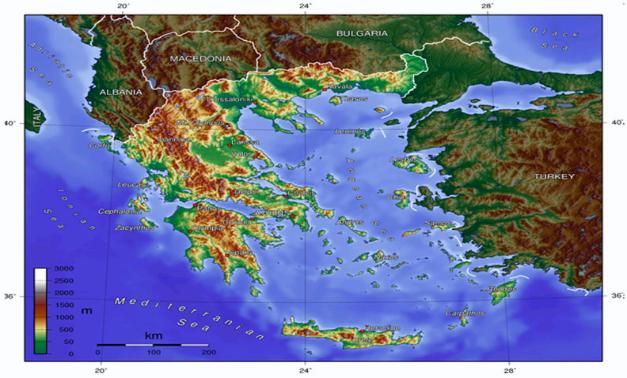
1 “the sea presses in upon the country with a thousand
arms”- Strabo (64 BCE-24 AD)
arms”- Strabo (64 BCE-24 AD)
2 Although the Greek alphabet appears to have
developed by the 9th century, “Greece was still an
essentially oral society until well into the classical
period" [479-323 BCE] (Hall, 2007, 59).
developed by the 9th century, “Greece was still an
essentially oral society until well into the classical
period" [479-323 BCE] (Hall, 2007, 59).
3 Greeks have always referred to their land as Hellas, and
the newly unified forces that invaded Persia and beyond
often referred to themselves as Hellenes.
the newly unified forces that invaded Persia and beyond
often referred to themselves as Hellenes.
4 As noted in the chapter 4, non-Indo-European areas were
generally slower in making the change from matrilineal to
patrilineal descent systems. In western Anatolia- Lycia,
Caria, and particularly Lydia- “matrilineal descent and
goddess worship continued”, into the later classical era,
although (widespread, literary) reports of ‘Amazon’ warriors
and such were surely mythological hyperbole (Stone, 1990,
45). It seems entirely plausible that “at the time of the Hittite
invasions many of the Goddess-worshiping peoples may
have fled…” from the more patriarchal Indo-Europeans (45);
congregating in western Anatolia for a perhaps more than a
millennium, as late as the 4th century BCE (47). Castleden
reminds us that in the 2nd millennium at least “in the
Anatolian province nearest to Crete, Lycia, children were
customarily named after their mothers, not their fathers… a
concept of matrilineal descent was available in the area…”
(1990, 175). Moreover, such indigenous traditions were
presumably even more secure from invading Indo-European
cultures (be they Hittite or Mycenaean) on an island such as
Crete, as none of the imperial powers of the upper 2nd
millennium had yet developed formidable navies.
generally slower in making the change from matrilineal to
patrilineal descent systems. In western Anatolia- Lycia,
Caria, and particularly Lydia- “matrilineal descent and
goddess worship continued”, into the later classical era,
although (widespread, literary) reports of ‘Amazon’ warriors
and such were surely mythological hyperbole (Stone, 1990,
45). It seems entirely plausible that “at the time of the Hittite
invasions many of the Goddess-worshiping peoples may
have fled…” from the more patriarchal Indo-Europeans (45);
congregating in western Anatolia for a perhaps more than a
millennium, as late as the 4th century BCE (47). Castleden
reminds us that in the 2nd millennium at least “in the
Anatolian province nearest to Crete, Lycia, children were
customarily named after their mothers, not their fathers… a
concept of matrilineal descent was available in the area…”
(1990, 175). Moreover, such indigenous traditions were
presumably even more secure from invading Indo-European
cultures (be they Hittite or Mycenaean) on an island such as
Crete, as none of the imperial powers of the upper 2nd
millennium had yet developed formidable navies.
5 According to ecological historian Oliver Rackman,
"erosion is an inherent property of the landscape and is not
necessarily due to human action" (1990, 93).
"erosion is an inherent property of the landscape and is not
necessarily due to human action" (1990, 93).
6 Although still a matter of some controversy, ancient
accounts of the Dorians’ origins in the mountains and
woodlands of the far north (Epirus and perhaps Macedonia)
are still prevalent, as is their descent southwards through the
mountains to the Peloponnese and Crete. Regardless of any
postulated relationship between Doric/West Greek and
ancient Macedonian dialects… within the complex “series
of mythological assimilations and syncretisms” associated
with the Dorians, “the assumption by Herodotus and Plato
that the Dorians did not receive their name until after
reaching the Peloponnese may not be so wide off the mark”
(Hall, 1997, 65). Hall also speculates more recently that at
least some portion of the original ‘Dorian’ invaders may well
have originated from Crete (2002, 84-89). Of course, these
two theories are not necessarily mutually exclusive, and
ancient migrant peoples have often left us little evidence of
their paths (see Sparta, below).
accounts of the Dorians’ origins in the mountains and
woodlands of the far north (Epirus and perhaps Macedonia)
are still prevalent, as is their descent southwards through the
mountains to the Peloponnese and Crete. Regardless of any
postulated relationship between Doric/West Greek and
ancient Macedonian dialects… within the complex “series
of mythological assimilations and syncretisms” associated
with the Dorians, “the assumption by Herodotus and Plato
that the Dorians did not receive their name until after
reaching the Peloponnese may not be so wide off the mark”
(Hall, 1997, 65). Hall also speculates more recently that at
least some portion of the original ‘Dorian’ invaders may well
have originated from Crete (2002, 84-89). Of course, these
two theories are not necessarily mutually exclusive, and
ancient migrant peoples have often left us little evidence of
their paths (see Sparta, below).
8 J.M. Hall, has consistently argued that the ‘ethnic groups’
of at least archaic Greece were not so much divided by
physical characteristics, religion, or perhaps even language
as they were distinguished by the more imaginary constructs
of literature, myth, and political culture (Hall, 1997; 2006).
of at least archaic Greece were not so much divided by
physical characteristics, religion, or perhaps even language
as they were distinguished by the more imaginary constructs
of literature, myth, and political culture (Hall, 1997; 2006).
9 Hall emphasizes that although the terms ethnos and polis
were not mutually exclusive, the former puts the stress on a
community of people, whereas the latter emphasizes place
(Vlassopoulos, 2007).
were not mutually exclusive, the former puts the stress on a
community of people, whereas the latter emphasizes place
(Vlassopoulos, 2007).
10 It is not certain that Homer was a single individual, as
opposed to a society of poets. It is widely agreed, however,
that the oral traditions accredited to Homer were first
written some time during the 8th century, and in reference
to prior centuries.
opposed to a society of poets. It is widely agreed, however,
that the oral traditions accredited to Homer were first
written some time during the 8th century, and in reference
to prior centuries.
11 This may be hyperbole, or at least over-generalization.
Hall (2006) counters that the “hoplite class” was not
recruited “from an agrarian middle class, but from a small
upper segment of the population: 'far from being an
expression of egalitarianism, the hoplite phalanx visibly
enshrined and perpetuated the status distinctions of
archaic Greek society' (170)” (Vlassopoulos, 2007).
12 Warfare in Archaic Greece (like most other places in
the world at the time) was mostly about “raiding and border
disputes” (Vlassopoulos, 2007), but could also sometimes
involve larger expansive motives- most often played out
simply in the creation of dependencies and extortion of
tributes.
Hall (2006) counters that the “hoplite class” was not
recruited “from an agrarian middle class, but from a small
upper segment of the population: 'far from being an
expression of egalitarianism, the hoplite phalanx visibly
enshrined and perpetuated the status distinctions of
archaic Greek society' (170)” (Vlassopoulos, 2007).
12 Warfare in Archaic Greece (like most other places in
the world at the time) was mostly about “raiding and border
disputes” (Vlassopoulos, 2007), but could also sometimes
involve larger expansive motives- most often played out
simply in the creation of dependencies and extortion of
tributes.
13 Part of Athenian archon Solon’s (639–559) seisachtheia
(‘relief of the burdens’) reforms, c.590, emancipated all
previously enslaved debtors, reinstated confiscated serf
property, and outlawed the use of personal freedom as
collateral in future debts. Athenian citizens would not be
slaves; and “after the prohibition of debt slavery, other
protections- against rape, abuse, corporal punishment, or
torture- emerged as fundamental to citizen status”
(Patterson, 2006, 155).
14 Newly "available infant foods could shorten the period
of intensive breast feeding, leading to shorter periods of
postpartum infeccundability and, thus, shorter intervals
between births" (Kipple & Ornelas, 2000, 1445).
15 the population of Greece as of 2006 was between 10
and 11 million.
(‘relief of the burdens’) reforms, c.590, emancipated all
previously enslaved debtors, reinstated confiscated serf
property, and outlawed the use of personal freedom as
collateral in future debts. Athenian citizens would not be
slaves; and “after the prohibition of debt slavery, other
protections- against rape, abuse, corporal punishment, or
torture- emerged as fundamental to citizen status”
(Patterson, 2006, 155).
14 Newly "available infant foods could shorten the period
of intensive breast feeding, leading to shorter periods of
postpartum infeccundability and, thus, shorter intervals
between births" (Kipple & Ornelas, 2000, 1445).
15 the population of Greece as of 2006 was between 10
and 11 million.
16 Aristotle insisted that an individual polis- “’'just like all
other things: animals, plants, inanimate objects'”- has an
inherent limit to its size…. “'The population must be easily
cognizable at a glance… It is necessary that the politai
[citizens] know one another’” for participation in political
decisions (Cohen, 11-12). Herodotus agreed that Athens was
too large for a polis, calling it “an ethnos (a “nation” or
“people”), a word normally used in antithesis to polis”
(Cohen, 3). Ethnos was also, however, “the ‘usual’ (Hansen
1991: 59) ancient Greek term for any identifiable group
larger than a polis: for Aristotle, ‘an (entity) self-sufficient as
to necessities but excessively large in numbers, such as an
ethnos, is not a polis’” (Cohen, 12).
other things: animals, plants, inanimate objects'”- has an
inherent limit to its size…. “'The population must be easily
cognizable at a glance… It is necessary that the politai
[citizens] know one another’” for participation in political
decisions (Cohen, 11-12). Herodotus agreed that Athens was
too large for a polis, calling it “an ethnos (a “nation” or
“people”), a word normally used in antithesis to polis”
(Cohen, 3). Ethnos was also, however, “the ‘usual’ (Hansen
1991: 59) ancient Greek term for any identifiable group
larger than a polis: for Aristotle, ‘an (entity) self-sufficient as
to necessities but excessively large in numbers, such as an
ethnos, is not a polis’” (Cohen, 12).
(wiki)
17 The word ‘democracy’ itself had not yet been invented
(Forrest, 37).
(Forrest, 37).
18 It is ironic that the ‘Ionian’ (or 'Ionian-Attic'; which
combines with Aeolic to form the East Greek) dialect
actually encircled much of the Aegean Sea; whereas West
Greek (including Doric) predominated along Greek lands
facing the Ionian Sea. Perhaps this anomaly can be
explained by the broad strokes of the ‘Dark Age’ migrations,
where it is generally acknowledged that the Mycenaean
elite and their followers fled eastwards towards the Aegean.
Once established there, the Mycenaean elite may have
been successful in altering local dialects. The resultant
‘Ionian’ dialects (very similar to Attican; less to to Aeolic)
may have been named for the faraway lands (to the west)
from which the Mycenaean ruling class had migrated or
originated. In any event, Robin Osborne has concluded
that “we are obliged to conclude that the Greeks of the
archaic period knew nothing about the [preceding] Dark
Age. Indeed one might say that for them ignorance was
bliss…. They could, and did, invent themselves” (1996, 37).
Dorian identity, however, "still possessed sufficient valency
in the late 3rd century for the people of Kytenion to invoke
it in seeking finanical aid from the city of Xanthos..." (Hall,
227).
19 In regards to the Macedonia, historians are not sure
whether Macedonians originally spoke a Greek dialect or a
more distinct language; although it is certain that they
belonged to the Koine (unified) Greek speaking community
during the Hellenist era.
20 Ethnos (singular) and ethne (plural) are largely
analogous to ‘people(s)’ (tribes) and ‘nation(s)’ (states).
Whereas the polis (city-state) is ironically often in between
the ethnos (people) and ethne (nation), in terms of size. For
example, “Aristotle recognized that most Greek ethne were
in effect collections of poleis… for Aristotle the distinction
between the two was quantitative… distinguished by their
large populations.” Ethne can encompass multi-ethnos
(groups), as well as mutli-poleis groups. Whereas Aristotle
argues that “the crucial difference between a polis and an
ethnos is that the latter was not a political society even
though… an ethnos could do most of the things that a
polis did.” Archaic and early Classical sources use ethnos
“to refer to almost any group [ital. added] of beings, human
or animal” with very little consistency. Furthermore,
“analysis is not aided by the Athenocentrism of much
discussion… [as] Athens came to be seen as normative
when it was not even normal” (Morgan, 2003, 8, 9).
combines with Aeolic to form the East Greek) dialect
actually encircled much of the Aegean Sea; whereas West
Greek (including Doric) predominated along Greek lands
facing the Ionian Sea. Perhaps this anomaly can be
explained by the broad strokes of the ‘Dark Age’ migrations,
where it is generally acknowledged that the Mycenaean
elite and their followers fled eastwards towards the Aegean.
Once established there, the Mycenaean elite may have
been successful in altering local dialects. The resultant
‘Ionian’ dialects (very similar to Attican; less to to Aeolic)
may have been named for the faraway lands (to the west)
from which the Mycenaean ruling class had migrated or
originated. In any event, Robin Osborne has concluded
that “we are obliged to conclude that the Greeks of the
archaic period knew nothing about the [preceding] Dark
Age. Indeed one might say that for them ignorance was
bliss…. They could, and did, invent themselves” (1996, 37).
Dorian identity, however, "still possessed sufficient valency
in the late 3rd century for the people of Kytenion to invoke
it in seeking finanical aid from the city of Xanthos..." (Hall,
227).
19 In regards to the Macedonia, historians are not sure
whether Macedonians originally spoke a Greek dialect or a
more distinct language; although it is certain that they
belonged to the Koine (unified) Greek speaking community
during the Hellenist era.
20 Ethnos (singular) and ethne (plural) are largely
analogous to ‘people(s)’ (tribes) and ‘nation(s)’ (states).
Whereas the polis (city-state) is ironically often in between
the ethnos (people) and ethne (nation), in terms of size. For
example, “Aristotle recognized that most Greek ethne were
in effect collections of poleis… for Aristotle the distinction
between the two was quantitative… distinguished by their
large populations.” Ethne can encompass multi-ethnos
(groups), as well as mutli-poleis groups. Whereas Aristotle
argues that “the crucial difference between a polis and an
ethnos is that the latter was not a political society even
though… an ethnos could do most of the things that a
polis did.” Archaic and early Classical sources use ethnos
“to refer to almost any group [ital. added] of beings, human
or animal” with very little consistency. Furthermore,
“analysis is not aided by the Athenocentrism of much
discussion… [as] Athens came to be seen as normative
when it was not even normal” (Morgan, 2003, 8, 9).
Kinship ? Territorial
Closed ? Open
'primordial' ? conscious choice
ethnic boundaries ? political boundaries
ethnic nation ? territorial nation
common ancestry myths
Closed ? Open
'primordial' ? conscious choice
ethnic boundaries ? political boundaries
ethnic nation ? territorial nation
common ancestry myths
22 Trade-rich Corinth’s stable oligarchy was more “broadly
moderate” than others… “however decisions were taken, they
were reached with a careful eye to that the citizens in
general could be persuaded, rather than forced to accept”
(Salmon, 1984, 236).
23 Jeffrey, L.H. (2000). "Greece Before the Persian
Invasion" In Cambridge Ancient History IV: Persian, Greece,
and the Western Mediterranean c. 525-479 B.C., pp. 347-66
(p. 366).
24 Ancient Macedonians “were considered by the classical
Greeks as ‘non-Greek barbarians’ that could not participate
in the Greek Olympic Games.” Herodotus (484–c.425 BCE)
considered them “Dorians,” unadmitted to the Greek
community Greek (Arnaiz-Villena, et al, 2001, 118-19).
“Although Macedonian kings in the classical period were not
absolute monarchs, they enjoyed considerably more
autocratic powers than did Homeric kings, or indeed the
kings of neighboring Molossia” (Brock & Hodkinson, 2000,
25). In the 4th century BCE, however, “battle-lines were
drawn up on the basis of whether or not the Macedonians
were to be viewed as Greek. A definition on the basis of
education and custom implied greater flexibility in
categorization; and the Athenians had begun to lay claim to
being the metropolis of more than the Ionians (a near
obsolete-category). And by Hellenic times, “peoples without
hesitation incorporated Macedonians within their category
[of] ‘Greek’" (Miller, 2002, 2-5).
moderate” than others… “however decisions were taken, they
were reached with a careful eye to that the citizens in
general could be persuaded, rather than forced to accept”
(Salmon, 1984, 236).
23 Jeffrey, L.H. (2000). "Greece Before the Persian
Invasion" In Cambridge Ancient History IV: Persian, Greece,
and the Western Mediterranean c. 525-479 B.C., pp. 347-66
(p. 366).
24 Ancient Macedonians “were considered by the classical
Greeks as ‘non-Greek barbarians’ that could not participate
in the Greek Olympic Games.” Herodotus (484–c.425 BCE)
considered them “Dorians,” unadmitted to the Greek
community Greek (Arnaiz-Villena, et al, 2001, 118-19).
“Although Macedonian kings in the classical period were not
absolute monarchs, they enjoyed considerably more
autocratic powers than did Homeric kings, or indeed the
kings of neighboring Molossia” (Brock & Hodkinson, 2000,
25). In the 4th century BCE, however, “battle-lines were
drawn up on the basis of whether or not the Macedonians
were to be viewed as Greek. A definition on the basis of
education and custom implied greater flexibility in
categorization; and the Athenians had begun to lay claim to
being the metropolis of more than the Ionians (a near
obsolete-category). And by Hellenic times, “peoples without
hesitation incorporated Macedonians within their category
[of] ‘Greek’" (Miller, 2002, 2-5).
21 Although the terms oligarchy and democracy were not
formulated until the mid-5th century, we generally associate
the former with ancient Ethnic identity, and the latter with a
more open and Territorial-based identity. Absolutist
kingship (hereditary monarchy) approximates Charismatic
Authority (absolutism).
formulated until the mid-5th century, we generally associate
the former with ancient Ethnic identity, and the latter with a
more open and Territorial-based identity. Absolutist
kingship (hereditary monarchy) approximates Charismatic
Authority (absolutism).
25 A notable exception to this generalization is Andrey
Eremin. He found that kinship was both fundamentally
important in Spartan society- and that it could often prove
fictive (Eremin, 2002, 267-83).
Eremin. He found that kinship was both fundamentally
important in Spartan society- and that it could often prove
fictive (Eremin, 2002, 267-83).
26 In addition to outlawing debt slavery, Solon divided the
Athens demos into 4 classes, from their ability to pay tax or
provide military service. The poorest/majority class was
granted the right to vote in the popular assembly (this was a
first in Greece); but political offices had to be held by
members of the upper class.
Athens demos into 4 classes, from their ability to pay tax or
provide military service. The poorest/majority class was
granted the right to vote in the popular assembly (this was a
first in Greece); but political offices had to be held by
members of the upper class.
27 The Helots (who could at times have been as much as
80-90 percent of the population of Sparta) were something
more akin to state-owned serfs than individual property.
28 In addition to enjoying property and legal rights, citizens
were exempt from the poll tax. Metics convicted of evading
it, however, were sold into slavery (Whitehead, 1991, 149).
Such was the society of those who ‘invented’ democracy.
80-90 percent of the population of Sparta) were something
more akin to state-owned serfs than individual property.
28 In addition to enjoying property and legal rights, citizens
were exempt from the poll tax. Metics convicted of evading
it, however, were sold into slavery (Whitehead, 1991, 149).
Such was the society of those who ‘invented’ democracy.
29 As John Davies put it, “Classical Athens defined the
membership of its citizen body… rigorously in terms of
descent.” Furthermore, although the “descent group criterion
of citizenship was under pressure and attack from many
sides,” it did not change (Davies, 1977, 121). Likewise Philip
Brook Manville concluded his study of Athenian citizenship
by asserting that “the polis took various measures to curb the
assimilation of outsiders into the civic body, and to
strengthen distinctions between citizens and non-citizens”
(1990, 216-17).
membership of its citizen body… rigorously in terms of
descent.” Furthermore, although the “descent group criterion
of citizenship was under pressure and attack from many
sides,” it did not change (Davies, 1977, 121). Likewise Philip
Brook Manville concluded his study of Athenian citizenship
by asserting that “the polis took various measures to curb the
assimilation of outsiders into the civic body, and to
strengthen distinctions between citizens and non-citizens”
(1990, 216-17).
30 Hall concludes that the “starting point for praising the
unique character of Athenians is their autochthony”
(indigenous territoriality)- an ambiguous term in relation to
kin/ethnic and civic notions of nationality- but “as we have
seen…[it is] a doctrine that relies more heavily on identity of
place than identity of ‘race’” (2002, 216).
unique character of Athenians is their autochthony”
(indigenous territoriality)- an ambiguous term in relation to
kin/ethnic and civic notions of nationality- but “as we have
seen…[it is] a doctrine that relies more heavily on identity of
place than identity of ‘race’” (2002, 216).
7 Indo-European languages- along with the Afro-Asiatic
family (Near East and North Africa)- are thought to have
pioneered the linguo-cultural tradition of gendered
grammar. 'Indigenous', or pre-I-E expansion, languages
(particularly in western Anatolia) are often presumed to
have lacked (natural) gendered grammar, as indeed did
the vast majority of the world's cultures and peoples at the
time. For an introduction to language's affect on culture
and gendered grammar, see this short paper.
family (Near East and North Africa)- are thought to have
pioneered the linguo-cultural tradition of gendered
grammar. 'Indigenous', or pre-I-E expansion, languages
(particularly in western Anatolia) are often presumed to
have lacked (natural) gendered grammar, as indeed did
the vast majority of the world's cultures and peoples at the
time. For an introduction to language's affect on culture
and gendered grammar, see this short paper.
